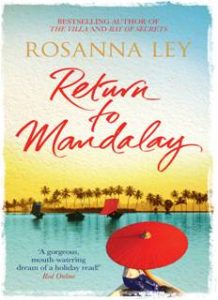Summer Reading 2024
Here are some of my favourites…
The Dance Teacher in Paris by Suzanne Fortin *** +
I very much enjoyed this dual-timeline story set in contemporary and early 1940s Paris at the start of the German occupation.
In the contemporary timeline, Fleur is visiting Paris from the UK, accompanying her grandmother on what has become an annual pilgrimage for Lydia, through which she wants to remember those who lost their lives in the city. This year, she has decided the time has come to tell her granddaughter the full story, but even she is shocked when at her old school where she used to dance the ballet, she finds an old ballet shoe belonging to someone she believed long gone. As they try to solve the mystery, they meet antiques dealer Didier, to whom Fleur is immediately attracted. But can he be as trustworthy as he appears, and is Fleur ready to move on from the loss she suffered when her beloved mother died and find the courage to love again?
Interwoven, is Lydia and Adele’s story narrated by Adele, the dance teacher of Paris. It was Adele who tried to save the Jewish children at her school. Her love story and her determination to do what she can to resist the occupation and save people’s lives lies at the heart of this book and was the driving force of the story for me. This is a compelling, sad and poignant narrative, well-told. Highly recommended.
The Hike by Lucy Clarke ***
Four old school friends re-unite to go on a hiking holiday in Norway. This could be (and is) a chance to re-assess their life journeys and make big decisions about the way forward. As one might expect, they all have problems. Liz, organised and practical, is on a trial separation from Patrick, husband and love of her life. Helena, still grieving for the loss of her mother and determinedly single, might or might not be pregnant. Maggie hasn’t fulfilled her own hopes and dreams – she has a wonderful daughter but also a problematic ex-husband and she is no longer as creative as she would like. And Joni is a burnt-out coke-addicted rock star who has lost her way. Hmm…
In fact they all lose their way on the Norwegian slopes before their problems are finally resolved.
The Golden Hour by Jacqui Bloese ****+
Set in Victorian Brighton, I was immediately drawn in to the world of the three main female characters in this novel. Ellen works and lives with her twin brother; they run a photography business which includes the salacious ‘golden hour,’ a time at the end of the afternoon when they photograph girls in more risqué poses than the usual society photographs, which can be sold for a profit in London or France. Ellen does have qualms – but the way she sees it, they are enabling girls to make a much-needed income without them having to resort to prostitution.
The second woman, Lily, is one of these women. She works in the laundry and is at constant risk of assault from her uncle. She needs money in order to get away from home, but when she does get away from home, she finds herself with even more problems than before.
The third woman is Clem, a well-to-do American, who is married to a man who is rather too fond of pornography and other women for Clem’s liking. And anyway, Clem has other interests to pursue… ones which her husband will definitely disapprove of.
A friendship builds between Ellen and Clem and when Lily comes to work in Clem’s house as a maid and Ellen becomes Clem’s paid companion, tensions mount until eventually their secret is out.
Beautifully written, sensuous in detail, I loved ‘The Golden Hour’ which kept me hooked and entertained from start to finish.
None of This is True by Lisa Jewell ***+
Lisa Jewell is one of my favourite authors and as usual, this novel sizzles with tension from the off. Very dark tension…
Josie Fair goes to a restaurant on her 45h birthday with her husband Walter, and there she meets podcaster Alix Summers, also out on a birthday celebration of her own. It turns out that they were born on the same day in the same hospital; they are ‘birthday twins’.
Josie, trapped in what she sees as a boring and unsatisfied life with her husband and her daughter Erin who has special needs, is fascinated by Alix, but it is a fascination that quickly turns into an obsession. She begins to want Alix’s life.
Alix is attractive and appears to be happily married with two healthy children. Having listened to some of her podcasts, Josie approaches Alix and asks her – would she be interested in interviewing Josie as an example of a woman who has had a difficult life and who is now determined to change it?
Alix is unsure at first, but as she begins talking to Josie, she starts uncovering a shocking darkness in the other woman’s life. She feels that she must continue – even as the power shifts between them and Josie starts encroaching on Alix’s personal life and that of her family.
Gradually, the truth is revealed – but whose truth is it? And is there another truth deeply hidden that may stay hidden forever? Chilling and compelling.
The Love of my Life by Rosie Walsh ****+ and my book of the season 😊
I was expecting a feel-good romance when I started this book, but actually it is so much more.
Emma, a marine biologist, loves her husband Leo, an obituary writer, very much. They have a young daughter Ruby; the family are blissfully happy, apart from the times when Emma has one of her ‘turns’ when she needs to take off and be alone by the sea somewhere, searching for rare marine creatures.
But their life is thrown into chaos and shock when Leo discovers that almost everything Emma has ever told him about herself, is a lie.
He cannot believe it at first, but he digs deeper, determined to find out the truth, and more importantly, why Emma lied to him. Where does she really go to when she needs to escape? And what can be so awful that made it impossible for her to tell him who she really is and what she has done?
When the very darkest moments of Emma’s past life finally emerge, she must somehow prove to Leo that she really is the woman he always thought she was. But first, she must tell him about the love of her other life… Hugely enjoyable, thought-provoking, emotional and absorbing. Highly recommended.
Lessons In Chemistry by Bonnie Garmus ***+
I’m late to the party on this one, and was really looking forward to seeing what the fuss is about. Easy to see – the book’s premis of a beautiful and clever female scientist trying to teach women how they can use chemistry to change their lives in the 1950s and 60s is both original and compelling. It’s a revenge comedy and the premis sets the scene for some sharp satirical humour with feminism at the root; a string of one-liners had me laughing out loud at times.
All the characters are caricatures and the book is heavy on authorial comment with constant switches of viewpoint, including that of the dog, six-thirty. But it works. The book begins with Elizabeth (the scientist) dropping bitter, pithy, life-lesson notes in the lunch box of her four-year old daughter Mad – herself a precocious genius who has to pretend to everyone at school that she is nothing of the kind. Elizabeth is depressed because she has lost Mad’s father, Calvin Evans, the love of her life, in a freak accident and she has been forced to leave her job as a research chemist and instead host a cooking programme entitled ‘Supper at Six’ which she has attempted to make more like a chemistry lesson intended to change women’s lives.
Enter a host of other similarly caricatured characters and a mystery concerning the parentage of Calvin. Will the TV show survive? Will Elizabeth ever recover? Who was Calvin anyway? This is the narrative tension that drives the book forward. We do want to know, but I feel that with this book it is the – sometimes heavy-handed – feminist humour that has made it such a successful debut. Highly recommended (as long as you’re not either religious or a female scientist).
Finca Writing in March and June 2024
 Two writing groups came to the Finca in 2024, and we explored a range of subjects including life-writing and emotion – in fiction and non-fiction, internal balance and structure in fiction, writing a synopsis and a pitch, and collaborating in small groups to plot and write a short story. We also had a book-club session.
Two writing groups came to the Finca in 2024, and we explored a range of subjects including life-writing and emotion – in fiction and non-fiction, internal balance and structure in fiction, writing a synopsis and a pitch, and collaborating in small groups to plot and write a short story. We also had a book-club session.
The writers also continued with their own works in progress and/or hopefully were inspired by some of our morning writing exercises into some pieces of new writing.
I like to stress that this is a writing holiday with plenty of me-time in a gorgeous setting (see https://hotelfinca.com/) and how participants choose to spend that time is completely down to them. Some people spent a lot of time writing, others went out walking (in March) and others caught up with some much-needed R&R around the pool (in June).
As always, the food and ambience were superb and everyone seemed to have a good and productive time.
There are two writing holidays booked in for March and June 2025. The March one is full at the moment, but I will be opening the June writing holiday up for bookings in August. E-mail me for details if you are interested…
writing holiday up for bookings in August. E-mail me for details if you are interested…
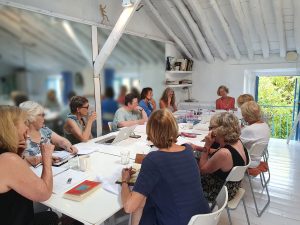
My Spring Fiction 2024
The Lake House by Kate Morton ***+
Who doesn’t love climbing into a Kate Morton novel? This complex family drama wraps itself around you like a cosy cashmere blanket, enveloping you in deep emotions and an intriguing mystery… (and as I’m writing this, it may be spring but I still need a cashmere blanket…)
Sadie, a detective taking time out for getting too personally involved in a case, discovers a derelict old house and garden in Cornwall, while out for a run one day. The house is Loeannath, the Lake House, and it is the centre of a seventy-year-old mystery surrounding the disappearance of a baby, Theo Edevane. Since Sadie has time on her hands, she decides to investigate further…
In London, Alice Edevane, the famous crime writer and sister of Theo, is shocked to receive a letter from Sadie, asking about the family tragedy. It brings back memories and sensations that she has tried all her life to put behind her. She ignores the letter at first, but Sadie is determined. It becomes clear that there are many family secrets to uncover before the mystery can be solved and the truth revealed.
Who knew more about Theo’s disappearance than they told the police at the time? Flashback chapters from other characters (including the deceased) provide more information, but no body was ever discovered and so Theo might be (still) alive or dead.
There are plenty of twists and turns in this story and I particularly warmed to Alice, whose viewpoint is both insightful and amusing. The author takes the opportunity of having a lot of fun by delving into the writer’s viewpoint. She is also very good at the slow reveal and build up of tension. A multi-layered and enjoyable read.
The Dubrovnik Book Club by Eva Glynn ***+
The Dubrovnik Book Club is a warm and compelling story filled with sensory detail and emotion.
Claire is just starting a new job as manager at the Welcoming Book Shop in Dubrovnik, but this requires huge bravery on her part as she recently suffered from Long Covid and is terrified of getting it again. In the bookshop, she meets Luna, her new colleague – who is struggling to admit her own sexuality to the world.
Claire and Luna start up a Bookclub and through this we meet a cast of other fascinating characters, some of whom also have a difficult journey to go on. The story is very strong on these character journeys, which are handled with sensitivity and perception.
When the Bookshop is threatened, the characters all work together to try to save it. In the meantime, they are all getting to know one another rather better – the relationships between them are well-drawn and convincing.
The setting of Dubrovnik is impeccably researched with great precision of detail (especially on food – yum yum) and the author’s love of the city shines through. A very enjoyable read and highly recommended.
The Keeper Of Stories by Sally Page **** and my Book of the Season
Janice is a cleaner – but also a collector of stories and a storyteller herself. She likes to find evidence of the extraordinary in ordinary people and this gives her some hope of happier endings. Most of her stories come from people she cleans for, some from conversations she overhears on the bus – where she also comes across a very nice bus-driver who happens to look like a geography teacher. (A nice touch, I thought).
Janice is married to the awful Mike and it soon emerges that this is only part of her story. But Janice does not want to tell her story – she feels too guilty – and it takes the support of friends and family plus a set of extraordinary circumstances to persuade her to do so. But if we cannot acknowledge our own stories, how can we hope to move on?
This is a brilliant story about loss, friendship and support. It’s so well-written with plenty of humour, and I loved it.
The New Wife JP Delaney ***+
As always, JPD launches us into the story from the off – direct and straight into the voice of our narrator, Finn. Finn and his sister Jess have just learnt about the death of their father (the Old Bastard) which is no great loss to them as he has never been much of a father to them in the first place. The difficulty is though, that their legacy is the rather glorious Finca Sequia in Mallorca, currently occupied by their father’s third wife Ruensa and her daughter Roze. So Finn goes over to check them out (and maybe throw them out) and from therein becomes embroiled.
To avoid spoilers, let’s just say that this is another twisty tale with plenty going on and a surprising jolt in almost every chapter. As usual, I was hooked from the start, and found it hard to put the book down. Five stars for page-turnability, but I haven’t yet decided how I feel about the ending. Perhaps you should read it and decide for yourself?
Secret Lives by Diane Chamberlain ***+
Eden Rily, movie star, needs time out from ‘wearing a mask’ (as she describes the business of acting) and she decides to write the screenplay for a film about her late mother, successful children’s author Kate Swift. She knows already that her mother, who died when Eden was a young girl, was solitary, possibly agoraphobic and was known as an eccentric. But what else might she discover?
Eden goes to stay with her uncle Kyle and her aunt Lou in her mother’s old home town, in order to find out more. But it isn’t easy for Eden being with them. She had a difficult childhood which included a spell in an orphanage and she feels guilty around Lou – who is wheelchair bound – because of an accident which she feels is her fault.
The story takes on an added thread when we hear Kate Swift’s voice through the journals which she kept at the time, and which Eden is now reading. There are a lot more dark secrets to her mother’s life than Eden had realised, some of which have a huge impact on Eden’s life and relationships now. And then Eden meets Ben Alexander, an archaeologist friend of Kyle’s who has more dark secrets of his own.
Will Eden be able to continue with her plan to write the screen play of her mother’s life – or will it be too emotional and intense for her to contemplate? And can she find her own sense of self by discovering the truth about her mother’s past? I very much enjoyed this novel and highly recommend.
The Silence of The Girls by Pat Barker ****
In this re-telling of ‘The Iliad’, the main narrative voice is that of Briseis, taken prisoner when her city falls to the Greeks and given to Achilles as a ‘prize of war’. All the old narratives of the Trojan War concern themselves with the male characters – the women have traditionally never been given a voice, just as in this story, the women are given no choice; they are possessions to be dealt with and claimed accordingly.
Briseis was Queen of the Kingdom ruled by her husband, but she was forced to watch her husband and family butchered by the man who is now to become her owner, her lover. The Queen has become a slave. She has no choice but to give herself to Achilles, but she does this coldly and reluctantly, not allowing herself to show any emotion. Their relationship becomes complex however; even Briseis cannot fully understand it, and when she has the opportunity to escape, she decides not to take it.
Barker sticks closely to the Iliad story and although Briseis is a feminist, she is only a feminist within the boundaries of the world and time she lives in and so she accepts her fate. But Barker does give her character a strong, modern and feminist voice in both dialogue and thought and this makes the story more accessible and for me, more interesting too.
The characters are believable. Most of the men are unpleasant, though some are kinder than others. The god-like warrior Achilles is fascinating – his pride is wounded and he makes some bad mistakes, but for me Barker made him capable of deep love – especially for Patroclus, but also for Briseis and the mother goddess who left him. I also enjoyed dipping into the world of the women with their laundry and linens, their herbs and natural medicines, the honey, the weaving and the complex laying out of the dead. Most of all, I loved the fact that Barker has given these women a voice once silenced by history.
Themes and Schemes
 We all have things that we care passionately about, and in some cases want to write about. But where do our themes come from? I found myself wondering about this as I finished my latest edits.
We all have things that we care passionately about, and in some cases want to write about. But where do our themes come from? I found myself wondering about this as I finished my latest edits.
In my next novel, The Italian Flame (to be published March 2025) I found myself once again tackling the theme of adoption. This is the second time I have written about adoption, and yet I have no personal experience of it – I just find different kinds of families interesting.
The first time I wrote about it was in the novel Bay of Secrets when I was drawn in to the subject partly by my horror at the travesties that occurred during the Spanish Civil War and beyond, in terms of adoption practices, which have now been well-documented.
This time though it was rather different. I was watching the TV programme ‘Long Lost Family’ and having a good cry, like you do – because it’s rather wonderful when birth family members meet each other for the first time. Then I started thinking about all the stories that never get aired. What might happen, for example, if someone who had been adopted simply did not want to be found?
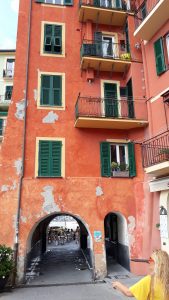
A House in Camogli
For the book, I did a lot of reading of personal stories of women who’d had their babies adopted, often against their wishes and because circumstances gave them very little choice. Often, this sad and traumatic parting affected them for the rest of their lives.
As a woman growing up in the later 1960s and 70s I and my peers had a lot more say when it came to birth control and choices. But in 1965, many of these choices were not available to girls like my character Marilyn, as they had not been for many girls and women in the years preceding. There was also a great deal more disapproval and shame. This must have led to so many heart-breaking situations and decisions, also impacting those who had been adopted. Adoptive parents are usually amazing and do a fantastic job, but many adoptees also feel the need to understand why they were given away in the first place. They often want to find out more about their birth families.
This led me into thinking about sisters… I don’t have a sister, though I always wished I did (I do love having a brother though, Alan!) But I do have two daughters and I know that the relationship between sisters is a very special one. These two strands then, came together to create the themes and schemes for The Italian Flame.
Top Winter Titles
I should have posted this a couple of months ago! However – all these winter warmers are among the best books I’ve read in the past few years – every one is a winner.
Child of the Ruins by Kate Furnival ****
I really enjoyed this sweeping and dramatic story. The setting is post-war Berlin and Kate Furnival captures the atmosphere perfectly – the sense of a divided city in ruins, the place, the pain, the suffering and the poverty.
In this world, Anna is searching for a long-lost child – Felix – and we feel her desperation as she imagines she sees his features, his colouring, his gestures, in every child she encounters. She is also feeling betrayed by her lover, a Russian soldier who seems to have disappeared from the face of the earth. Meanwhile, Anna tries to find work, procure food, and look after her mother – who gave Felix away when Anna was sick with fever.
When Anna first meets Ingrid, she is not sure whether she is friend and foe. But in this world, it seems that Ingrid can be both. Everyone is trying to survive and everyone does what they have to do for survival and for love. Anna and Ingrid are both strong and complex characters and the story is told mainly from their perspectives.
It is a harsh world. But there are also a few beautiful and perfect moments, and more than one intense love story. Can Anna and Timur find their way back to one another against all the odds? Can Ingrid and Otto find a way through? And can Anna ever forgive her mother for what she has done? This is an emotionally powerful and compelling story and I was immersed from beginning to end. Highly recommended.
End of Story by Louise Swanson ***
This is a cleverly constructed and well-written book with an ingenious twist at the end – but no spoilers here…
Fern Dolstoy (now Dalrymple) is a best-selling author living in a dystopian world where all fiction books have been banned and children are no longer allowed to listen to bedtime stories. Her only social interactions are with neighbour Laura and ‘Fine-Fayre’ the tea-man. Her dearest friends, two other authors, have disappeared, her husband Cal is dead and Fern works as a hospital cleaner. Periodically, she is monitored by ‘the tall man and the short man’ who are there to ensure she isn’t writing.
But Fern is writing – a diary of her days. One day, she receives a message and is introduced to ‘Bedtime Stories,’ a group of rebels who are taking calls from children and reading them stories. Fern joins the group and befriends Hunter, an eight-year-old boy who wants to be read to. But the group is in danger, Fern is scared her notebook will be discovered and she may have her fingers cut off or be removed to a ‘re-education centre’. Things are happening in this world which are scarily similar to things she wrote of in her best-selling ‘Technological Amazingness’.
The viewpoint is Fern’s throughout and as readers, we feel her sadness and pain. This dystopian world feels believable. But if it is – how can Fern Dolstoy come to terms with it and survive?
Mad Honey by Jodi Picoult and Jennifer Finney Boylan ****
This is a great collaboration between two talented writers.
Olivia is a bee-keeper who lives with her son Asher in Adams. She left her husband Braden because of his escalating violence towards her and because of her fear that Asher would learn, inherit or suffer from similar behaviour.
Lily is a student in the same year as Asher, also living with a single mother, who has experienced significant trauma during her childhood and young adult life. Asher and Lily fall madly in love, but the secrets they keep make their relationship a volatile affair rather than a trusting one.
This book tackles thought-provoking and controversial issues of our time with intelligence and sensitivity. It is told from the viewpoints of Lily and Olivia and through them we learn a lot. Lily is a fountain of trivia and general knowledge and Olivia is wise and an expert on bee behaviour, a fascinating thread cleverly woven through the novel.
Can there be any happy ending? There are plenty of shocks and twists along the way in this compelling and absorbing story. Very highly recommended.
Bad Men by Julie Mae Cohen ****
Saffy became a killer at a young age – she murdered her step-father in order to save her beloved sister Susie from the abuse that she herself was forced to suffer. It is an abuse which has understandably made her dislike ‘bad men’ – those who cheat on or abuse their partners – and so she continues her hobby of killing them in order to help save other innocent women too.
Saffy is rich, independent and in control… at least, until she meets crime journalist Jon and becomes wildly attracted to him. Attracted enough to kill in order to capture his attention? Perhaps not. But certainly attracted enough to stage a meeting…
But will he ever feel the same towards her? When Jon becomes embroiled in a crime drama of his own, Saffy may have to show her cards – or is she clever enough to avoid this too?
I loved the character of Saffy and the book is written with Julie Cohen’s usual wit, humour and perception. It’s a mix of crime thriller, comic romance and yet it’s thought-provoking too. Pure joy.
The Close by Jane Casey ***
This is the first Jane Casey book that I have read and it did not disappoint. The book is the latest in the series featuring DC Maeve Kerrigan and DI Josh Derwent and they are suitably classy and interesting detectives who (predictably?) have the hots for one another as well as being close friends.
The latest case involves a surveillance team of two (who else?) posing as a couple dog-sitting in a house in the seemingly innocent Jellicoe Close where nothing is as innocent as it seems and pretty much everyone is under suspicion for something. Soon, they are embroiled, not only in surveillance but also in the increasing intensity of their personal relationship, plus other cases of stalking, assault and murder, no less.
It all hums along satisfactorily with plenty of clues, red herrings, sexual tension and suspense with a high page-turnability factor… until the final twist and denouement. Hugely enjoyable.
The Last House on the Street by Diane Chamberlain ***
This story has two timelines and two narrators.
In 1965, Ellie tells the story of when she became involved with SCOPE, an organisation aiming to make it easier for people of colour to vote – in what should be a basic American right. Ellie is a rich, white girl of twenty, living in North Carolina and no one in her home town understands why she is doing this – most of the white townsfolk are more than happy for their current lifestyle and those of the black people they live alongside, to remain exactly as it is. Ellie however, is fired up to pursue Civil Rights and continues her fight, even while alienating all of her family and friends in the process. But when she is seen with Win, a young black man who also works in the SCOPE group, their disapproval turns to something much nastier, something which will affect everyone in the town, even forty-five years later.
In 2010, Kayla, a widow, is moving to Shadow Ridge near Ellie’s old home with her three year-old daughter Ranie. But she is half-scared of her brand new beautifully architect-designed home and the woods that surround it. She hears that something bad once happened here and her husband died here too. Is someone trying to scare her away and if so, what should she do about it?
Ellie moves back temporarily in 2010 to take care of her mother and brother and the two women meet and discover their shared history. But can they also discover the truth surrounding the forty-five year-old mystery that so changed Ellie’s life?
This is a dark and thought-provoking story, told with Chamberlain’s usual skill and sensitivity. Highly recommended.
Autumn Leaves
There are some real crackers in my selection this autumn. Settle down and enjoy…
I’m Sorry You Feel That Way by Rebecca Wait ****
Sister, mothers, daughters… this novel plunges the reader into the world of dysfunctional families with wisdom, humour and poignancy.
Growing up isn’t easy for Alice and Hanna. Their parents divorce and their mother is needy, confrontational, bad at communicating, no good at apologising (hence the title) and obsessed with her own childhood experience of being both ‘unloved and unlovely’. The two sisters try to cope, each in their own way, but trouble and trauma is never far from home and both have to make an emotional journey in order to repair the damage to themselves and their relationship.
Rebecca Wait is fair to their mother Celia though. Through flashback chapters, we learn about her childhood experiences, and knowledge can lead to understanding…
Men feature too. But they take the shape of Michael their disapproving elder brother who has plenty of his own problems to face and their absent father, who is mostly hopeless.
Alice and Hanna though, are both warm and engaging characters and the dialogue in the book – not to mention the set pieces – is hilarious. Highly recommended.
In Little Stars by Linda Green ***
This is a topical novel, based on real-life events, as Linda Green states in her acknowledgements, at least as a starting point for the fiction.
The story features two families: one predominantly Moslem, although the mother, Sylvie is of French origin. Her husband Bilal is a successful consultant and traditionalist – he wants to bring up their teenagers Rachid and Amina in the faith.
The second family are working-class Northerners. The father Neil has been brought up by a (carelessly racist) father and Neil’s wife Donna struggles with many of his views, especially when their son Sam appears to be adopting similar principles. Their teenage daughter Jodie, however, takes the opposite stance. She is fierce in her anti-Brexit opinions and unshaking belief in equality.
When Rachid and Jodie meet on the train to college, they are immediately attracted to one another and soon start a relationship and fall in love. But how can they tell their families? And what will they do when circumstances spin out of their control?
The narrative is written from the perspectives of the two mothers Sylvie and Donna with text messages between Rachid and Jodie and sections in their viewpoints too. It is a shocking and powerful story. Linda Green does not hold back and in consequence this is an authentic and thought-provoking read.
Strange Sally Diamond by Liz Nugent ****
When Sally’s beloved father died, she did what he told her to do and put him out with the bins – to be incinerated. She doesn’t understand why that’s so odd and that’s our first glimpse into the strange and sheltered life of Sally Diamond. Her father Tom (a psychiatrist) and mother Jean adopted Sally with full knowledge of her childhood trauma. But although they loved her, Tom was also interested in his daughter as a case study and he firmly believed that allowing her to be isolated was the best way forward.
But now, as the story begins, Sally becomes the centre of attention from the media, the police and a sinister voice from a past she has no memory of. Her father’s notes enable her to discover the horrors of her childhood, but she must also undergo therapy to enable her to find independence, make friends and learn to control her anger. When a stranger appears in her life (a stranger who has his own narrative voice in this novel) Sally has to decide whether or not to trust him, whether she can let him in.
Sally’s perspective is believable and interesting and I enjoyed the questions thrown up by this novel. Can someone truly escape from a trauma of their childhood or will they be scarred and influenced for ever?
I found it dark, heart-breaking and chillingly compelling…
The Flames by Sophie Haydock ****
Vally (his long-term lover and model), Gertrude (his sister), Edith (his wife) and Adele (his sister-in-law) are the four women who surround the Austrian artist Egon Schiele during his short lifetime.
They all loved him and they all modelled for him and the author has taken the few facts known about their lives and crafted them into a highly readable fictional account of Egon and his ‘flames’.
The story is split into sections, taking the viewpoints of each woman in turn, along with their portrait, interspersed with the perspectives of Adele (as an old woman) and Eva (who meets her when she knocks her over with her bicycle). The story concludes with the view of the artist himself and is also informed by his remarkable paintings.
I became highly involved with each perspective one by one. Each woman is a fascinating individual, the character deftly drawn, and each is given a voice which is both authentic and highly interesting. Events may have taken a different course in reality – who knows? – but the author bases her story on certain intriguing pieces of evidence that cannot be ignored. The greatest evidence though, is in the faces and poses of the women themselves. A gorgeous novel. I loved it.
Foster by Claire Keegan ***
In rural Ireland, a young girl is taken by her father to stay with some unknown relatives. Her mother is about to have another baby and there are too many children in the family to manage. At first, the girl is anxious, but during that summer with the Kinsellas, she grows up; she blooms.
Keegan writes about the landscape, about loss and belonging and character emotions in subtle and spare prose that cuts with precision to the heart of things. The story is short and has a simple structure, but the layering of characters, dialogue and actions is highly complex. Keegan plunges us into the perspective of the young protagonist, and as readers, we learn as she does. There are moments of tension, of foreshadowing and of pure poignancy. Much to be admired.
Tell me How This Ends by Jo Leevers ****
I loved this story about grief and loss that turned into a bit of a murder mystery.
The eccentric and lonely Henrietta gets a new job at the Grief Centre – her brief: to interview the terminally ill and create a Life Story for them and their relatives. There is a strict protocol to follow, but when Henrietta starts talking to Annie Doyle, it becomes impossible to stick to the script. Annie – who will not survive past Christmas – lost her sister in a drowning accident many years ago when Kath was only eighteen and she also lost her husband Terry to a motorway accident three years ago.
But there is a mystery behind the drowning which intrigues Henrietta and she starts to investigate further. To her surprise, she finds herself wanting to confide her own story to Annie and as she delves deeper, Annie becomes a friend.
There is a wonderful sense of character journey in this novel. The characters of Annie and Henrietta – who take alternate viewpoints for most of the story – are interesting and appealing, but despite lovely touches of humour, there is a huge sadness and a sense of a life wasted. However, this story about loss and grief is also about putting the past to rest and even about second chances, so there is also a reassuring sense of hope. Highly recommended.
Summer Pages
House of Correction by Nicci French ****
Tabitha has returned to the remote coastal village where she grew up but it seems that this was a mistake. She didn’t fit in then, and very little has changed – apart from the fact that (crucially) she is being accused of murdering her old schoolteacher Stuart Rees. The question is – did Tabitha do it? It seems that she had the motive, and his dead body was certainly found in her shed. But Tabitha is suffering from severe bouts of depression and she can’t remember the events of that day. It’s a blur. She doesn’t think she is capable of murder – but who else could be responsible?
As Tabitha is in prison awaiting trial, she rejects her defence lawyer’s suggestion to plead guilty to manslaughter and decides to represent herself. She trawls through hours of CCTV footage and piles of paperwork in an effort to discover the truth, fighting, against all odds, to clear her name and claim her freedom.
In this twisty tale, Nicci French tackles themes of prejudice, loneliness and the fighting spirit, producing, as always, an excellent and compelling read.
The Elopement by Tracy Rees ****
It is 1897 and society beauty Rowena Blythe is feeling the pressure. She is expected to marry well and soon… but she is restless. Surely there is more to life than what she is experiencing right now?
It turns out there is much more. Rowena falls in love with the romantic and bohemian artist’s apprentice who is helping to paint her portrait and for Rowena, things will never be the same again.
The other main protagonists in this warm and engaging story are Pansy, servant girl at the Blythes’ but with other and bigger ambitions and Olive Westallen, a woman with a fortune equal to that of the Blythes’ but with a very different attitude towards what she should do with it. Olive was my favourite character in the book – she has such a refreshing attitude to life and she embraces the unconventional; she seems untouched by the hypocrisies and narrowness of late Victorian times; in contrast, she has set up a foundation which attempts to help those without means, without a voice and without money, so that they can learn to make their own way in life. Through Olive, Tracy Rees questions high-handed patriarchy and misogyny as well as the unfairness of the class system of the time.
This author has a gift for story-telling and for creating warm, lively and individual characters who spring from the page and to show us what late-Victorian life was like for some – in the most delightful and entertaining way.
Small Things Like These by Claire Keegan ***
It is 1985 in a small Irish town where life is hard for many people. During the weeks leading up to Christmas, Bill Furlong, a coal merchant and family man faces his busiest season and at least has a house and enough to eat. He loves his family, but he is restless. Is this all that life holds, he wonders? This endless struggle to make ends meet? His wife Eileen is of the opinion that it’s better not to think too deeply about things, but it’s not like that for Bill. He sees his future stretching in front of him – an endless routine of work and identical Sundays ruled by the Church. He always has worries on his mind. But lately, he has started imagining something different…
Early one morning, while delivering an order to the local convent, Bill makes a discovery which forces him to confront both his past and the complicit silences of a town controlled by the Church. He is a good man, his own upbringing was dependent on the kindness and goodwill of others towards his un-married mother and now, he wrestles with his conscience. Can he live himself if he ignores what he has discovered? Or can he find the courage to show true Christian compassion in the face of the anger of the Church?
This book is a short read and it feels under-developed in terms of the ending, but it is hard-hitting and thought-provoking and will stay with you for much longer. Highly recommended.
My Name is Lucy Barton by Elizabeth Strout ***
Lucy Barton is recovering slowly from what should have been a simple operation. Her mother, to whom she hasn’t spoken for many years, comes to see her and this unexpected and often moving visit forces Lucy to confront the tension and longing that have informed every aspect of her life: her impoverished childhood in Amgash, Illinois, her escape to New York and her desire to become a writer, her faltering marriage, her love for her two daughters.
Lucy is an observant and fluent narrator and I enjoyed the quips and comments about human behaviour, memories and the way we all manoeuvre our passage through the world. The structure of the book is interesting – we flip back and forward in narrative time continually, but it is always clear when and where we are. And the writing style is direct, conversational, almost poetic at times in the use of repetition, which works well to create tension too.
As a writer, I enjoyed some of the writerly bits, for example when the narrative voice is confused with the author’s voice by a reader, and some of the comments about how writers have to be, and there were some powerful touches throughout. Above all in this book, the mother and daughter relationship is key. Highly recommended.
Free Love by Tessa Hadley ***
Set in London in the 1960s, this novel captures the vibe of the time; the sense of sexual and intellectual awakening for women. The Fischer family seem at first to belong to a different world of suburbia and conventions. Phyllis is the domestic goddess – or at least a homemaker who is fortunate enough to have a cleaner and home help – but she is expert at playing the part expected of her. She has had a sheltered upbringing and little sexual experience before meeting her husband Roger, and she seems content to flirt meaninglessly at parties and to focus on making the house look beautiful. Roger is a devoted father with a career in the Foreign Office; their marriage is considerate and affable, but clearly not passionate nor based even on a strong love and affection. Their children are Colette, a bookish but wanting to be rebellious teenager, who is trying to fit in, make friends at school and find a way of being herself at the same time and Hugh, the golden boy, adored by his mother.
Everything changes for this family when the twenty-something son of an old friend pays the Fischers a visit one hot summer evening, and kisses Phyllis in the dark garden after dinner. Something in her catches fire. Newly awake to the world, Phyllis makes a choice that defies all expectations of her as a wife and a mother.
It turns out that nothing in these ordinary lives is so ordinary after all, as the family’s upheaval mirrors the dramatic transformation of the society around them. Tessa Hadley is expert at exploring her characters’ inner worlds, laying bare their fears and longings.
My one criticism of this book is that the ending felt rushed. I felt that I wanted more development of the main characters at key moments in the later stages, whilst in fact we were whisked rapidly through narrative time in these sections. However, I still loved the book and it was a hugely enjoyable read.
Tell Me How to Be Me by Neel Patel ****
Akash is a struggling songwriter who is also struggling to come out to his family and overcome his unhealthy relationship with alcohol. Added to this, his father Ashok has recently died.
Akash’s mother Renu was pressurised into an arranged marriage to Ashok but has always loved another man, a Muslim, and found it hard to relate to her younger son.
I was quickly drawn into this story of complex relationships, and I appreciated the rapid and snappy viewpoint sections moving to and fro between Akash and Renu. It is a style which enables the characters and situations to be developed and explored in an intense and revealing way. Most of this narrative is addressed to the 2nd person ‘you’ (there are two ‘you’s) and this adds a touch of mystery and narrative tension to the early stages of the novel. Do these romantic relationships exist only in the mind? Only time will tell.
But the novel works so well because not only does it address big personal, sexual and cultural issues as well as family drama, but it is harrowing and also (at times) hilariously funny. That’s my kind of combination and I loved it.
Spring Reading Delights
It’s raining and it feels like we are still waiting for spring, so maybe some reading might help? Take your pick from this fabulous line up… 🙂
The Island of Missing Trees by Elif Shafak ****
This book felt to me like a complete experience, and an immensely satisfying one.
The story is written with a dual timeline narrative; it is set in the 1970s during the Civil War in Cyprus and later in present day UK. The historical love story is between Kostas, a Greek Cypriot, and Defne, a Turkish Cypriot, a couple ultimately forced to leave Cyprus because of their love for one another in this climate of prejudice and unrest. But there are twist and turns to this love story. The 1970s in Cyprus were years of pain, suffering and hardship and the author doesn’t hold back on portraying the harsh realities of war. Moreover, it is a suffering that can remain a legacy for the younger generation, we learn, as their daughter Ada deals with her own trauma decades later.
The relationships are interesting, complex and cleverly drawn – between lovers, between sisters, between Ada and her Aunt Miriam – who turns up in England and who provides the link between the past events and the current narrative.
The author skips viewpoints – taking on most perspectives, at least where there is an emotion or fact to be explored, including the viewpoint of a fig tree, albeit a very special fig tree, which grew in war-time Cyprus, was smuggled to the UK as a cutting and which ultimately survives the harsher UK climate although it has to be buried during the winter to do so. This fig tree, which has experienced so much, takes on the role of omniscient narrator and provides much of the rich detail of the book, including a host of fascinating facts about the natural world.
Although the book explores mainly the experiences and emotions of one family, the author also offers an entire tapestry of lives lived in two different timeframes. Can pain and suffering be somehow passed on genetically to future generations? This is just one of the thought-provoking ideas that emerge from this complex and original narrative. Highly recommended.
Songbirds by Christy Lefteri ****
Also set in Cyprus, Lefteri sets out to highlight the invisibility of Nisha, a domestic worker (of which there are many) from Sri Lanka, who has been forced by poverty to leave her family and move abroad in order to care for someone else’s, so that she will be able to send money home.
The narrators are Yiannis, her secret lover and Petra, her employer, and the story begins when Nisha has disappeared. But where has she gone? Yiannis fears that he has frightened her into running away, but Petra quickly realises that Nisha would not have left without her few precious personal possessions and without saying goodbye to Petra’s teenage daughter Aliki, who she has cared for since she was a baby.
Through Yiannis’s and Petra’s recollections, we learn about Nisha and her life, which makes her visible at last. The more questions Petra asks of people around her, the more she realises how little she knew of her employee, and how little she cared. Petra has been swamped by grief since losing her husband and has allowed this grief to form a barrier between her and her daughter; Nisha meanwhile, has taken over the role of motherhood while being unable to be a present mother to her own daughter.
Yiannis has been drawn into the illegal poaching of songbirds in order to make money and now finds it hard to extricate himself. He realises that he has not been the man Nisha thought him to be. But is it too late to change? And what has happened to Nisha? Slowly, the book reveals all. Unsettling and thought-provoking, but beautifully written. Highly recommended.
The Secret Smile by Nicci French ****
Nicci French has long been one of my favourite authors (or I should say author partnerships) and I found myself re-reading ‘The Secret Smile’ this spring. It is slightly dated, yes, but as Erin Kelly points out in her introduction, it provides a master-class in how to write a psychological thriller.
Miranda is the viewpoint character throughout. She is a painter and decorator and she works for her Uncle Bill; clearly, she is an independent and intelligent young woman. But when she meets Brendan – an apparently charming, attractive and lovely man – things start to unravel. For starters, Miranda only wants a casual fling, but for Brendan the relationship is something else entirely…
Most of the book is about how Brendan gets his revenge after Miranda dumps him and it is chilling stuff. The narrative becomes more and more disturbing and Miranda’s frustration when no one believes her, grows into something darker too – she even starts doubting her own sanity. Will she find a way of getting rid of ghastly Brendan or will he destroy her? This is the question that hums silently through the book. The tension is unrelenting, the book is impossible to put down and the ending is as satisfying as it gets. There you go. Nicci French has done it again. Highly recommended.
The Family Remains by Lisa Jewell **** (My book of the Season by a very narrow margin…)
This book is a sequel to ‘The Family Upstairs’ but can be read as a stand-alone. In the beginning, it is a challenge to remember who is who in the cast of characters, but once you get it, you will be hooked immediately into a brilliant and twisty story. Be warned – this book is very hard to put down.
Henry and Lucy Lamb and Phineas Thomsen were brought up in a ‘house of horrors’ in Chelsea where the Lamb family were conned and abused by Phin’s father David and his lover, a musician called Birdie. When the story opens, Henry and Lucy and Lucy’s daughter Libby have inherited the Lamb estate and their money problems are apparently over. But Henry and Lucy are living incognito and when Birdie’s bones are found dumped in a river, they fear discovery. The three are keen to locate Phin, who is Libby’s father and the object of Henry’s obsession and their search takes them to Chicago.
Meanwhile Rachel, the wife of Lucy’s first husband Michael Rimmer, is informed of his death and a fascinating sub-plot develops, which finally connects to the main drama in a very satisfactory way. Who killed Birdie? Will Phin be found? Can the characters recover from the abuse they have suffered and move on? This is LJ at the height of her powers. A must-read.
The Editor’s Wife by Claire Chambers ***
The story is narrated by Christopher Flinders, once an aspiring novelist, but now living in rural Yorkshire. When he is approached by a young academic researching into the life of the editor Owen Goddard, who believes there is a connection between them, he initially tries to fob her off. But her visit prompts him to re-visit his past and his relationship with Owen and his charming wife Diana.
Chris is also struggling with his relationship with his brother Gerald, who for reasons of his own, is trying to prevent the sale of the family home following the death of their parents.
The story shifts between these two sets of narrative time. When Chris’s ex-wife Carol pays him a surprise visit, Gerald also appears unexpectedly and then the academic turns up to collect a manuscript from Chris that will reveal all, the pace quickens as the present collides with the past. But what will happen next and will Chris be able to move on from the disastrous error of judgement he made as a young man?
As ever, Chambers writes with attention to the minutiae of life and she takes us on this journey with wit and ease. I always enjoy this author’s writing. In my opinion, this isn’t her best, but nevertheless it is an enjoyable read.
The Shell House Detective Agency by Emylia Hall ****
In this engaging story set in Cornwall by the sea, we meet neighbours Ally and Jayden, who team up together to solve the conundrum of newcomer and neighbour Helena Hunter’s mysterious disappearance. Since Ally’s husband Bill, a police sergeant, died, Ally has been lonely, missing Bill’s companionship and love but also missing the cases he worked on and the discussions they used to have. Jayden, new to the area, also used to be in the police force, but left, following the fatal stabbing of his work partner Kieran.
What has happened to Helena Hunter? And was Lewis Pascoe – discovered badly injured at the bottom of the cliff on the same morning as Helena was last seen – involved? Did Lewis fall? Did he jump? Or was he pushed? And what – if anything – does this have to do with Helena?
The sleuthing pair are aided and abetted by a cast of characters including surf-girl Saffron who runs the local café, Tim Mullins a PC capable of much more than first appears, and Gus, a recent divorcee who is trying to write a novel.
The story is warm and engaging, the characters are well-drawn and the plot keeps the reader guessing. But the star of the show for me is Cornwall itself. Emylia Hall catches the beauty and magic of the landscape on every page. Highly recommended.
Writing at the Finca in March
 Every time we visit the glorious Finca el Cerrillo we have an amazing week… Different groups bring different experiences and since we always tackle different writing topics, no week is ever the same.
Every time we visit the glorious Finca el Cerrillo we have an amazing week… Different groups bring different experiences and since we always tackle different writing topics, no week is ever the same.
This week the weather was on our side. Warm sunny days meant that we were able to have lunch outside on the terrace and our afternoon feedback session siting on the ‘Palm Deck.’ On our day off midweek, several of us walked the short distance to the nearest village of Archez for lunch; others tried a more challenging walk and a few of the group stayed at the finca to write and make the most of some me-time.
 In the morning sessions we covered the writing of flash fiction and short stories (good practice for the tandem story later in the week), sensory overload (taking in autobiography and descriptive writing), the significance of objects and bringing variations into our writing. We also looked at novel beginnings using books plucked at random from the finca’s library.
In the morning sessions we covered the writing of flash fiction and short stories (good practice for the tandem story later in the week), sensory overload (taking in autobiography and descriptive writing), the significance of objects and bringing variations into our writing. We also looked at novel beginnings using books plucked at random from the finca’s library.
Patricia was kind enough to provide a stimulating watercolour for beginners activity one afternoon and Elaine organised a fun evening quiz. We had music and dancing for Louise’s birthday and a hilarious singalong run by Rosemary. On the final night Gordon did his usual ‘desert island discs’ night.
 This was another special group with writers of all genres and experiences; everyone combining into a dynamic whole in order to make the week an entertaining and fulfilling one. Yes, it was definitely a writing holiday to remember…
This was another special group with writers of all genres and experiences; everyone combining into a dynamic whole in order to make the week an entertaining and fulfilling one. Yes, it was definitely a writing holiday to remember…
Winter Chillers
The Image of Her by Sonia Velton ****
Stella and Connie have never met and never will. So why is Stella stalking Connie’s every move on social media?
These two characters share the narration of this novel. We learn about Connie’s life in Dubai with Mark and their two children. Connie is living the ex-pat lifestyle but with some guilt and when she learns how badly some of the local women are being treated by their ‘madams’ she is determined to try to help. Meanwhile there are rifts appearing in her marriage – she and Mark seems to be drifting apart.
Stella is suffering from a past trauma. We know she had to care for a narcissistic mother with dementia, and we know she lives for the delivery and returns of goods she orders online but never keeps. We know she is damaged… But the rest of her complex story unfolds gradually as the novel progresses. There is an underlying mystery at the core, which is both cleverly constructed and ultimately satisfying.
This book is beautifully written and the story had me gripped right through to the poignant ending. Highly recommended.
French Braid by Anne Tyler ***
In French Braid, Anne Tyler introduces us to Serena and her boyfriend James having a conversation (almost an argument) about the lack of closeness in Serena’s family. Tyler then moves seamlessly back in time to when Serena’s mother Lily, her sister Alice and her brother David were young children. Most of this is in the viewpoint of Mercy, Serena’s grandmother.
As her children grow older, Mercy decides to spend more time in her art studio and away from her husband Robin. In fact, she intends to move into the studio entirely, because she wants to be free to do whatever she likes whenever she likes, although the fact that she no longer lives at home is never mentioned by her family.
This is a family saga written as only Tyler can write it; it is by turns fascinating, thought-provoking and profound. Sometimes it feels as if the story is going nowhere – but that’s because it’s a slice of life rather than a story and that’s how life is…
Reputation by Sarah Vaughan ***
Emma Webster is a hard-working politician who holds various causes close to her heart, for example, the issue of revenge porn. Her marriage to David was, we learn, a casualty of her ambition and her career and he is now married to their daughter Flora’s piano teacher Caroline, who was also a friend of Emma’s. Most of the time Flora lives with David and Caroline, though she also stays with Emma, and the relationships between all of them seem amicable enough.
However, things swiftly begin to unravel for Emma. She is threated by one of her constituents and she is viciously trolled on social media. She makes an error of judgement with a journalist she trusted, Mike Stokes, and that is only the start.
Things are also unravelling for Flora. She is being bullied at school, until, in retaliation, she too makes an error in judgement which backfires for both her and Emma.
Most of the book is concerned with the resulting court case. Emma is on trial for murder and we gradually learn what happened on the night in question, as witnesses emerge and more information is revealed.
Will she be convicted or will she be found not guilty? What really happened and who sent the message that led to someone’s death? These are the questions that kept this reader interested and gripped, although at times the court case felt rather long and drawn out and the final denouement was hard to believe. However, this was still an enjoyable read.
Saving Missy by Beth Morrey ****
Missy (Millicent) Carmichael is 79, lives in Stoke Newington, London and is very lonely. Her children have left home – her son Alastair who she adores, has moved to Australia with his wife and son, and she is estranged from her daughter after a big row. She misses Leo, her husband, and she is still living in their large family home by herself. She knows that she needs to get out and about and she needs to do something to tell her son about in order to justify an email, and so she goes to the park nearby. Here she meets Sylvie and Angela and her son Otis, who reminds Missy of young Arthur, her grandson. Little does she know that these women are going to change her life for the better. She suddenly has friends, and a reason to leave the house. She even agrees to look after a dog and finds herself a job in the library. Missy’s life becomes full and busy.
The story is told in first person (Missy’s perspective) and this was highly enjoyable as she has a dry and cutting sense of humour. I’m not generally a fan of ‘uplifting fiction’ (not sure what that says about me) but the characterisations here lifted the book into a humorous, observant and thought-provoking read. There is also sadness and poignancy though as Missy reflects and remembers events from her life, but yes, the book is uplifting too…
This all makes for an emotional and highly enjoyable read. My Book of the Season and not chilling at all…
My Darling Daughter by JP Delaney **
Fifteen years ago, Susie Jukes gave a baby up for adoption – although later we discover that the situation was more complicated than that. Since then, however, Susie has turned her life around and she now has a music career, and is happily married to Gabe, a successful musician, who lost his own daughter Leah to leukaemia some years earlier. The one thing that would make their life complete would be to have a child together, but after several miscarriages, this still hasn’t happened for them.
Out of the blue, Susie’s daughter contacts her on social media. Now called Anna (rather than Sky – the name Susie gave her) she asks to meet. She tells Susie that she is unhappy with her adoptive parents and Susie and Gabe feel compelled to help her.
However, in Delaney’s books, things are rarely what they first seem, and so it is with Anna/Sky. The story is told in short punchy chapters through the viewpoints of Susie, Gabe and Anna/Sky respectively. These very short chapters do drive the story forward well but their brevity sometimes gives the reader no chance to get involved with the viewpoint character and this for me was a disappointment. There is no doubt that this is a twisty – and often unsettling – read and it is thought-provoking too on the subjects of adoption and abuse. But… although I am a huge fan of JPD, this was not one of my favourites.
The Whalebone Theatre by Joanna Quinn ***
An epic story set mostly in Dorset and France. The action begins in 1920 as three year-old Christabel is about to be presented with a ‘new mother’ her stepmother Rosalind. Unfortunately, her father Jasper cannot get over the death of his first and beloved wife and Rosalind doesn’t much like children, so Christabel is left to her own devices which include having exciting adventures and wishing for a brother. The author whisks us confidently through these years of Christabel’s growing up, moving seamlessly between the perspectives of Jasper, Rosalind, Jasper’s brother Willoughby, Christabel, her sister Flossie and others besides. Christabel gets her brother and as they all grow up, we enter the war years and the story focuses on this and continues until the war is over.
The children’s upbringing is unusual, to say the least. When they construct their ‘whalebone theatre’ from a beached whale, the title of the book starts making sense. All three children are highly imaginative and the theatre is important to them, not just because it takes them away from reality. In the book we meet many other eccentric characters, including Taras the Russian artist and his ‘savage‘ children and a whole host of party-loving Londoners. But ultimately, this is Christabel’s story; a story of love, loss and of people who are different and who don’t fit in.
The adult characters are all flawed and believable, the research is excellent, the author’s style is fresh and innovative and I enjoyed reading the book very much.
Autumn Pages
Six fire-crackers to warm you up this autumn…
How to Kill Your Family by Bella Mackie ****
A tantalising prospect for Autumn… Haha. I was drawn to this book by its title and guessed it might be similar to ‘My Sister the Serial Killer’ in tone. It wasn’t, not really. There was a less comedic element – it felt more real; this killer is deadly serious.
Most of the book is written in first person narrative from the viewpoint of Grace, who wants to avenge her mother. Marie was badly treated by Grace’s father, Simon Artemis, a married, rich tycoon who refused to acknowledge or provide for her. Marie died in poverty, having brought up her daughter alone, and Grace has become bitter and determined to make her family suffer… by killing them off one by one.
The plot is made more complex by the fact that Grace is writing the journal in which she confesses all, in prison – although it soon transpires that she has been convicted of a murder she didn’t commit, rather than one she did.
The author takes us between contemporary narrative time with Grace writing her memoir in prison to the past narrative, taking in a few murders on the way.
Will Grace get away with it? Will she win her appeal? And will anyone find out her secret? These are the questions that provide the narrative tension and make us want to read on. Equally compelling is the writing. Mackie’s narrator is an intolerant, harsh and witty critic of human nature and behaviour in general and I couldn’t help but warm to her… (Well. She’d had a bad start, after all 😉).
But the ending provides a nice twist which I found fairly satisfying. I just hope Grace agrees with me – because we never actually find out… Recommended for those cynics among us who appreciate a harsh wit 😊
The Invisible Girl by Lisa Jewell ****
How does she do it? This is another brilliant story from LJ. The Invisible Girl is Saffyre, a young girl who has had her share of trauma which resulted in her going to see a child therapist/ psychologist Roan Fours. Although he considers her ‘cured’ she is not so sure and so begins a bit of an obsession as she begins to follow him and to find out more about his family…
Moving on to the viewpoint of Cate, Roan’s wife… We realise from the start that there are and have been marital problems – but he seems like a nice guy, they live in a nice place and their two teenage children are relatively normal. But of course, this is a Lisa Jewell book so nothing is quite what it seems. In fact, everything and everyone is rather creepy when you come to think of it. And this is Hampstead!
When Saffyre goes missing, the obvious suspect is Owen Pick, the especially creepy guy who lives opposite the Fours family and who has already been suspended from his teaching job because of alleged sexual misconduct. But quite a few people know more than they are saying – especially Saffyre, the Invisible Girl. The characters are brilliantly developed and convincing and the fast pace will keep you turning those pages as fast as you can. Another masterclass in how to write a gripping psychological drama – it’s dark and it’s thought-provoking and there will always be a few surprises along the way. Highly recommended.
Three Hours by Rosamund Lupton ****
This story takes place during a dark and tense three-hour period in mid-winter during which a Somerset school is held under siege by gunmen. It is told through the eyes of various teachers who are desperately trying to protect the children they care for; two Syrian refugees, Basi and Rafi who are brothers and who have already gone through terrible trauma during their young lives; the mother of a boy who simply cannot be found and the police officer who is leading the investigation into the possible identity and psychology of the gunmen and the attack. Using so many different viewpoints made the book fragmented, with a structure made up of a lot of short sections, but this worked in the context of this particular subject matter, even adding to the tension.
The book is dark and fascinating and Rosamund Lupton delves into the psychology with an expert and subtle hand and mind. Above all though, it is uplifting – exploring the lengths of bravery people can reach as a matter of instinct, the way in which they can overcome the effects of trauma and suffering and what they had thought to be debilitating depression or shyness. Every character has their part to play. Indeed, role-play and theatre become central to the plot as one group of children is trapped in the theatre, apparently the safest place in the school, and they continue to rehearse Macbeth in order to distract themselves from what is going on outside.
Despite the rather unlikely and implausible ending, which seemed unnecessary (children pretending to be trees? Why??) I found the story gripping and yet told without unnecessary melodrama; the emphasis being on the unwavering strength and bravery of humankind. Highly recommended.
The Paper Palace by Miranda Cowley Heller ****
This story is set mostly in Cape Cod, a place very close to the heart of Elle, the main narrator, who has spent most of her summers holidaying there. It opens just after Elle has found out something important concerning her past (though we’re not told what). What we are told is that she has just had sex with her oldest friend Jonas, a man she has always loved but never been able to be with. The problem being that they are both married to other people and their spouses are inside the Big Cabin only yards away. What will Elle and Jonas do next?
Following this dramatic and emotive opening, we are taken back to Elle’s beginning – to her birth, her childhood, the traumatic events that led up to this moment. Interwoven with this narrative we have the current holiday and the beginnings of Elle’s guilt and indecision, wrapped up with her feelings about her husband and her three children. This structure works well and it was always clear to me where we were in narrative time. It also added to the tension as we wait for her decision.
Only after all of Elle’s secrets are revealed (in particular the one that she shares with Jonas alone, which has created a bond between them but which also prevented them from being together) will we find out what Elle and Jonas do next. I found the ending a little confusing. Who does she choose? Reading back, I think there are enough clues for us to know.
It is the characters that make this novel sing – they are flawed, interesting, funny, intense and charismatic (though not all at the same time…). I loved the passionate intensity of Jonas, Elle’s soul-mate, but also the humour and solidity of Elle’s husband Peter, a solidity that she believes she needs in her life. Elle’s mother Wallace is a joy, her sister Anna is bitingly funny and Elle herself is suitably complicated. Best of all, they are all believable. The setting is an appropriate backdrop to the emotional drama and the author combines darkness and humour effectively to make the novel both thought-provoking and also a compelling read. Highly recommended (but beware of issues of abuse).
One of the Girls by Lucy Clarke ****
Six young women, one hen weekend in Greece and one mysterious narrator dropping interesting nuggets suggesting the darkness about to unfold…
Early on, six viewpoints are rather a lot to absorb and it’s easy to get the characters muddled up (at least it was for me) but a little perseverance and they soon emerge as six very different characters, each with an unexpected agenda. All the characters are well-drawn and every woman has her flaws as well as her strengths, making them believable and empathic, although there were one or two I found it impossible to warm to.
From the start, we begin to suspect that a) every woman has something to hide and b) something is going to go horribly wrong during this hen weekend. These two factors give the narrative pace and great page-turnability. Add to this a stunning backdrop of a Greek island complete with a feast for the senses and relationships in jeopardy and this novel becomes one of the most gripping I’ve read for a long time.
Full of twists and surprises, this is another excellent and fully satisfying read from Lucy Clarke.
Still Life by Sarah Winman ****
A love letter to Florence, this certainly is… I was in Italy when I read it, and maybe this was why the descriptions of a Florence in the 1940s, then the 1960s, 70’s, 80s then back to the 1920s were so magical. Reading about that city before the hordes of tourists made it what it is today, is enough reason to read this book. But there are more reasons…
The story centres around two characters who meet in Florence in 1944. Ulysses Temper is a young soldier, Evelyn Skinner, a late-middle-aged something teacher, art critic, intellectual and Bohemian. The meeting has a profound effect on them both. Ulysses returns to London at the end of the war, to his much-loved and charismatic wife Peg (who now wants to divorce him but who will always remain in his life) and his pals, Col, the loud-mouthed pub landlord, Cressy the wise eccentric, Pete, the emotional song-writer and pianist, and Claude, the genius parrot. It is an interesting group… The dialogue between them leaps off the page with wit, life and authenticity; they are loud, loyal, kind and hilarious. But what will Ulysses do next? It turns out that he is born to be a traveller, just as his name suggests.
Evelyn meanwhile, continues her life and love of Florence, art and beautiful women. She has an equally fascinating cast of friends, including E.M. Forster, the artist Dotty, the tight-lipped Margaret and the poet, Constance Everly.
Will they or won’t they meet again? Still Life is exactly that: a portrait of the small – and big – and often everyday things that make up our lives. And it is a love story of course. A little on the long side. But beautifully written and highly recommended – whether you happen to be in Italy, or not.
Researching in Liguria

Researching in Portofino
My next book, The Forever Garden is finished and awaiting publication – hurrah. So, what have I been up to? Well, planning and researching the next one, of course…
The story doesn’t have a name yet, and it exists only in my head and in a working synopsis, but I know that it is to be set in West Dorset and Liguria, so it was to Liguria on the Italian Riviera that we headed for my research trip a few weeks ago.
We flew to Pisa and then travelled by train to Rapallo, a good base for visiting a few places that will feature in the book, including a small village called Zoagli and the magical Portofino. You can see me with my notebook (I filled two exercise books with scribbles during the trip) with just one of the amazing views behind me. My characters will be going to Portofino by boat, so that’s exactly what I did…

A House in Camogli
We then trained it to Camogli, a nearby village where one of my characters (Bruno) will live. I had a few days to find ‘his house’ – overlooking the harbour naturally – and to find a few spots that mean a lot to him, including the fascinating Maritime Museum.
After a break in Sestri Levante and the gorgeous Bay of Silence, we made our way by rail and bus to Lerici, where more of the action of the novel will take place, and took a bus from there to Tellaro in the romantic Bay of Poets.
I have loved Tellaro since I first laid eyes on the little hamlet and it was just as magical as the first time I saw it, with the impossibly beautiful pink and red houses, the dusky church, the glittering sapphire sea. Tellaro will be the setting for much of the story, and so I needed to find venues for various scenes, including the silversmith’s workshop and lodgings, Josephine’s caffé, the slipway where Nico first arrives in Tellaro and much more besides.
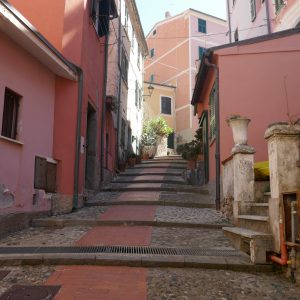
Street in Tellaro

Church in Tellaro
We took 500 photos. What with these and the notes… There must be a book in there somewhere – now all I have to do is write it 🙂
Writing at the Finca in July
 It was a warm week at the finca el cerillo this July – but there’s always plenty of shady places to write or relax in and then there’s the pool with its stunning mountain views…
It was a warm week at the finca el cerillo this July – but there’s always plenty of shady places to write or relax in and then there’s the pool with its stunning mountain views…
In the mornings we did writing exercises taking a different topic each day from ‘The Suitcase’ to ‘The First Date’ and blended this with work on autobiography (using favourite smells from childhood to trigger memories of a place and a person) flash fiction, novel beginnings, sensory overload and character development. Some writers used these exercises to develop work already in progress and some writers got started on a new idea.
After this there were 1 to 1s where we were able to chat individually about… anything and then a leisurely lunch. The afternoons were free for individual writing/ chilling/ swimming/ reading.
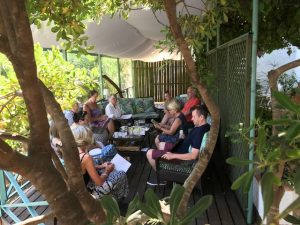 Late afternoon we met up for our group workshop on the shady ‘Palm Deck’ (with a gin and tonic in some cases) and listened to each other’s work with our constructive and encouraging hats on. Most people said they had written much more than they had expected to during the week. And from the feedback comments at the end, I think everyone had a good time.
Late afternoon we met up for our group workshop on the shady ‘Palm Deck’ (with a gin and tonic in some cases) and listened to each other’s work with our constructive and encouraging hats on. Most people said they had written much more than they had expected to during the week. And from the feedback comments at the end, I think everyone had a good time.
Steph kindly organised an optional meditation session one afternoon with some useful ‘brain tips’ to help us feel more in charge of ourselves… And Keeley encouraged us to learn a bit of basic Spanish which came in handy when organising drinks when we visited local restaurants for dinners out.
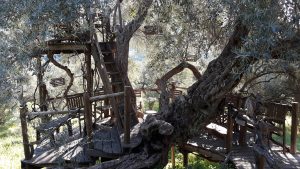 First thing in the morning a few of us did the traditional walk around the olive grove which takes in some glorious mountain views and the sight of Gordon’s treehouse constructed in an ancient olive tree.
First thing in the morning a few of us did the traditional walk around the olive grove which takes in some glorious mountain views and the sight of Gordon’s treehouse constructed in an ancient olive tree.
In the evenings we had Elaine’s quiz, Richard’s music quiz, Gordon’s Desert Island Discs and the infamous hat game (not at all competitive and lots of FUN… 😊) And one night there was music and dancing in the square in Canillas.
We played writing consequences too and wrote limericks for the last workshop session, which wasn’t easy but was good practice and a lot of laughs.
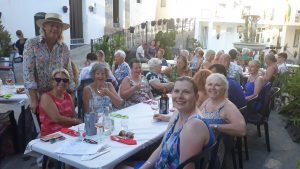 Our next Writing Holiday is March 2023 which is already fully booked but I will be opening up bookings for June 2023 very soon. Watch this space or email me for further information!
Our next Writing Holiday is March 2023 which is already fully booked but I will be opening up bookings for June 2023 very soon. Watch this space or email me for further information!

Summer Sizzlers 2022
In your spare time in this hot weather why do anything more energetic than get into a good book…?
Read on for my summer reading suggestions – including my Book of the Season: Sorrow and Bliss by Meg Mason
The Postcard from Italy by Angela Petch ****
You can’t get much more summery than this dual-timeline novel by Angela Petch set in Puglia, Italy, an area dear to my heart. In Italy in 1945 a young man wakes, bewildered by the bandages covering his face – because he remembers nothing. To the old man who found him he is his dead son Roberto. To Anto, he is a man who fell from the sky who needs to be nursed back to health.
Meanwhile in England in present day, antique shop owner Susannah is reeling after the death of her father. When she finds a postcard of an Italian farmhouse bearing a poignant message of love, she is intrigued. Did her grandmother Elsie have a secret lover?
Elsie suffers from dementia and is unable to give her the answers she is looking for, so Susannah travels to Puglia and manages to track down the Masseria in question. But who wrote the words on the back of the postcard and what are the connections with her family? Susannah feels strangely at home here in Italy. Could it be that this is where she will find her own love as well as the secrets of her past?
This is a story about lost memories and learning to trust and love. I adored the setting – the description is vivid, evocative and the historic element seems impeccably researched. I also felt a great warmth towards the characters – Angela Petch has a way of involving the reader and making her care about the outcome. Most of all however, it is Italy – the culture, the food, the history that came alive for me and made this a compelling read.
The Garden of Lost and Found by Harriet Evans ***
I have to admit that it took me a while to get into this book – but I am glad I persevered as it ended up being a compelling and emotional read.
In the contemporary story, Juliet, an art historian, is part of a complicated family who once lived in the beautiful but dilapidated Nightingale House. She now lives in London with her unpleasant husband Matt and her rather difficult (and also quite unpleasant) children, Bea, Isla and Sandy. What put me off this story was the way the entire family treated Juliet.
The historic story line however, featuring the charismatic Liddy and her artist husband Ned, with Mary, Liddy’s sister and the architect Dalbeattie was fascinating and gripping although also disturbing in places. After a troubled childhood of abuse, Liddy runs away to marry Ned and eventually he buys back the family home, Nightingale House. However, there is more tragedy ahead for the family and it is this that holds the plot together and provides the trigger for Juliet as she gradually uncovers the secrets of her ancestors.
Finally fed up with her treatment at the hands of Matt, Juliet takes the plunge to leave him, aided by the unexpected gift of Nightingale House in which to raise her family. However, the house needs a fortune spending on it and the children do not take kindly to being uprooted and moved away from their friends and their family. Juliet however, finds old friends in the village and a new job which has unexpected rewards.
I really enjoyed this book – especially the historic element – and once again, Harriet Evans weaves an evocative story around the past with the help of an unusual and gorgeous building.
The Distant hours by Kate Morton ***
Edie has always loved the famous and bestselling ‘True history of The Mud Man’ and she begins to suspect that the story may be connected to her mother’s childhood in more ways than her mother has ever admitted. Her mother was evacuated to Milderhurst Castle as a young girl during the second world war and this is the home of ‘Mud man’s’ creator, the author Raymond Blythe.
When Edie finds herself nearby, she decides to go and see the place for herself and she experiences a sense of déja vu – her mother denies it but Edie is sure that she has been here before. Edie is drawn into the history of the place and meets the daughters of the late Raymond Blythe – Persephone, Seraphina and Juniper, all old ladies now. But the more she learns from them, the more mysteries appear, and it is harder than ever to reconcile the evacuated girl with Edie’s straight-laced mother. How can she have changed so much and why?
The story moves between Edie’s contemporary investigations and the older story, told through the viewpoints of the three sisters. It raises many questions – what happened to Juniper’s lover Tom Cavill who disappeared mysteriously one stormy night? What has happened to Juniper, who seems to suffer from some sort of dementia, and why are the twins Percy and Saffy the way they are?
The dual timeline is woven with skill and as a reader, I felt involved with each character and their story. It is a long and at times convoluted read, but the author keeps the reader interested through a series of tantalising questions. One mystery leads seamlessly to the next, until finally the entire story is revealed. Not my favourite Kate Morton book but still highly enjoyable.
A Friend of the Family by Lisa Jewell ***
Lisa Jewell’s easy and fluent writing style is always a joy; she’s my favourite ‘go to’ author when I need an easy-reading book that’s guaranteed to keep me wanting to turn the pages. However, ‘A Friend of the Family’ is one of her older books and lacks the psychological thriller type twists that characterise her later work and I missed that.
Ned, Tony and Sean are the three London brothers whose lives are going wrong (partly due, we are told, by the fact that their contented and happily married parents Bernie and Jerry loved them too much). Ned has just returned from travelling, having left a mentally unstable girlfriend in Australia, and is finding it hard to adjust to the fact that everything at home has somehow changed. Tony, already divorced, is now seeing Ness, but while she is lovable and gorgeous, Tony knows she’s not ‘the one’ and that something is missing from his life. Sean has ‘made it’ with his debut novel but just as he thinks he’s found the perfect woman, everything begins to unravel.
Into this maelstrom of family discontent, steps Gervase, a new friend of the family. He seems innocuous enough – though eccentric – at first, but as time goes on, he gets more involved with the brothers. Gervase appears to have psychic powers. Perhaps he can help this family sort themselves out?
This is a nice idea and a great description of family relationships and exploration of male voices which is completely convincing (to this woman, at least). It may not have the twists and turns of some of Jewell’s books, but it’s still a satisfying read.
Sorrow and Bliss by Meg Mason *****
I loved this raw, emotional story and found it both hilarious and deeply poignant.
The narrator throughout is Martha, sister to Ingrid (mistress of great one-liners) and daughter to a gentle unsuccessful poet (her father) and an alcoholic, crazy and creative sculptor (her mother). The story opens when Patrick, Martha’s long-suffering husband, finally leaves her. We then go back in time to Martha’s childhood, charting the first time she ever met Patrick, a friend of her cousin’s.
Martha’s story is a sad one. From childhood, she has suffered from an undiagnosed and unspecified mental illness, which drives her to hurt those she loves; she has led a life of mental suffering and even attempted suicide. Life is also far from easy for her soul-mate Patrick.
We follow their relationship, their marriage, their break-up and what happens next. Although heart-breaking, it is also laugh out loud funny and the author has been very clever in making this contradictory combination work so well. Martha is mostly horrible and yet I empathised with her, probably because the reader gets to understand the inner Martha who is often not available, even to those she loves. It’s hardly her fault. The question remains though – can she do anything to change the way she is?
The writing style is honest and succinct. Not a word seems overblown or out of place. It’s a compelling and thought-provoking read. Highly recommended and easily my favourite book of the summer.
Spring Reading 2022
The Other Child by Lucy Atkins ****
Another psychological thriller by the talented Lucy Atkins, and this doesn’t disappoint. Photographer Tess – who is divorced from David – has fallen in love with Greg, a paediatric surgeon and as a result, has moved with her young son Joe, across the Atlantic to be with her new husband. But right from the start, all is not as perfect as she had hoped. Greg – who I distrusted from the first incidentally 😉 – has a dangerous secret…
Tess feels isolated, Joe is not settling into his new school, her neighbour Helena is manipulative, and Tess is sure that someone is coming into the house when she is not there. And then there are the unsettling and disturbing notes that Greg is receiving… Something is definitely not right…
Tess is a realistic character and it was easy to tune in
with her emotions and fears – the author skilfully shows her growing sense of unease, suspicion and isolation. Greg was certainly a bit too perfect!
I found the story well-written, fast paced and suspenseful and would recommend if you like getting your teeth into a gripping and psychological drama.
The Castaways by Lucy Clarke ****
This latest and very successful thriller starts very strongly. Two sisters, Lori and Erin are on their way to Fiji for a holiday, they argue, one misses the flight, and the plane gets into trouble… It’s highly atmospheric; you can taste the fear.
Onboard the plane are the pilot, the flight attendant, an elderly couple, a young mother with a baby, two men, and Lori. The pilot manages to crash land the aircraft on one of the many small, uninhabited islands in the Pacific. Meanwhile, the island setting descriptions are vivid and evocative.
The survivors must find a way to survive in the dense jungle, searing heat and shark-infested waters, and they must get along. There is growing distrust between them however, and slowly they realise that a rescue is unlikely since no one knows where the plane went down.
Journalist Erin however, does not give up hope. She is determined to find out what has happened to her sister.
This unsettling book is well-written and there is plenty of tension to make the reader want to carry on turning the pages. Highly recommended.
In a Good Light by Clare Chambers *****
Clare Chambers is fast becoming one of my favourite authors. Her precision with language and her attention to fine detail expertly draws the reader into the world she has created. And what an interesting world…
Esther is the narrator. We learn that her brother Christian is confined to a wheelchair following an accident and we join the fray just as Esther is told that Christian is to marry his bossy carer Elaine – thus destroying the cosy household he currently shares with his sister. Esther will now have to move out. But how will her meagre earnings as a book illustrator enable her to pay rent? And what will become of her unusual relationship with married Geoff, her ex-GP?
Once the main details are established, we are taken back to Esther and Christian’s childhood. The household was eccentric. Their mother liked to give to the ‘less fortunate’ rather than provide any extras for her family, whilst their father, a vicar, was always determined to see the good in everyone. The house meanwhile, was left to fall apart.
Other characters flit in and out of the action as we move inexorably towards the events that led to Christian’s accident. There is alcoholic Auntie Barbara, her practical son Donovan, Christian’s long-suffering, rich girlfriend Penny and troubled Martina. In the end, Christian’s accident seems inevitable.
Following the accident, we move back to current narrative time. Christian’s forthcoming marriage brings some of these characters back out of hiding, with rather surprising results. A compelling story that is highly recommended and wins my Book of the Season vote.
The Night she Disappeared by Lisa Jewell *****
Not her latest, but this one has just appeared on my radar and it’s a goodie. The story opens in Kim’s viewpoint. Her daughter Talullah is out with her boyfriend Zach and they haven’t come home. This is worrying – they have a baby boy and as more time goes past, Kim realises that some harm may have come to them. Where are they? It is a mystery that remains unsolved for a year.
Jump to a year later and Sophie, a crime writer and girlfriend to the new head of a nearby private school, moves into a cottage in the grounds of the school, also close to a wood and an old mansion known as ‘Dark Place’. She becomes intrigued by the mystery, even more so as someone is leaving her clues which seem to strangely echo plots of her own novels. She contacts Kim and together they try to solve the mystery.
We then go back in time, further this time, into Talullah’s point of view before the disappearance, and we learn the complexities of her relationship with Zach and much more besides. We gradually learn her connection with ‘Dark Place’ and finally what happened to them both on the night they disappeared.
Kim and Sophie get there too with a bit of help from Dom of C.I.D. and finally, we learn the truth.
As always with LJ, the book is written, crafted and structured with consummate skill and it kept me gripped and admiring to the very end. Highly recommended and my second 5 * of the season.
Open Water by Caleb Azumah Nelson ****
Nelson won the Costa Book Awards first novel award with Open Water and I was looking forward to reading it, so chose it for my book club.
It’s primarily a love story between two young people – both black, both living in London, both involved in the creative arts, he as a photographer, her as a dancer. They are hopelessly drawn towards one another – there is a sense of destiny and ‘rightness’ which adds a poignant note, but they resist embarking on a relationship beyond friendship (although it’s very intimate for friendship!) for various reasons including their reluctance to ‘come out’ into ‘open water’. But at last and inevitably they do.
Open Water is not just a love story however. It is also about being a young black male in London, the sense of alienation and suppression and the need to find somewhere to call home. For me, this was the strongest and most powerful element of the novel.
The writing is poetic and rhythmic and becomes almost hypnotic in places. Nelson uses the rhythms of jazz and hip-hop and drops in cultural references and language which were unfamiliar and interesting to this reader; this is a world that was new to me and I felt privileged to learn more about it, although it was also unsettling and disturbing at times. However, I did find the prose hard-going – it is written in second person and this seems to give both immediacy and a conflicting sense of distance. It is certainly not an easy read. As a stream of consciousness, it was also repetitive in a way that didn’t always work for me.
But it gave some fascinating insight and members of our book club all said they were glad to have read it. Open Water felt like an important read and its author definitely a talented new voice to listen out for.
Someone to Love by Tracy Corbett ****
Tracy is my queen of romantic comedy – she has such a fluent writing style and the story is peppered with her usual wit and warmth.
Maid of honour Beth Lawrence and best man Matt are not best pleased to be left to organise the wedding of her sister Meghan to his nephew Zac. The time scale is minimal, they would both rather be doing other things and to cap it all, they simply do not get on. Firefighter Matt is just too laidback for Beth’s liking while she is way too organised for him. But as they get to know each other better, it seems that this could be the basis of a relationship after all, and not just any relationship – this could be something special.
As always with Tracy’s books, there is a cast of interesting characters to keep things off the wall and entertaining. Plus a spanner in the works that threatens to de-rail the wedding altogether. But Matt and Beth must make teamwork a priority in order to make this wedding a success.
This book is fun and flirty and is a perfect holiday read.
Flash Fiction Slam at BAC
Full marks to the Bridport Arts Centre for putting on this event – partly designed to encourage writers to enter The Bridport Prize (which includes a prize for flash fiction and one for a local writer).
I was asked to judge, along with Kim Squirrell of Ink and Page, a poet and short story writer. I love a slam – the slightly nervous, buzzy atmosphere; the very fact that writers are brave enough to stand up on stage and read out their own 250 words.
The MC was Declan Duffy who kept a smooth hold on proceedings. Kim and I made frantic notes as everybody read, so that we could remember each piece and what we liked or didn’t like about it.
The evening passed in a flash 🙂 Kim and I retired to a quiet room to discuss the readings and meanwhile The People (the audience) also cast their vote.
Judging is partially subjective, of course. There were certain pieces that we both admired; others that we were able to ‘dismiss’ quite easily. A successful piece of flash fiction will have a point, perhaps a theme; certainly it will be more than an anecdote. It will hopefully be entertaining (perhaps even funny) and hopefully also thought-provoking. A good piece will contain gems that make us stop and take note.
It is hard not to be influenced by presentation – this is a slam after all, so make it count. If a reader speaks in a whisper, how can we hear the gems..? But interestingly, a few days later, Kim and I got to read the three winning entries. Would we have judged differently if we could have read the entries as well as listened to them, before making a decision? Possibly…
But a slam is about immediate impact. No time for second thoughts. Kim and I were in broad agreement (though we placed the top three in a different order) and for the first time ever, our number 1 matched the People’s number 1.
Was the evening a success? Most definitely.
Writing at the Finca March 2022
 It was bliss to be back in Andalusia at the Finca el Cerrillo for the first time in two years. There were sixteen of us in all (two people brought their partners which is always rather nice and adds to the social mix). And it was busy…
It was bliss to be back in Andalusia at the Finca el Cerrillo for the first time in two years. There were sixteen of us in all (two people brought their partners which is always rather nice and adds to the social mix). And it was busy…
For the first time ever we had no less than five published writers in the group… This may sound daunting to an inexperienced writer who is thinking about coming along, but believe me, the reality is nothing of the kind. Others would class themselves as ‘beginner writers’, we are all readers and the combination works as long as the morning exercises can be used beneficially by all. Everyone helped everyone else – this was an incredibly supportive and inclusive group.
The favourite ‘morning exercise’ was probably the one we did to explore dialogue-writing in pairs. We began by creating characters from pictures, continued with some guided writing to get to know them better and then found their voices in a shared script that was passed to and fro within each pair. The results were funny, thought-provoking and sometimes unexpected (in a good way…)
We also had a productive discussion about publishers, agents and submitting work in which we were able to call upon the differing experiences of our group. The publishing world is very fast-moving and it’s important to keep up to date with developments and opportunities.
 The late afternoon workshops featured readings from poems to novel extracts to writing developed from one of our morning exercises. As ever, there was a great variety with plenty of constructive feedback from the rest of the group. We also divided into groups for a précis task which was a bit like consequences but with the aim being to précis the previous writing rather than continue the story. The results were hilarious.
The late afternoon workshops featured readings from poems to novel extracts to writing developed from one of our morning exercises. As ever, there was a great variety with plenty of constructive feedback from the rest of the group. We also divided into groups for a précis task which was a bit like consequences but with the aim being to précis the previous writing rather than continue the story. The results were hilarious.
The food was better than ever, the hospitality second to none. Only the weather let us down (first time ever) but even the calima (sandstorm) provided an er… interesting experience.
The final night of ‘Desert Island Discs’ finished off another fabulous fun and productive week at the Finca el Cerrillo. Roll on July… (And for more information check out my previous post ‘February at the Finca’ and the Trip Advisor site below)
I Am Editing…
Sometimes I feel as if I spend more time editing than writing although of course editing is writing, and equally important a process in the journey.
But as novelists, what should we do when we are editing? What should we be looking for? What needs to change?
Here are my top tips for editing the Rosanna Ley way.
- Print it out – it’s so much easier to spot repetitions, over-long paragraphs, breaks in flow etc when you read it on the actual page. And quite fun to scribble all over it…
- 5 Ws. Read one scene at a time and at the end of each scene ask yourself – does it cover the 5 Ws (where/ who/ when/ what/ why). In each scene the reader should know where the action is taking place, who is involved – and how they are developing as a character – when it’s happening, what is going on – in terms of plot – and some sense of character motivation.
- Balance. Also at scene end check the writing is balanced. For example: have you included massive chunks of description and forgotten about internal thought and dialogue? Have you included lots of explanation but not kept the scene active? Worst of all have you bored your reader to tears..?
- Continuity – if James has blue eyes in Chapter 1 does he still have blue eyes at chapter 40? Have you written something early on which you have entirely forgotten about during the later chapters? (Easily done).
- Narrative Time – does this make sense? Is it chronological and if not, why not? Are the right things happening in the right season at the right time of day? How much time has passed since the previous scene and how have you signalled this to the reader? Give each scene a time of day and a date to check on time passing. It is key to authenticity which allows your reader to suspend their disbelief and stay in the world of your novel.
- Structure – are the chapters and scenes in the right place? Have you considered your points of tension and where they occur? Does your story sag in the middle and if so, what can you do about it?
- Lay-out – Have you left the right gaps in the right places, presented each chapter in the same way, used italics consistently…? This is a point of professionalism which your editor will appreciate.
- Fine-tuning – do the sentences flow? Are there too many adjectives? Repetitions? Favourite words that you have used again and again and again… Are there any clunky phrases or ‘darlings’ which need to be cut? (For ‘darlings’ read expressions/words /phrases/ images which you love and which are terribly clever but may not fit in with the narrative and are there for the wrong reasons). Check punctuation and grammar too.
- Reading Aloud – nothing will alert you to all the pitfalls above as effectively as reading aloud. To yourself or to a patient friend…
- Get Feedback – it’s important though to ask the right person. A helpful friend who might also be a reader of your book is perfect but he/she must be honest and constructive rather than congratulatory or destructive. (Family members are probably best avoided for this task). Listen to the feedback, consider it and then decide whether or not to take it on board. It’s your novel, after all…
P.S Editing is a time-consuming and absorbing task, which is why this is my first post since last November…
It’s getting colder – time for some late Autumn goodies…
Here’s some late Autumn reading to warm your cockles…
Hamnet by Maggie O’Farrell ****
Maggie O’Farrell is a favourite author of mine and in this novel, in which she used the life of Shakespeare and specifically the death of his son Hamnet as her starting point, she is at her most poetic and compelling.
The novel does not pretend to be the story of Hamnet’s death – there is not enough information available for this to be even possible – rather, it is an imaginative re-creation of what could have happened, how a family at that time in England might have felt on losing a precious child, what this might have done to a marriage. Shakespeare himself is often not present. He is away working in Stratford or London with his players, immersing himself in the world of writing, having left his family behind in a place where he was being gradually destroyed by the expectations and influence of his father. Rather, it is his wife Agnes, who we get to know. O’Farrell has portrayed her as a mystical, spiritual woman, a healer, an eccentric who will never forgive herself for being unable to save her son.
The book then isn’t about narrative tension – we already know what is going to happen. It’s about the relationships, the characters, the psychology, the context. And the repercussions of grief. It’s about chance too. O’Farrell switches seamlessly between the wisdom of the omniscient narrator and the emotive power of character viewpoint and internal dialogue, while the type of story it is, allows the author to indulge her love of going off on fascinating, descriptive tangents. But she always takes her reader along for the ride. Highly recommended.
The Beloved Girls by Harriet Evans ***
When we first meet Catherine, a successful barrister, in May 2018, she is clearly troubled by shadows from her past, and it is no surprise when she vanishes from a train station on the eve of her wedding anniversary. The past in question centres around the mysterious West Country manor house of Vanes and the events of 1989 when a young girl Janey Lestrange arrived to stay with the Hunter family. Janey is grieving the death of her beloved father and she becomes involved with the twins Joss and Kitty Hunter as the long hot summer gradually draws them all towards the ancient ceremony of ‘The Collecting’ of the bees’ honey from the Hive in the abandoned Chapel, where Janey, along with Kitty, play the role of ‘The Beloved Girls’.
The narrative switches between Catherine and Janey and between 1989 and 2018, and has just the right amount of mystery to keep the reader guessing. The description of that 1989 summer at Vanes is evocative and atmospheric and the female voices are strong and compelling. This is a book about friendship and feminism and I very much enjoyed immersing myself in it.
The Flight by Julie Clark ****
Claire Cook seems to have a perfect life. But behind closed doors, we discover that her husband, a highly successful and ambitious politician, is both controlling and abusive. Unsurprisingly, Claire would love to disappear… Enter Eva, brought up in a foster home who has become embroiled with some unsavoury characters and who is now in trouble and needs to disappear. What better way then than to make a switch at the airport and board each other’s flight?
There’s plenty of danger ahead though, for both women – it’s a bit of a roller-coaster ride. And gradually we learn about their pasts and how they came to this point in their lives – the detail is filled in seamlessly without holding up the action.
This is a fast-paced psychological thriller which was right up my street. The dual plot lines worked well and both stories were compelling. The characters were well-developed and there were enough twists and turns to keep this reader happy. A high level of suspense makes for a gripping read and the plot turned out to have even more complexity than I thought at first. Highly recommended.
The New Girl by Harriet Evans ****
There’s more than one new girl in this story written primarily from the viewpoints of Margot, Maggie and Winnie. Maggie is the first newbie to enter the story when she takes over Margot’s highly desirable job of fashion editor at the prestigious Haute magazine during her maternity leave and becomes ‘the new girl’ in the office. It is hard for her to find a way to step into the successful shoes of the glamorous Margot but soon Maggie is doing her dream job so effectively that Margot worries she might have lost the position forever.
Meanwhile, Margot’s best friend Winnie who is also pregnant, tragically loses her baby soon after his birth. She promptly cuts Margot out of her life, bringing back memories of the time she did this once before – the worst time of Margot’s life – when Helen, another ‘new girl’ at school destroyed their closeness. As Margot’s anxieties increase, fuelled by the hate messages she is receiving on social media from ‘Helenknows’ we realise that the shadows of the past have had far-reaching consequences and that Margot has secrets that she needs to hide. When Margot’s daughter Lila (the third new girl) is born, Margot is consumed by the thought that she might lose her just as Winnie lost Jack. Margot begins to unravel – she just can’t work out who is on her side.
The first third of the story is fairly slow but interesting as the characters develop and the story is set up. In the second third, the pace quickens and in the third there are enough twists and turns to keep most readers guessing. I really enjoyed this book with its background of the world of fashion, while the themes of loss, female friendship and rivalry and anxiety were compelling. I didn’t fully warm to any of the characters and I found the ending slightly disappointing, but nevertheless this was a gripping read and I would highly recommend.
Grandmothers by Sally Vickers *****
The story weaves between three main narrators – Nan, Blanche and Minna, all grandmothers in their way. Nan is grandmother to Billy; while her relationship with her son and daughter-in-law can be tricky, she shares with Billy a love of humour, adventure and exploration and it falls to her to teach him about some of the more difficult aspects of life – such as lying and death (!)
A row with her son means Blanche is separated from her beloved granddaughter Kitty, but after a period of going off the rails (during which time, she meets Nan) she manages to see her granddaughter all the same and discovers a new life for herself too along the way.
Minna is no relation to the sensitive and imaginative Rose, but plays the role of grandmother by caring for her, and sharing both her world of childish imagination in toys that come alive and her pleasure in children’s literature. But when family problems threaten to move Rose’s family to Glasgow and away from Minna, Minna finds new strength and purpose. Even she is powerless to help Rose when Rose is thrust into an adult world that shocks her, but by then, Rose and Minna have met Nan and Billy and together they find a way through.
The stories of the three women and their grandchildren are absorbing enough, but it is the complexities of the relationships, the subtle nuances, the clever twists and turns that make this book such an excellent read. The three female protagonists are very far from perfect, but Sally Vickers grants them ways in which to find insight, and the results are both thought-provoking and fascinating. Highly recommended and my book of the season.
Circe by Madeleine Miller ****
Miller takes the Ancient Greek tale of the Goddess Circe, she of the mystical powers, and spins it into a captivating story of her own.
Circe, the narrator, is shown here to be a fascinating creature – both flawed and wise, growing on her life’s journey and finding a way forward in her immortality just as human characters do. We see her as a child, spurned by her family for her lack of beauty and her ‘thin’ mortal voice, adoring her father Helios, God of the Sun and falling in love with a mortal, which unhappy experience leads to her discovery of her powers of transformation. Instead of being glorified for this however, Circe is exiled to a deserted island and here she lives alone, except for those – like Odysseus – who visit her. Circe develops her powers, growing first bitter and eventually strong.
The story is a compelling one. The Ancient Greek Gods have long been an interesting subject, but here, it is the author’s imagination that takes the story to a higher and more emotive level. As readers, we feel for Circe when she is badly treated and we share her joy when she eventually finds the happiness she deserves. I was already waiting for that final twist, but it didn’t spoil the ending for me. Highly recommended.
Writing and Researching during a Pandemic
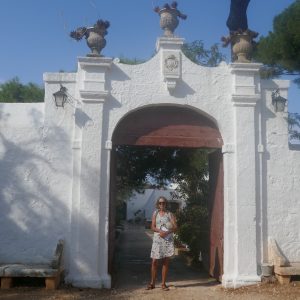
At the Brancati Olive Farm
It has been a strange eighteen months to say the least. Many people have suffered – physically, mentally, with the loss of a loved one and more. And what of writing?
Writers are a mixed bag and so it seems are their reactions to the pandemic. Some have cherished their increased ‘me-time’; time in which to write, reflect, enjoy a quieter time in their environment. Others have found themselves stuttering to a temporary halt, creatively speaking. It is not always easy to immerse oneself in another world when the world we are living in seems to be suffering so very much.
For myself, the pandemic has come at a time when I had already planned to take longer to write my next book. I feel fortunate. There have been times when I have gained huge inspiration from a natural landscape that has often seemed so much more peaceful than usual. And there have been other times when I have felt simply unable to write, due to various pressures or anxieties, and then, I have been able to take a break, without too much concern.

Trulli houses in Alborello
From a more practical standpoint, my next research trip to southern Italy was postponed three times in 2020 and 2021… This has made it impossible to write scenes in situ and I’ve been forced to write the story with huge gaps – to be filled in later.
But I’m pleased to report that I have now visited Puglia, done all my research and am well on the way with the book at last. It was wonderful to go back to Italy and to see all the places that I wanted to write about up close and personal.
The working title for the book is ‘The Lost Garden’ and here are a few research photos from my trip.
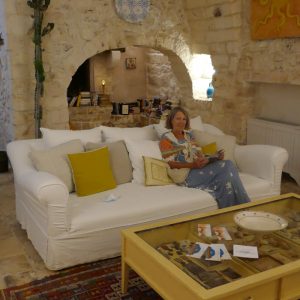
At the Masseria

In Ostuni

Stunning Polignano
Summer Sizzlers – my summer reading
I’ve been busy writing my new WIP and promoting ‘The Orange Grove’ this spring and early summer but here are a few summer reads that I’ve enjoyed – starting with my Book of the Season, ‘Playing Nice’ by JP Delaney . Happy Summer Reading…
Playing Nice by JP Delaney *****
JPD happens to be one of my favourite authors. He has this way of drawing you in from the first page and he will not let you go. This book is no exception.
Peter Riley has just dropped his rather difficult two year-old Theo off at nursery when two men come round to the house. And guess what? One of them is an older version of his son Theo… We want to talk to you about your son, they say. Uh huh. This is the kind of opening I’m talking about.
I don’t want to give away any spoilers but let’s just say there has been a mix-up (!) and two sets of parents have ended up with the wrong baby. What should they do? They could be polite and civilised and find a way of dealing with this without too much upheaval and distress by ‘playing nice’. But what if that doesn’t work? Then I suppose it’s time to ‘play dirty’.
The main characters are all complex, flawed and believable, just as you would expect from a JPD novel. The plot is delightfully twisty and unexpected. There are some thought-provoking issues such as the relevance of nature versus nurture and the strength of blood ties. And as usual, the author delves into the psychology of the situation with wit, realism and empathy.
There is a bit of a plot contrivance which should stop me giving this book 5 stars, but I enjoyed it so much that I’m letting it go. Very highly recommended. The best psychological thriller writer around IMO. And my Book of the Season.
Unbreak Your Heart by Katie Marsh ****
I was fortunate enough to be sent an advance copy of Katie’s new book which I devoured in just a few sittings. It’s that kind of book – emotive and warm, it kind of wraps its arms around you and envelops you in a warm hug. Right now, that feels very welcome.
Seven-year-old Jake has a serious heart condition which he has learnt to live with. But he knows that the further operation – which he must have in order to lead an active life – doesn’t come without risks. Jake could die and while this is scary in itself, he also doesn’t want to leave his dad, Simon, on his own. Simon has been managing alone since Jake’s mother Tamsin left, and Simon has been grieving for the loss of the love of his life ever since, while struggling to earn a living at the same time as caring for his son. But is she really the woman he thinks she is and how would he feel if Tamsin came back into their lives? Simon is about to find out.
Beth, Simon and Jake’s new next-door neighbour, has come to the small village in the Lake District, determined to forget the past and the mistakes she made while working in the US as a critical care nurse, which continue to haunt her. She becomes drawn to the man and boy next door and the consequent friendship changes each one of their lives forever.
There aren’t any great surprises in this book. But it doesn’t matter, because what there is, is a whole lot of heart. Katie Marsh writes with great insight and sensitivity, her characters are well-drawn and the story just zings with emotion and warmth. A feel-great story. Highly recommended.
Queenie by Candice Carty-Williams ***
Queenie is a 25-year-old Jamaican British woman living in London and working as a journalist. After a messy break up from her long-term white boyfriend, Queenie is looking for comfort – but not always in the right places. After various disasters that only serve to increase her lack of self-worth, Queenie begins to suffer from anxiety and depression and the book becomes darker as the author explores online dating, anxiety and racism, mixing up serious issues with humour and the value of friendship and love.
The book has been compared to ‘Bridget Jones’ Diary’ – a comparison that probably relates to the journalistic style of the writing as well as the humour; it is natural, fresh and uncensored, with a strong sense of personal voice and lots of showing rather than telling. I liked this aspect of the book. But be aware that the humour sometimes sits uncomfortably with the dark places to which the narrator goes. Bridget Jones is dippy and embarrassing; Queenie is a far more complex character.
When I started reading, I wasn’t sure how much I liked this book. It seemed so ‘in your face’ that it was almost too much. However, as the story developed and the complexities emerged, I was completely gripped by Queenie’s story.
The Sight of You by Holly Miller **
Mascara warning for this one – it’s not just romantic, it’s the epitome of romantic and will appeal to all the non-cynics out there who believe in true love, soul mates and the power of love…
It’s written from the two points of view of Joel and Callie, two appealing characters who meet in a coffee shop. Their relationship isn’t straightforward though because Callie is grieving following the death of her best friend Grace and Joel has a good reason for not falling in love. He has a secret – he dreams about the people he loves, and those dreams always come true. It’s torturing him. He has had to give up the job which was his life and he has become a caffeine addicted insomniac – dreading what he might dream about next. Nevertheless, he is drawn to Callie and eventually gives in to the power of love…
But one night, Joel has the dream about Callie that he’s been most fearing and they must both decide: can they stay together and live with the knowledge of what is to come or must they let each other go and find happiness elsewhere?
I have to admit that I found it hard to suspend disbelief at times. The story is well-written (if a little over-written at times) with a fresh style and it’s certainly emotive and immersive, but sometimes it’s almost too much. Perhaps I’m too cynical after all? Judging by the reviews, I’m certainly in the minority when it comes to this book. I couldn’t quite believe in the completeness of Joel’s dreaming, characters that were almost too good to be true nor that two people so much in love would let each other go. I love a good romance but this was just too romantic for me…
The Mothers by Sarah J Naughton ***
This is an intriguing psychological thriller about five mothers (only one isn’t a mother): Chrissy, Bella, Skye, Electra and Jen who formed a friendship when they met at their antenatal group. Now, several years later they are still friends and see each other regularly. But one of their husbands has gone missing…
When we first meet them – sometimes from their viewpoint and sometimes from that of the main investigating officer who pits her powers of problem-solving against that of a certain ‘master-criminal’ – they seem to have little in common apart from motherhood. How close are they really? This question runs through the book and the author cleverly reveals the information we need to answer it, bit by bit within a series of well-structured twists and turns.
At the heart of the story is the disappearance of Bella’s husband – but who dunnit and why? The book explores the themes of friendships, motherhood and secrets, of post-natal depression and stillbirth, marital relationships gone right and wrong and lots more besides. It’s packed with drama and is an entertaining read.
The Secrets of Strangers by Charity Norman ***
The paths of five strangers cross in a London café one morning when an apparently crazed gunman runs in and holds them hostage. The novel is multi-viewpoint so we get to know all the characters one by one and gradually learn that they all have secrets which are somehow addressed through this terrifying situation. which enable them to cope with the situation and also relate to Sam the gunman who has plenty of secrets of his own. Meanwhile the police negotiator Eliza is there to listen to Sam’s story for the benefit of all the characters and readers too.
I found this story to be well-written and gripping, with good tension and characterisation. I believed in the characters to a great extent; it was the way they all got on so well (including the situation) and the feeling that a character had been selected from every possible walk of life that made it hard to suspend disbelief. Sam’s story being told to Eliza in full also seemed rather a contrivance and there was a sentimental slant that spoilt the drama for me.
However, I liked the way that the ‘hostage situation’ was upended, the blurred line between right and wrong that was presented and the fact that as readers we probably ended up feeling sorry for those we might not expect to feel sorry for. There was a lot of nice emotion and sense of character journey and complexity, and the beginning in particular was dramatic and exciting. A very entertaining and compelling read.
Someone Like You by Tracy Corbett
This is a rather delicious romance just perfect for reading in the summer sun, preferably in a sun-lounger with a glass of something cool and fizzy to hand. Lileth Monroe has not had an easy time of it. She has spent most of her young life caring for her elderly grandparents and when her grandfather dies she is desolate. She has ambitions to be a costume designer, but real life and her shy personality have kept her working at a patterns factory where she is underpaid and under-appreciated.
Enter the Caribbean. While on holiday, Lileth decides to re-invent herself as Lily. She already is funny and clumsy but she will now become quirky and confident too – a plan that doesn’t always work out but which does throw her into the arms (literally) of our hero, Will, who is still mourning the death of his wife and has work problems too.
There are plenty of obstacles along the way to stop these two getting together, and although this is a simple and romantic tale, there are some thought-provoking issues being addressed, such as grief and the problems of being a single parent. As always, Tracy Corbett writes with warmth and humour about characters who are both flawed and lovable and as always this is a hugely entertaining read.
The Seville Orange and Almond Cake
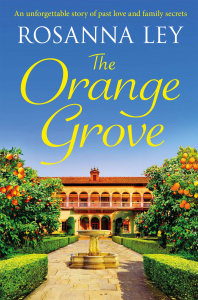 ‘The Orange Grove’ features two of the characters making a very special cake – a Seville Orange and Almond cake. It is made from an old secret family recipe which was handed to Ella when she was attending a family party and flamenco performance in Seville many years before. But for Ella, the cake – and therefore the recipe – has added significance and brings back memories of her time in Seville, which she has tried to push aside.
‘The Orange Grove’ features two of the characters making a very special cake – a Seville Orange and Almond cake. It is made from an old secret family recipe which was handed to Ella when she was attending a family party and flamenco performance in Seville many years before. But for Ella, the cake – and therefore the recipe – has added significance and brings back memories of her time in Seville, which she has tried to push aside.
This special cake is traditionally made at times of celebration. Bitter Seville oranges – not available all year round – give it an evocative bitter-sweet flavour which resonates for Ella with the memories themselves, whilst the ground almonds are deliciously rich and fragrant.
Some readers have asked for the recipe. To start with, I told them that this is a secret family recipe (!) just as it says in the book, but since it is so good, I thought I’d relent and publish it here.
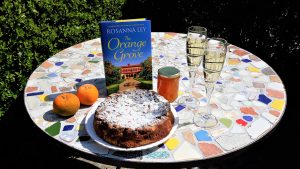 And here’s one a friend of mine made earlier!
And here’s one a friend of mine made earlier!
The cake is best enjoyed – as you can see – with a glass of fizz.
If you make and enjoy the cake, I do hope that you will let me know – and send a photo if possible. Thank you!
Seville Orange and Almond Cake
Ingredients:
- 2 Seville oranges, about 280 g (10 oz) scrubbed & roughly chopped (with skin)
- 5 eggs, separated
- 200 g (7 oz) caster sugar
- 225 g (8 oz) ground almonds
- 2 tbsp flaked almonds
- Zest of half a lemon
- sifted icing sugar to decorate
Method: Prep: 1 hour. Cook: 55 mins.
- Put the chopped oranges in a small saucepan, discarding any pips. Add 1 tbsp water, then cover and cook gently for 30 minutes or until the oranges are soft and excess liquid has evaporated. Leave to cool.
- Preheat the oven to 180ºC (350ºF, gas mark 4). Line the bottom and sides of a 23 cm (9 in) springform cake tin with baking parchment. Finely chop the oranges in a food processor or blender, or with a large knife.
- Put the egg whites in a large bowl and whisk until they form stiff peaks. Gradually whisk in half the caster sugar, then whisk for 1 minute.
- Using the same whisk, whisk the egg yolks with the remaining caster sugar in another bowl for 2–3 minutes or until pale and quite thick. Whisk in the finely chopped oranges, then carefully fold in the lemon zest and the ground almonds.
- Stir in 3 spoonfuls of the whisked egg white to loosen the mixture, then gently fold in the remaining whites with a large metal spoon. Transfer the mixture to the prepared tin and level the top. Sprinkle with the flaked almonds.
- Bake for 50–55 minutes or until the cake is golden and a skewer inserted in the centre comes out clean. Check the cake after 20 minutes and again at 30 minutes, and cover lightly with foil if it is browning too quickly.
- Leave the cake to cool in the tin, then turn it out, peel away the lining paper and transfer to a serving plate. Dust with icing sugar before serving. The cake can be kept in an airtight tin for up to 2 days.
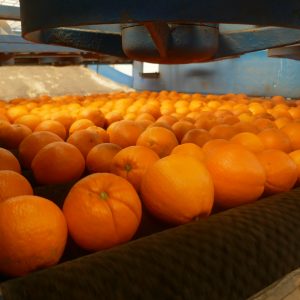
The Writing Walk
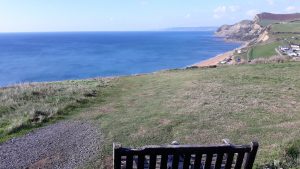 For any writer put off by the blank screen and finding it hard to get started on a poem, a short story, the scene of a novel or whatever, I would suggest switching to a notebook and pen. Time-consuming it may be, but there’s something special about writing this way and for me anyway, the blank page is more of a friendly invitation than the rather scary blank screen in my office.
For any writer put off by the blank screen and finding it hard to get started on a poem, a short story, the scene of a novel or whatever, I would suggest switching to a notebook and pen. Time-consuming it may be, but there’s something special about writing this way and for me anyway, the blank page is more of a friendly invitation than the rather scary blank screen in my office.
And it’s more portable and sun-friendly. I often pack some water and a notebook and pen in a rucksack and head off on a writing walk. Exercise and getting some work done – it’s a double whammy and hard to resist when the sun is shining.
First – switch off your phone, or even better leave it behind. Then, the exercise bit – this might involve climbing up a cliff path or walking along a beach until you get past all the people, but it could equally be walking to the park or a café, or wherever you think you might like to sit down and do some writing.
 It’s not only exercise though – this is multi-tasking at its best. Whilst walking (or running or cycling or whatever) you can look around you, let your mind wander, do a bit of nature (or town) appreciation. It’s calming. The rhythm of the walking bit, the mind-wandering bit, the nature bit – I believe all these help you relax and forget other non-writing related problems that might be on your mind. They’re a kind of lead-in into the sort of head-zone that helps us to write.
It’s not only exercise though – this is multi-tasking at its best. Whilst walking (or running or cycling or whatever) you can look around you, let your mind wander, do a bit of nature (or town) appreciation. It’s calming. The rhythm of the walking bit, the mind-wandering bit, the nature bit – I believe all these help you relax and forget other non-writing related problems that might be on your mind. They’re a kind of lead-in into the sort of head-zone that helps us to write.
Sometimes though, I might be walking in order to sort out a plot problem. In this case, I’ll let – even encourage – the work to come into my head as I walk. But I don’t let myself stop too soon in order to write things down. Oh, no. Instead, I’ll drive myself crazy by mulling things over, by letting the thoughts crowd in (in an ideal world) by listening to all the characters as they gabble away to one another. When I come to my stopping place I can’t wait to start writing. Frankly, I’d go even crazier if I couldn’t…
 Hopefully you’ll have a place in mind. I have a few. One of my favourites is overlooking a local beach, but I also like being on any beach watching the ocean, in the woods or in a quiet park on a bench with birds singing their hearts out. Even a noisy café can work for many people – it’s easier to shut out that kind of noise than it is just one person talking on the phone at home (or so I have found – haha).
Hopefully you’ll have a place in mind. I have a few. One of my favourites is overlooking a local beach, but I also like being on any beach watching the ocean, in the woods or in a quiet park on a bench with birds singing their hearts out. Even a noisy café can work for many people – it’s easier to shut out that kind of noise than it is just one person talking on the phone at home (or so I have found – haha).
Once there, have a swig of water, relax, take in your surroundings and get your notebook out. And if nothing comes to mind, then write about where you are, what you can see, smell, hear, touch or taste. Write about how you feel or how you felt yesterday. Just get in the zone. It doesn’t matter what you write. It matters that you write. And enjoy.
Winter Reading Hotties
The Midnight Library by Matt Haig ****
This book is a bit special. It’s a great premise for starters. Nora Seed (love that name) does not have a fulfilling life. She is depressed and we soon learn that she is contemplating suicide. So far, so Matt Haig. But when she tries to do the deed, something rather strange happens to Nora. She is transported into a library, along with her old librarian Mrs Elm (love that name too) and it so happens that all the books in this particular library are other versions of her own life.
This is a new angle on the Sliding Doors kind of story that is familiar, whereby a person can exist in some kind of parallel universe and end up having a completely different sort of life, depending on whether or not a different pathway or decision was taken in the past. But this story is different, and although it doesn’t always work exactly (because where does the other Nora go when our Nora takes over their life?) it is fairly easy to suspend disbelief while Nora considers her life regrets and decides which different lives she would like to try on for size.
This is a life-affirming book and as such the ending may be slightly predictable. It is also not entirely easy to empathise fully with Nora when she is so many different people… But it seems petty to quibble when this book could potentially do an amazing job for those amongst of us who suffer from poor mental health and I very much like the overall message – the grass isn’t necessarily greener on the other side. The writing is excellent, the little touches of magic are fabulous, it may even bring a tear to your eye. Highly recommended.
Where the Crawdads Sing by Delia Owens *****
Another goodie… This book is set in Barkley Cove in the 60s and 70s, a quiet town on the North Carolina coast. Specifically, it’s set mostly in the marshland beyond, an isolated area where the only inhabitants are the ‘swamp people’ generally considered ‘trash’ by their arguably more genteel neighbours in Barkley Cove. When the story begins, the main character Kya is a young child who sees her mother leaving their marshland home due to her father’s violence and alcoholism. Kya cannot believe it. Her mother always waves and she always returns, but not this time.
Kya has already witnessed her older siblings leaving; now there is just Jodie her elder brother, Pa and Kya. When Jodie too has had enough it is just Kya and Pa and then finally Kya is left alone to find food, to look after herself, to learn. Fortunately, there are a few people in the town who are not so prejudiced against the ‘marsh girl’ but even so, when a crime is committed in the town, suspicion soon falls on Kya.
This book is so well-written; as readers, we can’t help but embrace the wild and sensitive character of Kya and hold her close throughout. We also embrace the marsh because the writing is full of the most wonderful descriptions and a sense of place that is just magical. Kya’s story pulls us in and as the mystery deepens, the book makes for compelling reading. I absolutely loved it. To be taken with a log fire during long and dark winter evenings with your favourite tipple. Very highly recommended.
Small Pleasures by Clare Chambers *****
Yet another excellent read – definitely in my top 5 for 2020 – is this story set in 1950s post-war England. This absorbing tale is narrated by Jean, a spinster who has suffered many disappointments in life, and who has reconciled herself to caring for her truculent mother and never being able to escape or find the love and fulfilment she once craved. The saving grace of Jean’s life is the independence she has carved out for herself through her job as a journalist. However, it is hard for a woman to get beyond the women’s pages of domestic trivia and when a story comes up that suggests there may be a woman who has experienced a virgin birth living nearby, Jean is eager to cover it for the newspaper.
Enter Gretchen and Howard, a couple who seem very ordinary at first but who turn out to be anything but. Jean is gradually drawn into first a friendship and then a more intimate relationship and between them, the couple change her life. But was it a virgin birth that Gretchen experienced all those years ago and what are the hidden secrets surrounding the circumstances of conception? This mystery is the core of the story and Jean as well as various medical scientists are determined to find out.
Full of compassion and dry humour, 1950s life and immaculate period detail seep out of every pore of this emotive and captivating story.
The Other Passenger by Louise Candlish ****
Louise Candlish never disappoints and here she is again with another twisty tale of domestic noir to grip the imagination and keep us hooked to the very last page.
The narrator is Jamie, a forty-something who has given up his job in the city after an episode of severe claustrophobia and who is now working as an (overqualified) assistant in a London café. He lives with his girlfriend, Clare, and we learn early on that the elegant house they live in belongs to her and that she is a partner in a successful and up-market firm of estate agents. Jamie is funny (we are told) but in this set-up, bound surely to suffer from low self-esteem (though we’re not told this; in fact, if anything he comes over as slightly arrogant IMO). Enter Kit and Melia, younger, attractive, out of work actors who both seem to have a chip on their shoulder about not being rich. Jamie and Clare befriend the couple, Kit and Jamie start travelling into the City on the riverboat and as the relationships intensify, so the plot thickens.
There are two timelines. One begins at the end of the year when Kit mysteriously disappears and two policemen question Jamie, believing he may have a motive for killing him; the other timeline takes us through the year from its beginning when the two couples first met. The action jumps from one to the other smoothly and successfully.
It’s fairly unusual for Louise Candlish to take the voice of a male character for the entirety of the novel and as I didn’t take to Jamie, this initially spoilt my enjoyment of the book. However, the twists and turns come thick and fast and pretty soon I was immersed and determined to work out how the book was going to end. (I got part of it but not all). No spoilers here, but it is a tale of betrayal and friendship, and it is also rather sad. Sometimes it’s hard to know who to root for as the characters are (mostly) rather unpleasant but this, I suppose, is one of the conventions of this kind of domestic noir. Not my favourite by this talented author, but still a very good, super-tense and twisty read.
The Guest List by Lucy Foley ****
I love a good murder mystery and this one, a modern take on an Agatha Christie type plot, definitely fits the bill with a host of eclectic characters and plenty of secrets and lies. The occasion is a wedding party, taking place on the wild, isolated and rather spooky Cormorant Island, off the west coast of Ireland. The setting creates a great atmosphere, albeit a little clichéd. The golden couple getting married are Jules, publisher of a successful online magazine, and drop-dead-gorgeous actor Will.
The structure of the book is clever – the viewpoints are divided between ‘bride’, ‘wedding-planner’, ‘bridesmaid’, ‘best man’ and ‘plus one’ and each one of these characters has their own story to tell – which gradually unfolds (including flashbacks) as the wedding progresses, complete with drunken games, arguments, a storm, power cuts and eventually murder. But who has been murdered? And whodunnit? It seems that almost anyone could have.
There is a great sense of tension and impending disaster running through this narrative which continues unabated as we discover more about the characters – psychologically, this is fascinating! The plot is mostly strong, but there are a few plot niggles, little inconsistencies, coincidences and certain things that remain unexplained. But it’s so well done, that the implausible moments are entirely forgivable. And there we go – yet another recommended read…
Returning to Belle-ile-en-mer
 I’ve been drawn back into the research trip I made to Belle-ile-en-mer, Brittany, France, for ‘Her Mother’s Secret’ by a Kindle promotion running for the month of January 2021. See here: https://amzn.to/3sgi62Y
I’ve been drawn back into the research trip I made to Belle-ile-en-mer, Brittany, France, for ‘Her Mother’s Secret’ by a Kindle promotion running for the month of January 2021. See here: https://amzn.to/3sgi62Y
So I thought I’d share a few of my favourite pictures…
This house overlooking the harbour in Sauzon was the inspiration for Thea’s home and flower shop.
Colette has not been back to Sauzon for years and when she finally returns, it is the trigger for an emotional journey in more ways than one.
The island is full of quirky houses, wild moors and gorgeous sandy beaches.
 This atmospheric lighthouse can be seen for miles. It’s on the wild moorland by the rocky beaches and gave me the idea for the Old Lighthouse where Élodie lives and creates her driftwood sculptures, having collected the wood from the rocky bays nearby her home.
This atmospheric lighthouse can be seen for miles. It’s on the wild moorland by the rocky beaches and gave me the idea for the Old Lighthouse where Élodie lives and creates her driftwood sculptures, having collected the wood from the rocky bays nearby her home.
 There’s so much to see in Belle-ile-en-mer. Here are some goats spotted on Donnant beach!
There’s so much to see in Belle-ile-en-mer. Here are some goats spotted on Donnant beach!
And some beautiful sunflowers… 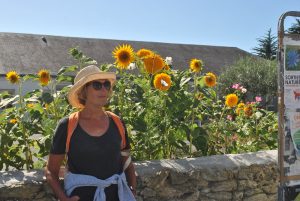
Belle-ile was the place that Claude Monet fell in love with when he painted the rocks at Port-Coton. “I am in a wonderfully wild region, with terrifying rocks and a sea of unbelievable colours; I am truly thrilled, even though it is difficult, because I had got used to painting the Channel, and I knew how to go about it, but the Atlantic Ocean is quite different.” (Letter from Monet to Gustave Caillebotte). 
It was also home to Sarah Bernhardt for many years. It’s the kind of place you can fall in love with (or the kind of place where you can fall in love).
When this pandemic is over and we’re all able to travel again, I hope to go back there one day and re-visit all the haunts that I wrote about in ‘Her Mother’s Secret’. Until then, if you want, you can visit for just 99p 😉 https://amzn.to/3sgi62Y
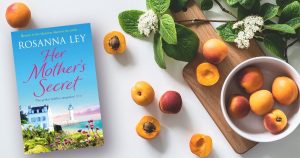
The Creation of a New World (to Everyone who Does It)
It’s winter, traditionally a time for hunkering down and getting involved in a new world. I usually start a new book around October, so by now, most of the planning and some of the research should be done and I’m starting to hear the characters’ voices. It’s time to begin.
It’s never easy to begin though. That scary white page, that blank screen… There are so many possibilities and it seems so important to get it right. It isn’t though. The important thing is to start – and then once it’s on the page you can fix it (thanks to Ian Rankin for that quote).
Many writers say they’re finding it hard to write during this global pandemic – understandable; so many of us are suffering from anxiety and many more have loved ones who have been ill or even lost to the disease; how can we hope to focus on anything else while all this is going on?
We are though in a privileged position. Not only can we escape to another world through reading, which isn’t just a distraction nor just a pleasure; to many of us it’s a lifeline. But as authors, we can also take time out from these challenging days to create our own world. We can create our own characters (who may or may not be in difficult or traumatic situations – that’s our choice) and we can create their setting, their backgrounds, their problems and their joys.
Writing… It’s fun, it’s a distraction, it’s a way of being emotionally invested in something you can totally control. How good is that? Forget those well-worn clichés about authors not being in control of their own novels, of characters who ‘leap’ off the page and dictate the action. What were you – an empty vessel? Nah – as the author, you can make this happen or you can stop it from happening; the choice is yours.
Because when your characters seem to leap off the page – it’s because you made them so lifelike in the first place that they had the ability to jump. Yes, you did that. You created three-dimensional, interesting people with real issues that readers could become emotionally invested in. And if those characters seem to direct the action – it’s because you got them right in the first place.
That wonderful feeling, when as an author you are in the zone, your pen (or fingers) are flying, your inner censor is strangely silent, your authorly anxieties have gone to sit in another room… That’s not your story or your characters taking over, that is you letting go, allowing your imagination and creativity to run free, that is you being an author. Don’t let anyone take it away from you. You created this new world, it’s now yours to make of it what you will…

My writing bench
Autumn Warmers
It’s windy, it’s rainy and the clocks have gone back. What does that make you want to do? Yes, READ… So here are some good books you may want to curl up with in front of the fire.
The Fallen Girls by Kathryn Casey.
Detective Clara Jefferies has spent years running from her childhood in Alber, Utah – with good reason. But when she hears that her younger sister Delilah has disappeared, she knows that she must go back and help find her. When she arrives there however, she faces suspicion and denial and her family refuse to even talk to her. How can Clara break through and discover the dark secrets that lie within this apparently peaceful community?
This polygamous community is an unusual one and some of their traditions are hard to understand. But this adds to the complexity and interest of the story for me. The narrative is told from the points of view of Clara and Delilah, with a sensitive layering of emotions, toughness and vulnerability.
The plot thickens when a body is discovered and at last the community realises that it needs help to prevent further disappearances and further deaths.
The story is fast-paced and original. I really enjoyed it.
Where We Belong by Anstey Harris
Ah… Anstey Harris has followed the wonderful ‘Trials and Triumphs of Grace Atherton’ with an equally brilliant second novel. Written from the viewpoint of narrator Cate Morris, we discover and explore the losses she has recently suffered – of her job, of her house, of her beloved husband Richard.
Richard was the victim of severe depression and Cate, alongside Richard’s best friend Simon, has lived with this for years. But when Richard finally dies under tragic circumstances, Cate finds herself and their son Leo alone, broke and forced to return to Richard’s family home, the mansion and fascinating museum of Hatters. There, she encounters the force field that is Araminta, loyal family friend, and the warmth that is Patch, amenable artist and tutor. She forges relationships with them both, but finds that like her, they are both holding closely-guarded secrets.
Cate finds herself compelled to help save the family home that she thought Richard had turned his back on. And slowly, accompanied by plenty of drama and tension, all those intriguing secrets come to light. Exquisite writing and a rich tapestry of ideas and language hold this novel together beautifully and keep you enthralled until the very last page. Very highly recommended.
The Other Son by Nick Alexander
This is the first book by this author I have read. It’s written in three viewpoint sections: The Wife (that’s Alice), The Son (Tim) and The Other Son (Matt). I liked this structure – we get a good insight into each perspective, and it’s a fascinating portrayal of how we come across to others, as compared with what we are feeling inside. Everyone’s truth is a different one.
Alice is married to Ken, a violent and unlikeable man and while the reader may (given what she tells us) wonder why on earth why she still is, Alexander does to some degree explain. Alice however is at the point of doubting whether this state of affairs should continue, and when her friend Dot leaves her husband, the matter is brought to the forefront even more. Meanwhile, the first son, Tim, is married to the volatile Natalya, and again, it is interesting to see how Alice’s view of her daughter-in-law differs from Natalya’s portrayal of their relationship. We also get an insight into Tim and Natalya’s marriage and see how Tim feels about his parents too. All interesting stuff…
We then move on to the ‘other son’ Matt who has been referred to throughout as a bit of a wastrel, off wandering the world somewhere and escaping his responsibilities. Again, things are different when we find out his truth.
I did have some questions at the end though. While I don’t need everything tied with a neat bow, the structure of the novel meant that we knew nothing about Tim, Natalya, and Ken’s reactions to how the situation has (rather surprisingly) developed. Why is Ken suddenly being so generous? How have Tim and Natalya resolved their differences? And so on. Nevertheless, I enjoyed the novel and would recommend.
My Sister the Serial Killer by Oyinkan Braithwaite
A great title for a novel, this certainly grabs the attention and structurally, the book is refreshing too. It’s written from the nicely conversational point of view of Korede in short bite-sized chapters titled with subjects such as: bleach, knife, words; each one a small anecdote in itself, which also serves to progress the story. It’s compact in style too.
The story is of Korede’s relationship with her sister Ayoola, who has taken to killing the men she gets romantically involved with (a seductive concept in itself 😉). But why does she do this, what can Korede do about it and what happens when Ayoola’s potentially destructive attentions fall on Tade, the subject of Korede’s own romantic fantasy?
In some ways this is a classic story of two siblings, one beautiful, one ugly, one responsible and sensible, one not; the one looking out for the other. But in other ways it’s so much more. Braithwaite touches on thought-provoking subjects here – abuse, how people respond to beauty, the complexity of sibling relationships. The pace is lightning fast, the dialogue sparky and the humour and wit dry and relentless.
The author states in her acknowledgements that she wrote this book quickly and had fun doing it and this shows (in a good way). It’s simple and like many simple things it has a light touch which is effective. A bit ‘Killing Eve’ in style but still very original. Highly recommended.
The Life we Almost Had by Amelia Henley
If you like an emotional and romantic read, this is definitely one for you. The book starts when Adam and Anna’s relationship is strained to breaking point. Will their love survive? This question is what will make you want to read on.
I quite liked the description of their first meeting – it was very romantic and after what Anna had been through (being jilted at the altar) it was lovely to see her meeting ‘Mr Right’. But sadly as the years together continued, the story takes a darker turn and it seems that their love isn’t strong enough for it to survive. Or is it? Personally, I appreciated the exploration of the ‘darker issues’ (I won’t say what they were, in case I spoil things for readers) but I was irritated by the very obvious way in which the author flagged everything that was coming and also by the plot which bordered and definitely tripped right into the very unrealistic… Sadly, I wasn’t drawn to either of the two main characters either.
However, the romance content was high and the book has lots of wonderful reviews, so I’m left reminding myself how subjective all this is. If romance is your bag and you don’t mind some darker stuff being thrown in to the mix, then this book could blow you away. And good luck to it.
Magpie Lane by Lucy Atkins
I thoroughly enjoyed Lucy Atkins’ previous novel ‘The Night Visitor’ and I was expecting more of the same. I wasn’t disappointed. Dee, a nanny in Oxford, is being interviewed by the police about the disappearance of a young girl Felicity who was in her care. During the interview, Dee’s viewpoint flashes back over time to tell us the whole story, in pieces, intersected with the continuation of the interview. So, we learn how Dee met Nick Law, Felicity’s father and how she came to be hired as the nanny. We learn about her growing relationship with Felicity who is ‘selectively mute’ due to a trauma following the death of her mother and we learn a lot about ‘secret Oxford’ – the stories and the architecture, the people who have lived and died there and the graveyards. But how did Felicity disappear and what happened to her? We don’t find this out until the very end, even though perhaps we can guess.
I enjoyed the way the book is structured which enables a gradual and fascinating reveal of Dee’s past – among other things – and I loved the telling of the relationships: Nick’s with his Danish wife Mariah, Dee with Linklater the ‘house historian’ and all the rest. Dee is quiet and intense but her internal life is rich and nuanced.
The ending was a bit of a disappointment for me and I missed some of the twistiness of Atkins’ previous novel but nevertheless the story is detailed and gripping and extremely well-written. She is an author expert at drawing the reader into another world and I love that.
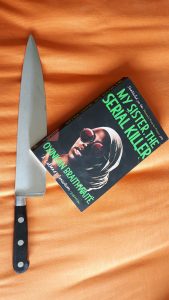
Research in the Walled Gardens
This summer and autumn I’ve been exploring some walled gardens in Dorset, Somerset and Devon on my next research trail…
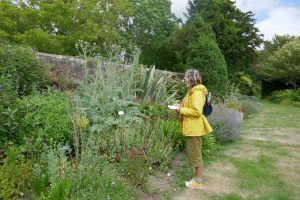 As usual, the book that I’m currently planning will be set in West Dorset and somewhere abroad, because I love to write about the West Country of the UK and I also love to travel and explore other cultures too. For the ‘abroad’ bit I’ve chosen Italy once again – yes, I know – but this time I plan to visit Puglia in the south, somewhere I’ve never been. Hopefully I’ll be going there next May and if I do, pandemic permitting, I’ll post some research pics on this blog soon after.
As usual, the book that I’m currently planning will be set in West Dorset and somewhere abroad, because I love to write about the West Country of the UK and I also love to travel and explore other cultures too. For the ‘abroad’ bit I’ve chosen Italy once again – yes, I know – but this time I plan to visit Puglia in the south, somewhere I’ve never been. Hopefully I’ll be going there next May and if I do, pandemic permitting, I’ll post some research pics on this blog soon after.
 The West Dorset element of the next book is going to feature a walled garden – not just any old garden but an Arts & Crafts Walled garden as in the style of Gertrude Jekyll who pioneered the movement.
The West Dorset element of the next book is going to feature a walled garden – not just any old garden but an Arts & Crafts Walled garden as in the style of Gertrude Jekyll who pioneered the movement.
It was a reaction against Victorian neatness and order and so it features cascades of flowers planted in deep unruly beds, which is much more my sort of garden.
 Rather than rows of bright annuals, the Arts & Crafts Garden tends to prefer the romantic cottage garden plants, wild flowers and perennials, such as lavender, hollyhocks, catmint and lupins, with lots of scented roses and herbs.
Rather than rows of bright annuals, the Arts & Crafts Garden tends to prefer the romantic cottage garden plants, wild flowers and perennials, such as lavender, hollyhocks, catmint and lupins, with lots of scented roses and herbs.
Structurally, the gardens are interesting because they often feature ‘rooms’ of planting, with one room leading into another by way of an archway cut into a yew hedge for example, or a wooden gate. There might be a ‘thinking garden’ for example – a place for reflection and writing – or a ‘hot garden’ with lots of flame coloured plants. Nice…
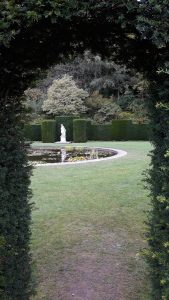 Ideally, the garden should harmonise and echo the house itself. William Morris’s famous ‘The Red House’ is an example of this.
Ideally, the garden should harmonise and echo the house itself. William Morris’s famous ‘The Red House’ is an example of this.
It turns out that there are quite a few interesting walled gardens near where I live, mostly looked after by the inspirational National Trust, and it’s been fascinating to wander around them, take lots of photos and think about the garden I’m going to create in the book.
Gardening is both creative and healing.
The Arts & Crafts gardens were often walled and this was my starting point for the book. There’s something about a walled garden – it can be a place of secrecy, of entrapment, and of escape perhaps… Lots of ideas and time to get planning!
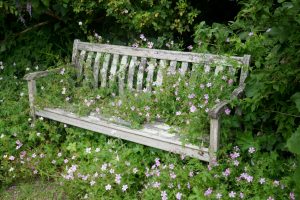
Late Summer Reading…
It’s time for some book reviews. These are some of the books I’ve been curling up with this summer…
Hello, Again by Isabelle Broom
Isabelle Broom specialises in taking her characters to wonderful locations and this novel is no exception. Pepper is an artist with little faith in herself; she is also dealing with a tragic loss. When she meets the hilarious Josephine, she gets the chance to travel for the first time in her life to Lisbon and then Barcelona on a trip designed to bring back memories of an old but never forgotten love affair of Josephine’s.
However, the trip throws up more than memories. Pepper herself finds someone unexpected, but like all of life’s journeys, things are never quite what they seem and are usually much more complicated… This novel is all about the journey and Pepper’s journey involves not only being able to deal with the loss her family has suffered and her difficult relationship with her mother, but also involves the need for her to stop blaming herself and to see herself as the talented artist she really is. It’s about dreams and adventures – and this book has lots of both.
The descriptions of Lisbon and Barcelona (and then Hamburg) as well as the home location of Aldeburgh, Suffolk are evocative and the characters are warm and easy to empathise with, especially Pepper and Josephine. In the book something beautiful comes from something broken – what’s not to love?
The Other Daughter by Caroline Bishop
This dual narrative dual timeline story is set in 1970s London and Switzerland in 2014. London in the 1970s is a place where it was still hard for a woman to succeed in a man’s world, and this is indeed the case for feminist Sylvia, a journalist who is determined to create a successful career. But when she falls pregnant and has to marry Jim much earlier than planned, it becomes harder for her to have it all. Writing about women’s rights in Switzerland is how she gets her first big break as a writer – but what else happens to her in Switzerland? Her daughter Jess becomes determined to find out.
In Switzerland in 2014, Jess is battling with her own demons and trying to discover the truth. What she finds out is shocking, but it helps her to come to terms with her own life and her own frailties.
The book is packed full with interesting information about Switzerland and women’s rights and yet the author still maintains a fast pace and holds the reader’s interest well over both narratives, which are well-balanced although my primary empathy was with Sylvia and her fight with chauvinism. A good read which I found pleasingly different in its choice of both subject and setting.
Little Disasters by Sarah Vaughan
This novel is about the different experiences of motherhood as viewed primarily by Liz, a doctor, and Jess, a stay at home mother. It brilliantly captures the anxieties, the sense of guilt, and the emotional complexities of motherhood. But when Jess takes baby Betsey into hospital and Liz sees that the child has suffered a fractured skull which may or may not indicate suspicious circumstances, the story gets much darker as those suspicions threaten to break already fragile relationships.
Being a Sarah Vaughan novel, the story is not straightforward, and although one or two of the twists are guessable, there is much more that is not. And really, whether you guess what’s coming or not, it doesn’t matter, because that isn’t the main point of the book. This novel will reassure struggling mothers everywhere that being a mother is never easy and never simple whether you are alone or married, whether you have been a mother before or not, whether you have the support of friends, whether your life seems perfect, whether you choose to work or stay at home. Whatever. There are no easy answers, but ultimately, the author suggests that friendship, support and non-judgemental understanding will pull you through and that motherhood may be difficult, but it’s also intensely rewarding. It is a thought-provoking read and many of us have been there! Fast-paced, with warm and interesting characters, this psychological and intense emotional drama will have you fully absorbed from the off. Highly recommended.
The Flatshare by Beth O’Leary
I wasn’t sure if this would be my thing. I love comedy – but only when it’s mixed up with other stuff. Let me tell you – this is mixed up with other stuff and it’s also brilliantly funny. First – I loved the premis. Tiffy is broke, has just split up with her boyfriend and is looking for a cheap flat. Leon, a nurse in palliative care working night shifts is trying to finance his brother’s appeal and is looking for a way to make money from his one-bedroomed flat. He decided to offer up a flatshare – the only problem being that they would have to share a bed (at different times, naturally).
Leon has a girlfriend, Kay, who isn’t keen on the idea for obvious reasons, but she offers to show Tiffy the flat, see if she’s ‘suitable’ and well, Leon can stay at Kay’s at weekends, so there’s no reason for them ever to meet – is there? Leon and Tiffy agree to these terms, Tiffy moves in and their relationship (confined to post-it notes for a long time) begins.
I don’t think it’s a spoiler to say it’s a bit like one of those lovely old-fashioned love grows through letters stories – but with a contemporary twist. And there’s other stuff. The second thing I liked was the gorgeous, warm, funny, independent, and slightly goofy characters. They are so different, and yet… The third thing is the sub-plot of Leon’s brother’s appeal and oh yes, the other sub-plot of Tiffy’s relationship with her controlling and coercive ex-boyfriend – who refuses to let go of his undeniable hold on her.
Put all these things together in a book which is well-written, sparky and funny, with sharp dialogue and bucketloads of emotion and how can you go wrong? Beth O’Leary doesn’t. Very highly recommended.
All the Lonely People by Mike Gayle
Gayle is adept at combining humour and the poignant with a topical and thought-provoking subject and he does it again in this novel. Hubert Bird (what a fabulous name) is one of the Windrush generation who travelled to the UK on the promise of a better and richer life. As I’m sure was the case with many of his generation, he may have got the chance of a job (not easy) and made a meagre living, but those living conditions were poor, his prospects were bleak and some of the surprises in store were not pleasant ones. The cold and rainy British climate and the frequent racism he encounters being just two of them.
However, Hubert has a refreshing and positive view on life and when he meets Joyce, his life certainly improves. However, that was then (1950) and this is now (2019) and things have changed for the worse.
The story is written entirely in Hubert’s viewpoint and in dual narrative time from those two periods in Hubert’s life. We soon learn that although his relationship with Joyce brought Hubert happiness, he is now ‘one of the lonely people’ and it takes the intervention of his neighbour Ashleigh, with whom he forms an unlikely but rewarding friendship, for that to change.
This is a book about loneliness, but it’s also about friendship and the importance of community. It is about racism yes, but it is also about love. It’s sad but uplifting. A strong read that is highly recommended.
Writing Cinematically
Listening to the radio the other day, I heard a presenter marvelling in an interview with a well-known film director and novelist at the fact that he referred to writing his novel in ‘scenes’. ‘You think like that because you’re a film director,’ he exclaimed.
Well, possibly. But I also think about my novel in scenes. And I’m definitely not a film director. This got me to thinking – why do I (and many other authors I’m sure…) think in scenes rather than just chapters?
Partly because a scene isn’t the same as a chapter. You could have two different scenes in one chapter or one scene running over two chapters.
And also – as authors, we’re imagining events taking place before we can begin writing them. This involves all the senses, including the visual. We’re imagining the whole scene, if you like.
When we’re plotting a storyline, we’re creating a sequence of events. But when we’re deciding on certain questions about a small section of the story: where is this taking place? When is it taking place? Who is there? What is happening and why? Then, we’re creating a ‘scene’. (Please note I am avoiding the obvious joke here…)
An example from my current novel, From Venice with Love… Early on in the story, someone finds some old family letters. What she reads, piques her curiosity and sets her off on a pathway of trying to find out more about the writer of these letters, a watercolourist named Emmy.
So… It’s Q & A time. Who finds the letters? Joanna. Where might she find them? In the attic. What is she doing there? Looking for some old childhood memorabilia. Why is she looking? To entertain her eccentric and difficult mother.
So now I’m getting to know the scene. Joanna will be in the attic looking for childhood memorabilia when she comes across some old and mysterious letters in an ancient and dusty trunk.
This is the scene. I know who is in it and I know where she is and what she’s doing. I can add some atmosphere and some thoughts and emotions. Hopefully I am also adding an element of mystery along the way and progressing the story too.
This all sounds rather obvious. But crucially, as writers, at least if we are planners, this is how we might plot out every section of our novel in order to form a tight structure.
I remember PD James once saying that she preferred to write cinematically, and that she would choose to write first whichever scene of her novel was most drawing her at the time, regardless of chronological order. This was because the emotions would be the strongest. She was already emotionally invested in the scene.
I’ve done the same. If you feel confident enough, chronology can always be sorted out later. Writing cinematically allows the writer to visualise a scene and all the elements within it so that the emotions and thoughts can be explored and the story naturally progresses. Within each scene, there are other elements of structure to consider of course. For example – whose viewpoint are you writing in? How will you create tension? What senses do you wish to describe in order to develop more layers of interest in the story? How will you manage the pace?
But basically, IMO it’s a great idea to get the scene in your head first.
Perhaps then, inside all of us novelists is a frustrated film director just waiting to get out..?
June News
Where has the time gone? It’s the last day of June and I just realised that not only did I miss posting here in May, but I also almost missed posting in June. I always have the same reason: I was immersed in a book – writing that is, not reading… In this case I was deep into the writing of my next book The Orange Grove which is to be published in 2021. But that’s not all…
So here’s a quick run-down of my June news:
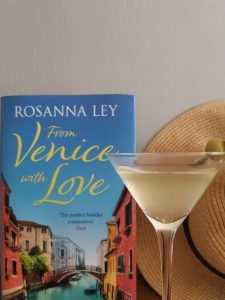 My new novel has been published in paperback! From Venice with Love hit the shops on 25th June and here it is with a delicious cocktail…
My new novel has been published in paperback! From Venice with Love hit the shops on 25th June and here it is with a delicious cocktail…
From Venice was also chosen for a Kindle promotion during June, which meant there was a lot of media work to do. There was so much support – it was wonderful and the book has done well in the Kindle charts.
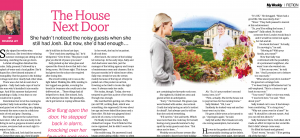 I wrote a few short stories for Hello, Woman & Home and My Weekly. Here’s a peek…
I wrote a few short stories for Hello, Woman & Home and My Weekly. Here’s a peek… 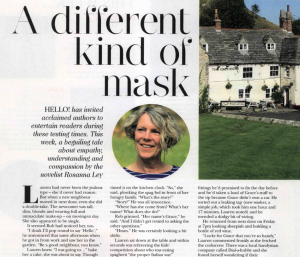
Also, I’ve been writing some features about our writing holiday for Booktrail as you can read here: https://bit.ly/2ZtGzV8
And for My Weekly. I’ve done a feature for The Lady and interviews with some lovely BookBloggers such as Jill’s Book Café https://bit.ly/2BmaA1d. And the lovely Rebecca at https://bit.ly/2Byu6aL
I had a great chat with fab author Isabelle Broom whose latest book is called Hello Again. And here we are… https://bit.ly/38nGRAI
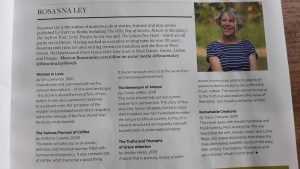 I also chose my five favourite ‘lockdown reading’ books for Dorset magazine.
I also chose my five favourite ‘lockdown reading’ books for Dorset magazine.
I recorded two excerpts from From Venice for Booktrail and My Weekly on my balcony in the sunshine complete with birdsong… https://bit.ly/2BVv00W
So as you can see, I haven’t been twiddling my thumbs. See you in July!
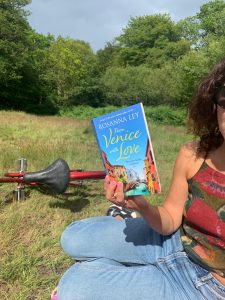
Spring Reading (In Lockdown…)
So, here we all are – still in lockdown and looking for a way to escape into another world. No? Well, if not, I’d definitely recommend doing so, pronto.
Having said that, this year’s spring reading isn’t all happy stuff but it’s interesting – and there are plenty of different worlds on offer. Read on…
The Binding by Bridget Collins
This book caught my attention with its premis. Once upon a time, in the days after the Crusades when books were illicit and frowned upon (in this fictional world) there were people born to be ‘binders’ who could – with a person’s permission – ‘bind’ them by listening to and writing down their memories. Somehow, in this intuitive and slightly magical process, the person would ‘lose’ those memories; they would only be once again accessible if the book were to be destroyed. Books were kept by binders in safety vaults, but naturally, some would fall into the wrong hands and people’s secrets (that they no longer remembered) would be revealed. Some people considered binders a help to humanity since they allowed the bound person to forget their pain and suffering, some saw it as cowardly, others used the process to aid their own corruption. Novels were ‘fake’ since they were imagined rather than real memories…
It’s such a brilliant idea and I wish that the author had explored in more depth the theory that we grow as human beings through our pain and suffering; that without these experiences we may fail to develop our full potential; life’s rich tapestry and all that. The book is well-written though slightly laborious in the first half and slow to pull the reader in. However, about half way through, I was completely drawn into the love story, the strength of which overcomes the ‘binding’ of the two individuals concerned. It’s dark, atmospheric and truly mesmerising in places; a fascinating read.
On Chapel Sands by Laura Cumming
This haunting memoir has been described as being a love letter from the author to her mother and certainly it is her mother’s life – which includes a mystery, a kidnap, and the silence of her community – which Cumming explores. The author is also an art expert and she uses pictures (both paintings and photographs) to illustrate her points and to represent parts of the story. It is a story which weaves and rambles (but in a good way). I love the language and style with which she describes the area in which her mother grew up; her prose is vivid and compelling.
The downside of the memoir for me, is that its personal nature makes the story seem a bit self-indulgent at times. However, Cumming does often make her personal observations universal and the existence of ‘family secrets’ is a compelling idea for many of us. It is a slow story too but every time I wanted to put the book down, there was a little twist to keep me interested. Perhaps sometimes the use of the art world is a little overdone, and the story does become repetitious at times. Nevertheless, I was drawn into the emotions of this family and fascinated by the intimate portrait of a closed community that it presents. The story is thought-provoking and inspired a fascinating discussion about personal memories in our book group!
The Tattooist of Auschwitz by Heather Morris
I was inspired to read this book, having seen the high number of glowing reviews and by the fact that it has been a huge best-seller. I expected it to be a hard read and disturbing, because of the content, but I was prepared for this. Yes, it was disturbing, but I also found the story-telling somewhat distant and strangely emotion-less (given the traumatic content), because of the ‘reported’ nature of the narrative. Only when I came to the end of the book did I realise why. Yes, it is one man’s story of his time in Auschwitz, but it is his story as told (apparently) to the writer Heather Morris, who has then re-told his story from his perspective, but not fully in his perspective i.e. she has – for whatever reason – maintained an emotional distance; we are told of his emotions but not shown. It’s reported. The same applies when Morris moves into the viewpoint of Gita the girl Lale falls in love with in the camp. This means that the reader, while naturally horrified at the facts presented, might also not fully engage with the characters’ emotions.
I have also since read that the Auschwitz memorial society has questioned many of Morris’s ‘facts’ concerning this time at the camp and even that Lale’s son was upset by the fact that his name was wrongly written. His father’s name was actually Lali. I am left confused. Is this story intended to be Lali’s story or is it Lali’s story fictionalised? Is this made clear in the book and does it even matter? These are questions for every reader to answer for themselves. And who is profiting from this story of human misery? Are some of the profits from the sales of this book being given to war survivors or to the family – and if not, should they be?
Jackie and Maria by Gill Paul
I enjoy fiction that has been written around a real life story and this is a good example. Jackie Kennedy, whose husband Jack was famously assassinated in 1963 and who went on to marry the billionaire Aristotle Onassis, and Maria Callas, the famous opera singer who was his lover for many years, are both strong characters who have been in the spotlight of publicity and celebrity throughout their lives. The third character of this story, the link between the two women was Ari himself, and although Gill Paul does not write from his viewpoint, nevertheless as a character he still features in a larger than life way.
Their story is an eventful and emotional one. The author explains in her notes at the end of the book where she has taken dramatic license with the true historical facts and I think this is a good thing as it is tempting to believe every word of this captivating story and to forget that it is in fact a fictionalised version based on the truth as we know it.
These three are all charismatic characters with powerful personalities and all have a different way of dealing with the publicity they inevitably attract. I was fascinated to read about them and found their story played out against an intriguingly political and glamorous backdrop both dramatic and compelling.
The Dream Daughter by Diane Chamberlain
When Carly discovers that the baby she is carrying has a serious heart defect that will be fatal, she is naturally devastated. It is the 1970s, she has recently lost her husband to the Vietnam war and now it seems she will lose her baby too. But her enigmatic brother-in-law Hunter knows a way that Carly can save her daughter. All she has to do is make a huge leap of faith. Can she trust him and how can his plan possibly work?
This unusual story is packed with interesting characters, an unlikely premis and plenty of dramatic twists and turns which make the story both compelling and original. The structure of the novel is fascinating – it has been cleverly plotted; every small detail is there for a reason. Diane Chamberlain writes with great warmth and emotion while a fast pace keeps the reader gripped and the pages turning. Highly recommended.
A Single Thread by Tracy Chevalier
Tracy Chevalier excels at evoking the kind of fine detail that creates a strong sense of authenticity and realism in her books. And this is the perfect vehicle – a novel about the ‘broderers’ who make kneelers and tapestries at Winchester cathedral in the 1930s.
In particular, the novel features Violet Speedwell, one of the so called ‘surplus women’ surviving the losses of the first world war – Violet’s brother and fiancé were just two of the casualties. Her mother is embittered and domineering, whilst Violet just wants to get away and have the chance to lead a satisfying and independent life. This desire takes her from Southampton to Winchester where she becomes one of the famous ‘broderers’. She meets two women, Gilda and Dorothy, also searching for some acceptance outside social conventions and forms a potentially dangerous liaison with the older but charismatic Arthur, a bellringer, whose wife is still suffering from her wartime losses.
The novel shows us how difficult it was for women to find and sustain an independent life in this time. Independence comes at a cost – Violet may be pitied by her married female peers but she is judged by men, very few of whom understand how difficult it is merely to pay the rent. Men also pose a threat, especially to a woman who dares to stray outside the boundaries of those acceptable social norms.
This then is a book about loss. It is also the kind of book that embraces the reader and pulls them into Violet’s life and time. It is also about creativity – the descriptions of the embroidery and the bellringing are just wonderful. And it is about feminism too. I loved it. Highly recommended.
Returning to Mandalay
It’s eight years since I visited Burma to research Return to Mandalay and it was an amazing experience.
 We began the trip in Yangon. At 6.30 a.m. it was already so hot that the Burmese were using umbrellas as sunshades. First up was the Shwedagon Pagoda – it’s immense and beautiful; it also has an air of spirituality unlike anything I’ve ever seen; truly awe-inspiring.
We began the trip in Yangon. At 6.30 a.m. it was already so hot that the Burmese were using umbrellas as sunshades. First up was the Shwedagon Pagoda – it’s immense and beautiful; it also has an air of spirituality unlike anything I’ve ever seen; truly awe-inspiring.
Architecturally, Yangon has retained much of its colonial history; it’s poignant to observe the differences in the Burmese living conditions, both now and then.
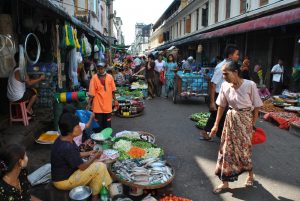 The lively street markets haven’t changed hugely since that time; the flavours and aromas of woodsmoke and sweet frying oil, of incense and the smell of the sewers running just below the broken pavings, all remain… In Return to Mandalay, Lawrence meets Maya in one of these markets. So far, so romantic..?
The lively street markets haven’t changed hugely since that time; the flavours and aromas of woodsmoke and sweet frying oil, of incense and the smell of the sewers running just below the broken pavings, all remain… In Return to Mandalay, Lawrence meets Maya in one of these markets. So far, so romantic..?
Lawrence would have stayed at one of the colonial buildings on the waterfront, probably the Strand Hotel where my late father-in-law Peter Innes stayed in the 1930s. Peter worked in Burma in the logging industry and served with the Chindits during the second world war. His wife Hazel kept a lot of excellent source material, especially records from his company, Steele Brothers, books about Burma such as Helen of Burma by Helen Rodriguez, which gave me valuable information about nursing and hospitals during the war in Northern Burma, and photographs – pretty much gold dust for a writer.
 From Yangon we took an internal flight on a tiny and fragile plane to Mandalay and went by road to Maymyo where Lawrence would have stayed at a colonial ‘chummery,’ now a guesthouse, and where Maya’s family had a weekend home. Maymyo is ridiculously British… Anyone visiting Burma should read George Orwell’s ‘Burmese Days’ for sure.
From Yangon we took an internal flight on a tiny and fragile plane to Mandalay and went by road to Maymyo where Lawrence would have stayed at a colonial ‘chummery,’ now a guesthouse, and where Maya’s family had a weekend home. Maymyo is ridiculously British… Anyone visiting Burma should read George Orwell’s ‘Burmese Days’ for sure.
On which note, the Royal Palace and Cultural Museum in Mandalay provide important information about the final Burmese dynasty when Queen Supayalat and King Thibaw were ousted by the British and all their riches ‘confiscated’. If you’re British, it’s not something to be proud of sadly.
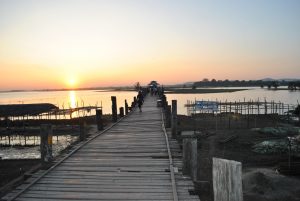
We also walked along the famous U Bein bridge – it’s thought to be the longest and oldest teak bridge in the world and it’s quite something.
It was in Mandalay that I experienced my first earthquake…. We spent the night in the foyer of the rickety hostel we were staying in. It was as scary as it sounds but miraculously we and even the hostel survived.

Inwa was like going back in time – there’s no motorised traffic; everyone travels by horse and cart or bicycle. It must have been a bit like that for Lawrence in the 1930s, though there wouldn’t have been so many children trying to sell crayoned fans and melon-seed bracelets!
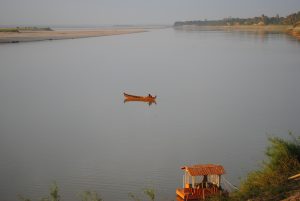
Finally, we travelled for ten hours by boat along the Irriwaddy River to Bagan, home to thousands of temples.
On a practical note, when we visited Burma, I was advised not to write openly in my notebook, as this could be seen as a politically threatening act, and also not to declare my occupation as ‘writer’ on my entrance visa. This meant storing thoughts and observations until I could write them down in the safety and privacy of our room at the end of the day. I still did a lot of writing though – turns out it flows more easily when it’s not allowed…
 Return to Mandalay is only very loosely based on Peter Innes’s story. I also talked to Bill Johnson one of my creative writing students from Alston Hall, Preston, who had served in the second world war in Burma and who had a lot of stories to tell. And I read the memoirs of the late John Sams, father of our friend Mervyn, who fought with the Ghurkas there. Sadly, all of these men are now deceased but hopefully their stories live on to some small degree, in this fictional world.
Return to Mandalay is only very loosely based on Peter Innes’s story. I also talked to Bill Johnson one of my creative writing students from Alston Hall, Preston, who had served in the second world war in Burma and who had a lot of stories to tell. And I read the memoirs of the late John Sams, father of our friend Mervyn, who fought with the Ghurkas there. Sadly, all of these men are now deceased but hopefully their stories live on to some small degree, in this fictional world.
Writing at the Finca in February
 This February 2020 I took a writing group to the finca el cerrillo situated in the mountains of Andalucía near the small and unspoilt village of Canillas de Albaida. We’ve held a writing holiday here every year in early July for the past eleven years, but this was the first time we’ve visited in February. And it was fabulous…
This February 2020 I took a writing group to the finca el cerrillo situated in the mountains of Andalucía near the small and unspoilt village of Canillas de Albaida. We’ve held a writing holiday here every year in early July for the past eleven years, but this was the first time we’ve visited in February. And it was fabulous…

The finca hotel – once an olive mill – is run by Gordon and Sue Kind who have carefully retained its original character whilst creating a quirky but luxurious boutique hotel in gardens set within an olive grove and planted with palm trees, carob, hibiscus and jasmine, so that intoxicating scents follow you as you walk down the meandering paths and terraces.
 There is a white air-conditioned studio/ workroom, outside courtyards and terraces with plenty of sunny and shady chill-out areas, an indoor salon for dining in the chillier months and an outside pool for the warmer ones. There is even a two-storey tree house created by Gordon in the branches of an ancient olive tree, complete with chairs, tables, candles and fairy lights.
There is a white air-conditioned studio/ workroom, outside courtyards and terraces with plenty of sunny and shady chill-out areas, an indoor salon for dining in the chillier months and an outside pool for the warmer ones. There is even a two-storey tree house created by Gordon in the branches of an ancient olive tree, complete with chairs, tables, candles and fairy lights.

What I love most about this special place is the air of tranquillity. It embraces you the moment you arrive and then you just sink deeper and deeper into the peaceful vibe. It’s magical.
In our morning writing sessions, we do various writing exercises, including visualisations and freewriting, focusing on a theme and practising a writing technique (for example getting to grips with viewpoint/ structure/ plotting / imagery or whatever it might be that day). My aim is to provide a springboard for ideas that can either be used to create new writing or develop an existing work in progress.
 I will also read a piece of work and offer 1 to 1 sessions during the week to discuss this. The rest of the day is free for participants to write (or relax!) until the late afternoon when we have a group ‘reading of writing’ workshop.
I will also read a piece of work and offer 1 to 1 sessions during the week to discuss this. The rest of the day is free for participants to write (or relax!) until the late afternoon when we have a group ‘reading of writing’ workshop.
And it’s not all about the work… The food at the finca el cerrillo is superb; we go out to nearby restaurants on three evenings for a change of scenery and there is a day off during the week when Sue can arrange a day out to Malaga old-town or Nerja on the coast, for example.

This week, Sue and Gordon took a small group of us on an easy-going mountain hike on the old Silk Route, which was just brilliant. And the evenings were great fun, especially the final ‘Desert Island Discs’ night…
 This week’s group quickly settled into life at the finca and soon formed a supportive, sharing and trusting group. The writing ranged from autobiographical memoir to historical romance, taking in plenty of emotional drama and humour along the way. Some writers were more experienced than others but everyone seemed to find ways of adapting the writing exercises to progress their own writing project. It was wonderful to witness this and I loved listening to their words.
This week’s group quickly settled into life at the finca and soon formed a supportive, sharing and trusting group. The writing ranged from autobiographical memoir to historical romance, taking in plenty of emotional drama and humour along the way. Some writers were more experienced than others but everyone seemed to find ways of adapting the writing exercises to progress their own writing project. It was wonderful to witness this and I loved listening to their words.
 As someone said – ‘what a week…’ The writing was powerful and lots of emotions were coming to the surface – but definitely in a good way. There was plenty of laughter and also some tears. I so enjoyed working with this very special group and hope that they will all return to the finca on another writing holiday very soon.
As someone said – ‘what a week…’ The writing was powerful and lots of emotions were coming to the surface – but definitely in a good way. There was plenty of laughter and also some tears. I so enjoyed working with this very special group and hope that they will all return to the finca on another writing holiday very soon.
 These are the dates for our next writing holidays:
These are the dates for our next writing holidays:
6th – 13th July 2020
27th February – 6th March 2021
Check it out…
Some comments from the February 2020 writing group
‘What an incredible week – we all learned a huge amount, and had such a lot of fun as well.’
‘I couldn’t believe the finca would be as beautiful as the website portrayed, but it was even more so.’
‘Can’t believe it’s over. Feel slightly bereft.’
‘Such a special week with amazing people.’
‘The best week I have experienced in my writing life – the beautiful finca and the surrounding villages and towns, the amazing workshops and learning opportunities, and one of the warmest, friendliest, most generous groups of humans I have had the privilege of working and playing with. Just brilliant.’
‘How amazing is it that we arrived as strangers and left as friends?’
‘What’s really special about the retreat is that the environment and the group leadership mean you can leave all your other hats at the door and just be a writer for one week. I know my skills came on in leaps and bounds and I achieved far more than I set out to.’
‘It’s restored an impetus and confidence I needed that was lacking after a really difficult few months. I would love to go back.’
‘The February Writing Week at Finca el Cerrillo was a perfect balance for me. Inspiring morning workshops were directly relevant to my WIP and the afternoons offered enough dedicated time to write while the early evening feedback sessions, with a great group of supportive co-writers, helped build confidence and the whole programme formed the basis of really enjoyable relaxing evenings! Rosanna is an excellent teacher/coach/motivator and I found her one-to-one sessions exceptionally useful. We all admired how much hard work and dedication she gave to making the week a great success as well as great fun. The location was lovely, wonderful friendly hosts and superb food. Wish I was still there! ‘
Email me for more details…
Winter Reading
Here are my winter reading recommendations for this year… Curl up by a roaring fire and enjoy!
Normal People by Sally Rooney
This is the story of two young people, Marianne and Connor, the relationship between them and their attempts to fit in (or not) with society as they attempt to make sense of the world around them. So, it’s kind of the story of their relationship to each other and the world. And a fascinating and insightful story it proves to be…
We meet Marianne and Connor when they are both seventeen and at school. Marianne comes from a privileged background that lacks love and Connor from a working-class background, brought up by a single working mother (who happens to clean for Marianne’s family) with love in abundance. Connor fits in at school, Marianne doesn’t. As time goes by, their relationship develops and changes, and by the time they go to college, their social positioning has reversed. They both find it hard to be ‘normal people.’ But do we have to be? Can we be unconventional and weird and yet also be not lonely or disturbed. And what or who is ‘normal’ anyway?
Sally Rooney explores these interesting questions with wit and emotion. Her writing is compact and precise and I felt completely drawn in to the world of her characters; their stories, their lives, their love. According to reviews, this is a ‘Marmite’ book. I found it compelling, highly charged, vivid and fascinating. Yes, Reader, I loved it.
One Moment by Linda Green
Linda Green’s new novel is rather different from those she has written in the past. Linda is known for her twisty and psychological domestic noirs. Although there is some suspense in this story, in One Moment, she is exploring something rather different.
Finn is a boy who is also ‘different’. He doesn’t like football or rugby, he has ginger hair and is unusual, or ‘good-weird’ as his mother puts it. He is bullied at school, and a bad situation is escalating. Kaz is a woman in her fifties who has spent her life caring for her brother Terry who has mental health issues. The book is written from these two viewpoints. They meet once and then a second time. Everything before the second time is titled ‘before’; everything after the second time is ‘after’. We know right from the beginning that something traumatic occurred at the second meeting, and we know part of the ‘what’, but we don’t know exactly how until almost the end of the book.
What we are presented with throughout the novel are the consequences of the second meeting/ traumatic event for both Kaz and Finn, who go on to form an unlikely but enriching friendship which helps both characters cope with what has happened.
Linda Green tells this story with a great deal of emotion and her usual fast pace. It is warm and emotive, heart-rending in places and really makes you think about what some people have to deal with. Good on you, Linda, for writing something that was important to you and for being brave enough to step outside of your usual genre and therefore confront reader expectation.
The Family Upstairs by Lisa Jewell
LJ does it again. Brilliantly plotted, full of twists, menace and emotion, this is one of her best, in my opinion.
Our first narrator (identity unknown to begin with) takes us through what happened in the big family house of his childhood in Cheyne Walk, Chelsea in the 1960s when some people moved in and gradually took control of both house and occupants. At the start of the story, three of these occupants are found dead, apparently in some suicide pact, alongside a healthy baby.
Our second narrator (Lucy) is living in poverty in France with her two children. She too has a connection with Cheyne Walk. But can she get back there to see ‘the baby’? The third narrator is ‘the baby’ herself, Libby who was adopted and who inherits the house on her 25th birthday. She decides to try and solve the mystery of what happened twenty-five years ago and of course she finds out much more than she’d bargained for.
Riveting. Unputdownable. Thought-provoking. Spooky. Highly recommended.
The Beekeeper of Aleppo by Christy Lefteri
This is the story of Nuri and Afra, two refugees, who are forced to leave their troubled, war-torn homeland of Syria to make the long and difficult journey to the United Kingdom.
Nuri is a beekeeper in Aleppo and with his friend and cousin Mustafa he has created a meaningful and fulfilling life for himself which is centred around his bees, his wife Afra and their son Sami. But when this life is threatened, the Syrians are forced to contemplate escape, despite terrible personal tragedy. After his wife and daughter have already done so, Mustafa leaves and eventually makes it to England; it is his voice through email messages that reaches Nuri and Afra and urges them on, however bad things may be, to stay strong and to find a way to a new place, a place where once again they can work with bees and build a new life together.
Christy Lefteri creates a delicate balance in her portrayal of the relationship between Nuri and Afra which moves from light into darkness and back again as both characters try to come to terms with traumatic events and circumstances and find a way forward together. And yet, despite the subject matter, this is a story of hope and resilience; an important story which gives voice and a personal narrative to people who are too often classed together as one i.e. as ‘refugees’. Lefteri reminds us that everyone has a personal story and that every escape is deeply traumatic and hard-won. A compelling and thought-provoking novel. Highly recommended.
The Confession by Jessie Burton
I very much enjoyed this exploration of some of the complexities of women’s lives told via a dual timeline narrative. In the 1980s, the young, beautiful and naive Elise Morceau meets Constance Holden on Hampstead Heath. She soon comes under the spell of the older, more confident and charismatic Constance, a writer whose novel is being turned into a big Hollywood movie. They begin an intimate relationship and go together to Los Angeles. Whilst Constance enjoys the glamour and Hollywood façade of LA, Elise finds herself out of her depth and their relationship begins to fall apart.
In the contemporary story, Rose, mid 30s, is going through a life crisis and is full of uncertainty when her father gives her some information, the catalyst which sends her on a search to find out her mother’s story. She meets Constance and under false pretences, begins to work for her. This relationship becomes critical to Rose’s development and journey as Constance too, faces up to events of the past. I was however, slightly disappointed by the ending of the novel, which felt too inconclusive to be satisfying.
Jessie Burton is a brilliant writer and her characterisation of Elise, Constance and Rose is thorough, authentic and compelling. The contrasting locations are well-evoked and the novel positively shimmers with emotion. I very much enjoyed this novel about motherhood, friendship, love and search for identity. Highly recommended.
Elizabeth is Missing by Emma Healey
It is very brave, I feel, to write a novel solely from the POV of someone with senile dementia/ Alzheimers. By definition, this must become a fragmented, perhaps repetitive narrative. This said, Emma Healey minimises the repetition and adds humour which works well.
Maud, in her eighties and with worsening dementia, is the sole narrator. Her long-suffering daughter Helen looks after her and the relationship between the two of them is poignant, well-expressed with bitter-sweet emotion. So, this is a story about the effects of dementia. But it is also a story of two mysteries: one concerns Elizabeth – is she missing? The other concerns Maud’s sister Sukey who went missing back in the late 1940s.
Maud’s wandering mind and her difficulty in snatching fragments of memory and piecing them accurately together provides a useful device through which the author can keep returning to the events of 1947 to give us clues about Sukey’s disappearance, though I found the lack of variety in the catalyst slightly irritating. However, it is this story which really sparks the reader’s imagination since Maud’s perspective is naturally so much clearer back then, the characters of Frank and Douglas add interest to the story and the mystery seems real (while the mystery of Elizabeth exists mainly in Maud’s mind).
The writing is excellent, the use of language is vivid, and up to a point, the story is engaging. My main gripe with the novel is the fact that for a long time we do not hear through dialogue where Elizabeth actually is. Whilst I appreciate that we are in Maud’s viewpoint, we do hear lots of other dialogue, so this is slightly inconsistent, I feel. However, that said, this is a fascinating story of dementia, held together and made engaging by a mystery; a strong cross-genre book of literary/ crime that is definitely worth a read.
Oranges in Seville
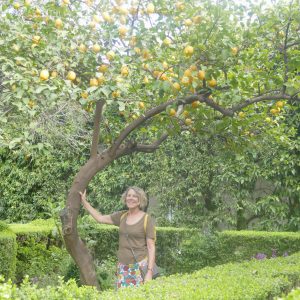 For me, 2020 has begun in Seville with oranges. The book I’m writing (working title The Bitter-Sweet Oranges of Seville) to be published by Quercus Books in March 2021, is set in West Dorset and Seville and features lots of oranges…
For me, 2020 has begun in Seville with oranges. The book I’m writing (working title The Bitter-Sweet Oranges of Seville) to be published by Quercus Books in March 2021, is set in West Dorset and Seville and features lots of oranges…
To research this book, I spent a few glorious weeks in Andalusia visiting – among other places – the Ave Maria Orange Farm where this picture was taken. We were shown around the farm by José who explained how and why the landscape of the Alcor is perfect for growing orange trees and how the growing and the production works. This farm prides itself on its values and its standards – the fruit is organic and the trees lovingly tended – José even plays classical music to the trees and firmly believes that they communicate with each other through their roots. The farm supplies Waitrose with their organic Seville oranges and is the inspiration behind many a marmalade.
Writing about the Ave Maria Orange Farm this week has taken me right back to last March when I first visited the area. And on a dreary January morning in the UK I can’t think of a nicer place to be…
Autumn Reading
Is it still Autumn..? Or has winter crept in already? I suspect the latter but it’s a sunny day and still just about November, so here’s 6 books for late autumn and there will be more reviews to come in the dead of winter. Brrr. Sit by an open fire and enjoy…
The Glittering Hour by Iona Grey
I loved Iona Grey’s debut novel, Letters to the Lost, and once again, with The Glittering Hour, Iona does not disappoint.
The story is written in a dual timeline narrative using the device of letters from Selina to her daughter Alice and a ‘treasure-hunt’ which Alice must follow, as a way in which to switch seamlessly from one time to another (ten years earlier).
Alice has been sent to stay with her cold stern grandparents at Blackwood whilst her parents are abroad, and she misses her mother terribly, though her relationship with her father has always been distant. Her mother’s letters though, bring her some comfort and enable her to explore Blackwood and her mother’s past, while the reader follows first-hand the story of Selina Lennox, one of the renowned ‘Bright Young Things’ of the 1920s, as she meets Lawrence Weston, a struggling young artist.
The book explores the mother and daughter relationship beautifully and evokes the glamour and charm of the 1920s following the losses and pain of the first world war with authenticity. It also shows the reader how pain and grief can lead to bad decision-making which can impact on the rest of one’s life. But at the heart of The Glittering Hour, behind the cocktails and the partying is the vulnerability of a tender and touching love story, beautifully written. Highly recommended.
The Cleaner of Chartres by Sally Vickers
The main narrator of this novel, the quiet, reflective and mysterious Agnès Morel is a foundling raised by nuns, who has spent time in a psychiatric hospital following events in her teenage years and who now in her forties, works as the cathedral’s cleaner. Many people in Chartres have come to appreciate her – the knowledgeable Alain who tells her stories revealed through the architecture and stained glass of the beautiful cathedral, the Abbé Paul who first found Agnes homeless and sheltering in the porch, the artist Robert, the local professor and more. Not everyone however is so well-disposed towards her – most especially Madame Beck who finds out about Agnes’s past through a visit from one of the sisters at the convent and takes pleasure in spreading malicious rumours about her.
Absence and loss dominate Agnès’s life and we learn her history as the past narrative is taken up in sections throughout the present story, interwoven with skill and delicacy. Sally Vickers dwells with love on the descriptive story of Chartres cathedral and has a light but highly observant touch when it comes to the more unpleasant side of human nature. A gentle and thought-provoking novel. Highly recommended.
After the End by Clare Mackintosh
I was inspired to read this book after listening to an interview on BBC Woman’s Hour with the author, about how Clare Mackintosh’s own traumatic life experience led her to write this work of fiction. In her afterword, the author explains why she explored the issues and emotions in the way she did.
Two year-old Dylan, son of Pip and Max is diagnosed with a brain tumour. Even with surgery it cannot be wholly removed, meaning Pip and Max must make an agonising decision – whether to follow hospital advice and let their boy go or whether to fight for his life, knowing that the life that lies ahead for him will be short, painful and hard. This story is about what happens after the couple each make their decision.
The story is told from three viewpoints – that of Pip, Max and the doctor dealing with Dylan’s case. It is a heart-rending and difficult read and the author was undoubtedly brave to undertake it. As well as dealing with the emotions of all concerned, Clare Mackintosh also questions the ability and right of individuals, society and hospitals to make decisions about another life. What will the future bring? We can answer that question at some point in the future but we can’t answer it in present time, because no one knows and yet sometimes we have to make judgements regardless. While I understand why the author chose to structure the second part of the book in the way she has, I found this and the ending confusing and unsatisfying. However, perhaps there was no other way. Whilst I recommend this extremely thought-provoking book, be prepared for an emotional roller-coaster.
The Last Tudor by Philippa Gregory
I enjoy reading Philippa Gregory novels – she is thorough in her research and a great story-teller.
However, the Last Tudor isn’t one of my favourites, perhaps because the three Tudor princesses – Jane Grey and her sisters Katherine and Mary are all imprisoned, which means that so much of the book is written from the viewpoint of ‘a prisoner’ (there are three parts, one for each perspective) and this makes the narrative feel a little repetitive at times. Elizabeth I fascinates me as a character but much of the time her actions are necessarily viewed through hearsay and gossip. This book lacks the colour and life of her court that one might expect of the period, even though the emotions of the women are brilliantly invoked.
Each character though is thoughtfully developed and explored and each character is believable and interesting. The love affairs are reconstructed with passion and emotion and the writing is as excellent as ever.
Perhaps then it is the subject matter that let this story down for me. A Gregory historical is always a great read and I always learn a lot about our history too.
The Perfect Wife by JP Delaney
It’s a source of considerable excitement for me when one of my favourite authors brings out a new book and let me tell you – this one did not disappoint. As fast-paced and hauntingly original as ever… I was gripped from Page 1.
And what a page one. Abbie emerges from what appears to be a coma in what seems to be a hospital bed. But it wasn’t a coma and she isn’t in hospital. Memories are gradually coming back to her and her much-loved husband Tim, a high flying technophobe is by her side. But what happened to her? Did she have a terrible accident? Did she almost die? Well, yes and no. Because this Abbie is actually a sentient A.I, built by Tim to provide a near-living replica of the dead wife he adored. Is this hard for the reader to believe? Well, no – because A. I. Abbie’s viewpoint is used so cleverly within the pages.
However, as with all this author’s books it does become harder as you read on, to know quite what or who to believe, just as it is hard to guess who the ‘other’ narrator might be. Someone else working at Tim’s company? Someone who calls themselves ‘a friend’ who is not a friend? All will become clear eventually. Simply suspend your disbelief, jump in for the ride and you will enjoy every spooky, disturbing, amazing second of this book, just as I did. Highly recommended.
The Truths and Triumphs of Grace Atherton by Anstey Harris
This book is pure joy. I love the writing style and it is very much the ‘up-lit’ type genre to be found in successful books recently published such as ‘Eleanor Oliphant is Completely Fine’ by Gail Honeyman.
Grace Atherton is a musician who is unable to play to an audience due to a trauma she suffered when at music college. Now, aged 40, she is a violin, viola and cello maker living in Kent and playing alone. She lives alone too, though she has a charming boyfriend David who she meets regularly in Paris, a young shop assistant Nadia – also a talented musician but with problems at home – and Mr Williams, a valued customer who has become a friend. When Grace’s world falls apart, it is Nadia and Mr Williams who help her through.
The novel is set in Paris, Italy and Kent. I especially loved the Paris sections; Paris is a character in its own right in this story. The novel is written entirely from Grace’s point of view and the contemporary story is woven in with the story of her trauma in the past and the progression of her relationship with David. Ultimately, it is a novel about facing up to both the past and the truth and about loss and friendship. It is sad but hopeful and brilliantly written. Very highly recommended and marginally my favourite of the Autumn bunch.
Portishead Visit
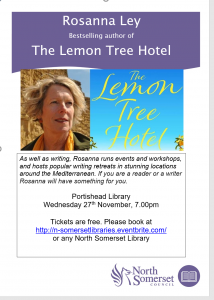 Portishead Library won the recent Reading Agency competition for best summer display of lemony things for The Lemon Tree Hotel and so I am delighted to be paying them a visit on Wednesday 27th November. Tickets are free!
Portishead Library won the recent Reading Agency competition for best summer display of lemony things for The Lemon Tree Hotel and so I am delighted to be paying them a visit on Wednesday 27th November. Tickets are free!
An Italian Supper
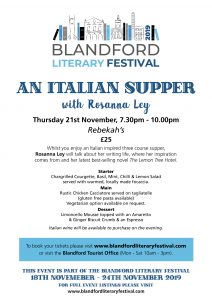 Here’s the delicious menu for our Italian supper in Blandford Forum Thursday 21st November.
Here’s the delicious menu for our Italian supper in Blandford Forum Thursday 21st November.
I will be talking about The Lemon Tree Hotel and answering questions about writing process and research – so there will be lots of bookish chat…
I’m delighted to be part of Blandford’s first literary festival and wish them all the best for many successful events.
Spirit of Place
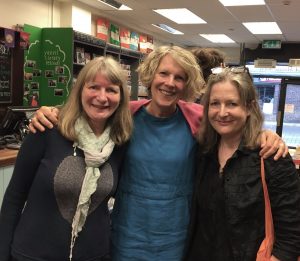
It’s hard to define the ‘spirit of place’ which is the subject up for discussion at Bridport Library on Sunday 3rd November 2019 as part of the Bridport Literary Festival.
The authors who will be discussing the ‘spirit of place’ are myself, Maria Donovan author of ‘The Chicken Soup Murder’ who has just been named First Prize winner of the Bridport Prize in the category of flash fiction and Gail Aldwin author of ‘The String Games.’ Place is an important element for all of us in our writing.
Speaking for myself, I am a keen traveller and my interest in other countries and cultures has led me to write many ‘destination’ novels in which I explore places such as Italy, Spain, Cuba, Burma and Morocco through the eyes of my character(s). This involves a lot of research about the history/ legends/ cultural practices/ people/ politics/ food etc before I even go there to (hopefully) find the true flavour.
I go to these places to walk the same pathways as my characters, to see the place as they would see it, to eat the same food and so on. Once there, I can watch, listen and observe. I can choose more specific venues there – for example, houses in which my characters might live, places in which they might work or walk to; settings in which certain scenes might take place. I can make notes and take photographs and then when I eventually write the scene, I can hopefully get as close as possible to the experience. Ideally, I can write some of my scenes while living in that place too.
Perhaps many of us want change; even to be ‘transported’ somewhere by a piece of writing, to feel that they are living for a brief time in a different world?
Stories come from places and from people; from the landscape and the culture. For me, a place might be my choice because it fits in with a theme I want to explore in a novel (for example in ‘Her Mother’s Secret’ I wanted to write about an island and how islands can be both claustrophobic and also somewhere to escape to – Belle-ile-en-mer off Brittany, France, fitted the bill completely). It can be part of the story already as Burma was for me in ‘Return to Mandalay’ a book in which I explored a fictional version of my late father-in-law’s true life story. Or it can be a place that means a lot to me, in which I want to spend some time (like ‘The Lemon Tree Hotel’). It is more than another character in a novel. It is the setting and creates the mood, the atmosphere, the all-important ‘feel’.
The ‘spirit’ of a place can draw us to visit and to eventually live our lives there. I spent many years visiting and writing about West Dorset before I moved here and made it my home.
But what is it that draws and interests us? Is it the people, the landscape, the pace of life..? Or is it something much harder to define that speaks to our soul and makes us feel that this is truly ‘home?’
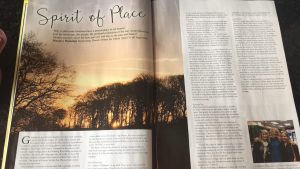
Writing at Finca el Cerrillo – seven reasons for a group leader to host a Writing Holiday
There are plenty of reasons for writers to go on a writing holiday or retreat – some of which can be found here on my Writing Retreats and Events page. But why do full-time working writers (like me) want to host a writing holiday?
You might think the reasons are obvious – especially if you have visited the finca el cerrillo. But the writing holiday to be held here in July 2020 marks ten years of bringing a writing group to Andalusia, and since I love a list, I thought I’d make one.
The seven reasons:
- Going away to write with writers is a mark of intent. I am not going away to research a new novel. I am not going away on holiday or to spend time with a loved one. I am going away to think about writing, to talk about writing, to be with writers and maybe even do some writing myself. Hurrah!
- A Writing Holiday is just what it sounds like. It is for writing. But it is also a holiday – a chance to take a break from the rest of my life. I will work hard all week (honestly) and I will try to do my best for every member of the writing group, to help ensure that everyone has a good time and achieves what they want to achieve. But the writing holiday will also give me space in which to relax and find some me-time, some reflective time, some meditative time.
- This ‘me-space’ comes about because Sue, Gordon, Alison, David and all the team at the finca are brilliant at organising the day to day practicalities. Which leaves me free for the writing stuff. The most we have to worry about is what dishes we may choose from a menu, whether or not we will have a massage or where we will go on our day off. Ha! (Lovely, eh?) All the food is provided, all the transfers organised, taxis are waiting to swish us off to the local restaurants we visit. A smooth-running and established routine combined with a welcoming and friendly atmosphere allows us to relax and to write.
- I love talking about writing! And there’s plenty of opportunity here…
- Other writers are inspiring. I have always enjoyed working with writers in creative writing workshops over the years and the writing holiday groups are no exception.
- I have made good friends and I enjoy meeting up with them here in Andalusia at the writing holiday. There are names on my booking list for July 2020 that were there in 2010, while others have come and gone and sometimes come back again. Each year there are a few new faces and the group evolves and changes in a fascinating and wonderful way!
- The place is both tranquil and inspiring. The finca is a restored 200 year-old farmhouse situated close to the traditional Andalucian villages of Canillas de Albaida and Competa, high in the foothills of the Sierra Almijara, Southern Spain. It has been carefully restored to preserve the charm and character of old Andalucia whilst providing the modern comforts of a small and charming hotel. The rooms are individually styled, spacious and air-conditioned and there are plenty of places inside and out to sit and write or just relax and enjoy the peaceful surroundings. The terraced gardens with carob and palm trees surround both sunny and shaded patios, the Finca has its own olive grove, and the swimming pool and deck areas have stunning views – as you can see from the photos on the web site…
Yeah! So… Tranquillity and inspiration are sometimes hard to find. Because I find them both here, because I love bringing writers to this special place, because I so enjoy getting to know these people and their writing, because the writing holiday gives me the space we all need sometimes, and because I love being a ‘writing tutor’… I shall continue coming here for as long as I possibly can! Oh, and if you ever want to join us, just get in touch.

Summer Reading – 8 books to add to your summer tbr pile
Here we go then – eight books I have enjoyed reading this summer…
A Summer Reunion by Fanny Blake
A warm and uplifting summer holiday read. Four old friends (though their relationship is somewhat more complicated than that…) meet up for a reunion in the holiday home of one of them (Amy). They are all at a turning point in their lives, all for different reasons. Each one of them needs time for reflection and has something they need to address from the past.
By a lucky coincidence (!) the most prominent person from their past happens to also be in Mallorca at the same time, though they barely recognise him at first. This enables three of them at least to give him a piece of their mind and come to terms with some of the past experiences that continue to affect their lives.
Meantime they resurrect their friendship – more or less – and find ways to move on. The women are all in their early sixties, (although they do often seem much younger, but perhaps that’s just me…) and the island of Mallorca sounds heavenly. Read this with a large glass of something suitably fizzy while at the poolside or beach on holiday. It’s escapist fiction that will keep you turning the pages.
Too Close by Natalie Daniels
A much meatier read is this interesting debut by Natalie Daniels, a novel of psychological suspense or domestic noir. This is a fascinating portrayal of a close female friendship – and what can happen when two friends and their families get ‘too close’. In this case the narrator Connie is writing from some sort of mental health facility, so it doesn’t seem to be good news… The friend in question is Ness, whose marriage has recently ended in divorce, leaving both families out of balance with one another. We don’t get to hear Ness’s POV which makes her motivation rather intriguing. But clearly this friendship has been pushed to the limits.
The other narrator is Connie’s psychologist Emma, who, against the odds becomes involved in her life and her story over and above in her professional capacity. Connie, her situation and her razor-sharp perceptions brings all the flaws and problems in Emma’s life to the surface.
Gradually, Connie’s story emerges. We learn what happened to her and her family and why she is where she is. But the question remains – will she be able to find the resources to move on? This is a cleverly written book which had me gripped from start to finish. Highly recommended.
The Botanist’s Daughter by Kayte Nunn
As soon as I read the blurb, I was keen to dip into this dual narrative dual timeline story. I’m a keen plant enthusiast and amateur gardener and I love the botanical paintings in Kew Garden which apparently inspired this story. Elizabeth, a Victorian botanist’s daughter, takes on her father’s dying request to travel to Chile to search for a rare plant that is important for medical research. She loves to paint plants and flowers and is eager for the adventure – but she must beware; her father warns her that there is a dastardly rival at large also searching for the plant in question and he will stop at nothing in order to be the first to find it. Consequently, when Elizabeth travels to Chile she finds rather more than she was bargaining for.
Meanwhile Anna, a gardener in present day Australia, finds a mysterious box hidden in her late grandmother’s cottage. It contains a sketchbook with stunning paintings of plants and a small bag of seeds. Who did the box belong to and can their stories be connected? Well, yes, they can and they are. Anna travels to Cornwall to find out the rest of the story and faces a few of her own demons in the process.
This is a charming read. Both stories are fluently written though I preferred the rather more exotic story of Elizabeth. Richly evocative of place and highly descriptive. I also loved the cover!
Eleanor Oliphant is Completely Fine by Gail Honeyman
I’ve been meaning to read this one for a while and am glad I finally caught up – it has been hugely successful and I can see why.
Eleanor is a self-sufficient introvert who never steps outside her comfort zone and who has complete control of her life. She has worked in the same office for years but hardly ever talks to her colleagues unless absolutely necessary. She does the Telegraph crossword, eats pizza once a week, drinks vodka to get through the weekend and hardly ventures beyond the local Tesco. She has her own view of life and her voice is an extremely witty one. Behind this humour lies the real story – one of a damaged childhood, emotional frailty and huge loneliness and it is this contrast that makes the book both hugely funny and deeply moving.
Things change for Eleanor the day she meets Raymond, a bumbling colleague from IT. An unlikely friendship begins when they find a man, Sammy, collapsed near the office and gradually develops until Eleanor reaches breaking point and confides in Raymond. He – and regular visits to a counsellor – help Eleanor to finally acknowledge and deal with her past and move on.
An excellent read. Highly recommended.
I Am I Am I Am by Maggie O’Farrell
As a fan of Maggie O’Farrell I was really looking forward to this one. It is autobiographical – O’Farrell chronicles 17 of her own ‘near misses’ as in near death experiences (the title is taken from Sylvia Plath’s The Bell Jar). These include a haemorrhage during childbirth, childhood encephalitis, dysentery and having a machete held at her neck in Chile! These episodes are not written chronologically, but offer us glimpses of the author as an adult here, a teenager there, a child later on, and are self-contained essays titled with the body part most at threat in each particular case. Some are dramatic, some are thoughtful, some are life-changing.
I enjoyed reading these – often shocking – shapshots of O’Farrell’s life, though ‘enjoyed’ hardly seems the right word, and it is a fascinating book to dip into as there is no particular thread that links the stories apart from that of truth and near-death (a strong thread when you come to think of it). The beauty for me is in the author’s prose style: sparse, sophisticated and elegant. And I finished reading with huge admiration for her resilience. Anyone who is struggling – whether with a ‘difficult’ baby or with their own physical frailty might well be heartened by reading this book.
Watching You by Lisa Jewell
Lisa Jewell holds another masterclass on how to write a cleverly constructed, twisting and turning thought-provoking domestic noir with what seems like consummate ease.
There are three viewpoint perspectives. Joey, sister of Jack, an eminent surgeon, has recently married lovable hippie Alfie, and the couple have moved into Jack and wife Rebecca’s charming painted house on Melville Heights in Bristol. But Joey cannot settle and pretty soon she becomes hopelessly infatuated with Tom Fitzwilliam, charismatic headmaster of the local comprehensive who lives two doors away. He and his wife Nicola have a son Freddie who has undiagnosed Aspergers and spends most of his time taking pictures of teenage girls. The cast thickens… Freddie and Joey own the first two viewpoints. The third belongs to teenager Jenna – one of Tom’s pupils and one of Freddie’s subjects of mild obsession. Jenna’s mother is convinced that Tom is somehow gang-stalking her and that everyone is mistaken about him – he is not a pillar of the community at all. But is this paranoia, mental illness or simply a case of mistaken identity?
All these complex characters are connected as the story begins and ends with the same grisly murder. But how are they connected? Lisa Jewell will keep you guessing as she weaves her narrative – because she is simply brilliant at what she does.
The Love Child by Rachel Hore
Rachel Hore’s writing is warm and uplifting and her characterisation so fine and detailed that the reader lives their experiences with them and feels their happiness, their loss, their pain.
The Love Child is a story about adoption. Alice is ‘adopted’ by her stepmother and misses the love and easy affection of her late mother. Whilst working as a nurse during the first world war, Alice falls in love, gets pregnant and loses her beloved fiancé to war. Her stepmother is horrified to hear of her pregnancy and insists she has the child adopted. Little Irene grows up similarly with a mother who having later had a natural born son does not fully appreciate or love her.
Can Irene and Alice make a success of their separate lives, will they find happiness and will they ever find one another again? Rachel Hore explores society’s changing attitudes towards women – their career and their chastity – during the 1920s and 30s. Highly recommended.
The Salt Path by Raynor Winn
An inspiring and true story of one couple’s decision to walk the South West Coastal Path. Moth and Ray have made a bad investment that leads to them losing all their money and the home that they have built up from nothing. At the same time, Moth is diagnosed with a debilitating disease that could and should lead to death within a few years. What should they do? What can they do? For some reason even they don’t fully understand, they decide to walk the South West coastal path as backpackers, wild-camping all the way.
The book follows their journey. It includes interesting snippets of information about places they pass on the way and insightful comments about homelessness.. But primarily it’s the story of their emotional and physical journey and how losing everything (material) enabled them to find something even more precious.
By its nature, there is a repetitive feel to this story, an onward slog, and experiences that are similar to those gone before. I also found myself questioning the authenticity of the writing since Raynor wasn’t actually writing this journal whilst walking, but much later. Nonetheless, it is impossible not to be in awe of this couple’s achievement and to admire their spirit of determination. And the integral message of living life in the moment, being kind to people and living for love, is one (or three) that we can all take heed of.
Self-Promotion – how ready are you to shout about it?
The author’s world is a strange one when you come to think about it. We spend most of the year in virtual solitary confinement: researching, planning, writing and revising. And then everything changes. Our book is published (hopefully) and we are expected to shout about it – to everyone. We kind of have to – because who else is going to do it?
Last month, my book, The Lemon Tree Hotel was published in paperback by Quercus Books. It came out alongside: stories I’d written for magazines such as ‘S’ magazine (Sunday Express), My Weekly and Yours; articles about subjects as diverse as my writing journey, creating a sense of place, even the gap year my husband and I went on in our camper-van ten years ago (You magazine for the Sunday Mail).
Then there were the literary festivals, the talks, the workshops, the panels, the library visits, the bookshop signings, the launch event… In short, all the hullabaloo that goes with publication. I had to talk to so many people! I had to smile all the time! And that’s not easy for a writer who’s more used to solitary confinement…
It’s all in the name of publicity of course. Because, with so many books being published each week there’s only a small window of opportunity in which to sell, sell, sell. And don’t even get me on to the demands of social media…
Is it the right way? Is it the only way? Who knows? But if we don’t shout about it then no one’s going to know about it. So my advice is to grit your teeth, try not to sound too amazed/ excited/ smug, spend time supporting other authors and causes too and then go for it.
We all understand. It’s not easy. It goes against the grain (for most of us). Weren’t we taught to be modest and self-deprecating back in the day? Self-promotion is well, being a bit up yourself isn’t it? Er, yes and no. Authors must find the balance where self-promotion is concerned. They have to do it as much as they feel able.
Then afterwards they can sit alone in a dark corner feeling anxious, biting their fingernails and waiting for the sales figures to come in. (And then maybe self-promote some more…)
Featuring The Lemon Tree Hotel
Some of the brilliant media coverage for Lemon Tree – short stories and features galore with plenty of lemons on show…
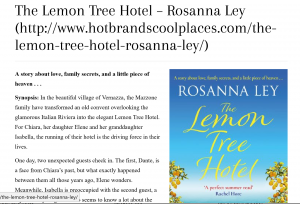
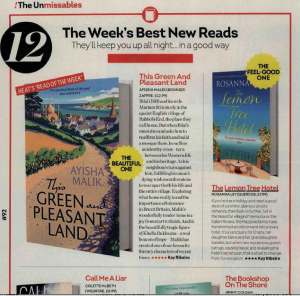
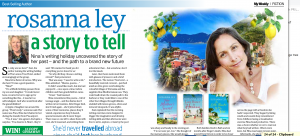
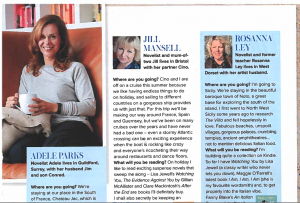
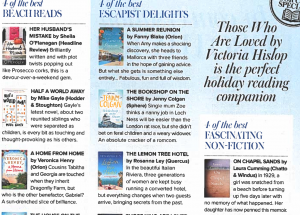
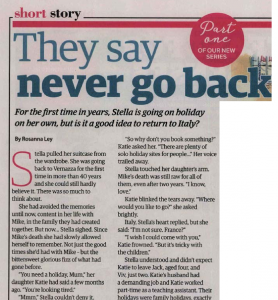
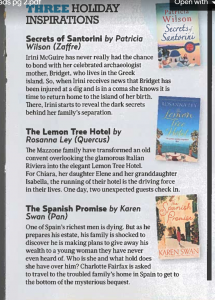
On the Scent of a Storyline
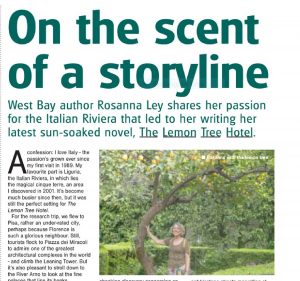 This is the article I wrote for the Dorset Echo and Bridport &Lyme News recently. It’s about the research I did in the Italian Riviera for The Lemon Tree Hotel – all extremely hard work of course… (The lemon tree is holding me upright!)
This is the article I wrote for the Dorset Echo and Bridport &Lyme News recently. It’s about the research I did in the Italian Riviera for The Lemon Tree Hotel – all extremely hard work of course… (The lemon tree is holding me upright!)
Location for The Lemon Tree Hotel
Vernazza is one of the cinque terre villages on the stunning Italian Riviera. I first visited this magical place in 2001. It’s become much busier since then, but it was still the perfect setting for The Lemon Tree Hotel.
These five villages with narrow cobblestone streets and tall skinny houses of dusky pink, ochre and earthy green are built on terraced hillsides where villagers have grown vines and harvested olives for centuries. It’s a tough living, but now a protected environment – they need to ensure they are helped rather than destroyed by tourism.
The Lemon Tree Hotel itself is sadly fictional… I wanted it to be a restored convent set amidst an olive grove – easy, since most of the hillside is one big olive grove – and so we set off on the coastal path to Corniglia (another of the cinque terre villages) find the spot and take photos of the hotel’s potential view. The scent of mountain thyme is in the air, and below the juniper and prickly pears, the Mediterranean sea glitters invitingly. If this hotel really existed, you wouldn’t be able to drag me away.
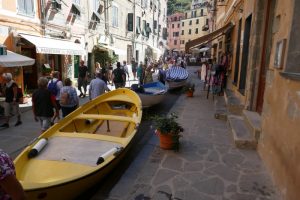 From here, we walk down the steep path through chestnut trees to the clutter of rooftops that is Vernazza. At every twist and turn, we catch a tantalising snatch of the clear blue ocean. Vernazza has a tiny harbour and a rocky bay with a patch of sand where local children play football. The main piazza is harbourside, a glorious square of cobbles, orange parasols and tamarisk trees. Boats, not cars, are parked in the streets.
From here, we walk down the steep path through chestnut trees to the clutter of rooftops that is Vernazza. At every twist and turn, we catch a tantalising snatch of the clear blue ocean. Vernazza has a tiny harbour and a rocky bay with a patch of sand where local children play football. The main piazza is harbourside, a glorious square of cobbles, orange parasols and tamarisk trees. Boats, not cars, are parked in the streets.
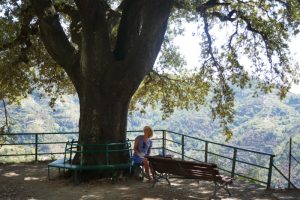 If it’s not too hot, it’s wonderful to hike up to the Sanctuary of Reggio, along an ancient pilgrims’ route dotted with shrines which winds uphill to the church. There’s a sense of tranquillity here that seems to hang in the air amidst the wise olive trees. High above, stands a magnificent spread-eagled oak tree where you can sit and admire the view – or write a scene for a novel maybe?
If it’s not too hot, it’s wonderful to hike up to the Sanctuary of Reggio, along an ancient pilgrims’ route dotted with shrines which winds uphill to the church. There’s a sense of tranquillity here that seems to hang in the air amidst the wise olive trees. High above, stands a magnificent spread-eagled oak tree where you can sit and admire the view – or write a scene for a novel maybe?
Spring Reading 2019
It’s been a lovely spring so far with lots of fabulous reading as ever. Here are a few of my favourites:
Bitter Orange by Clare Fuller
Ill and dying, Frances Jellico is looking back on her life – particularly to an eventful summer in 1969. Having been her mother’s carer for some years, after her death, Frances goes to live at a run-down manor house (Lyntons) to provide a detailed report on the architecture there for the American owner. But she is not alone. At Lyntons, she meets an intriguing and bohemian couple, Cara and Peter; the man tasked by the buyer with evaluating the contents of the estate. Frances is awkward, naïve and totally bowled over by the two of them throughout this long, hot summer. This may be a chance for her to release the tyranny of her life with her mother and let go at last. But Cara and Peter’s relationship is complicated and as Frances is drawn into their circle, her relationship with each of them becomes equally so. Meanwhile, she also becomes friendly with the local vicar who intriguingly is also there at her bedside as she reflects on the past and what she has become.
The story is told from the point of view of Frances and explores issues of loneliness and belonging. But can Frances really belong in Cara and Peter’s world in 1969? Perhaps not. The book is character driven and Fuller draws some fascinating portraits that leap off the page. The plot has some twists and turns as all is gradually revealed but it is a book to savour. It is sometimes unsettling, always thought-provoking and stayed with me long after I had finished reading.
Believe Me by JP Delaney
Who to believe? This is another fascinating story by one of my favourite authors exploring the world of acting and make-believe. What is real? What is pretence? What is imagined? Most of the time in this book, it is impossible to know.
Claire Wright is training to be an actor in New York but her lack of a green card has forced her into the rather more unorthodox job of catching out husbands who have the intention of being unfaithful to their wives. She is very good at this – mainly because of her immersive acting skill. But things get a bit more complicated when there is a murder – and since she has done a job for the victim, Claire is one of the suspects. But her name must have been cleared – why else would she be trained to work undercover in order for the police to find out the truth?
Also under suspicion is the victim’s husband – the one ‘good guy’ who didn’t fall into Claire’s honey-trap. But is he a good guy – or not? And is Claire telling the reader the truth – or not? Fortunately, after a roller-coaster drama which is emotionally gripping and will certainly keep you guessing, we do find out. Highly recommended.
I Let you In by Lucy Clarke
If you are thinking about renting out your house on Air B & B, probably best not to read this one – or maybe you should… Lucy Clarke’s latest novel is psychological suspense at its best – I defy you not to feel chilled.
Elle Fielding’s first novel was a runaway success and the proceeds have helped her to turn a little cottage on a cliff in Cornwall into a light, airy and beautiful house with far-reaching views over the Cornish countryside and sea. It has the advantage of being close to her sister Fiona and her family and Elle should be loving it. But her life is not quite as easy and magical as it seems. She is struggling with her second novel and she has run out of money, while still owing the bank and the builders. What should she do? Well, she decides to rent out aforementioned dream home on Air b&b in order to earn some much-needed cash while she is away on a writing retreat. When she comes back however, she feels that her house has not only been entered, but somehow violated…
Whoever has got into the house then proceeds to try and get into Elle’s head – while she desperately tries to meet her writing deadline against all the odds. No spoilers here – but the plot twists and turns very satisfyingly until the final and shocking denouement. The characters are all three-dimensional and interesting, the setting is wonderful and the tension never lets up. I loved it. Highly recommended for all psychological suspense fans.
The Missing Sister by Dinah Jefferies
Belle Hatton is working as a nightclub singer in 1930s Burma, and determined to find out what happened to the sister she has only recently found out she had. Why was she never told about the existence of Elvira and who was responsible for her disappearance? But when Belle starts asking questions, she is confronted with unsettling rumours, malicious gossip, and outright threats. She is drawn to Oliver, an attractive, American journalist, but can she trust him?
Dinah Jefferies captures the atmosphere and culture of 1930s Burma with her usual consummate ease. And especially the different layers of colonialism – the country may be vibrant, colourful and exotic, but behind the glamour there is a much darker side…
An interesting aspect of the story is the author’s exploration of family relationships – especially Belle’s well-established view of her mother – what she has been told, what she has experienced and how these ‘truths’ contradict the reality we seem to be given in the other narrative – her mother’s story of the previous decades. So what is the truth and whose memories are the accurate ones? The blurred lines are well handled here – family relationships are generally complicated!
As always, Dinah Jefferies draws her reader into her story with fluency and a natural and authentic voice. Atmospheric and evocative – a hugely enjoyable read.
The Fear by CL Taylor
This story deals with some dark issues – in particular the subject of grooming and how traumatic this can be for the victims of such a crime. And the victims are not just the obvious ones – there are family victims too on both sides.
Lou Wandsworth, the initial narrator, looks back to this time in her life (in one strand of the story) when she was fourteen and went to France with her karate teacher Mike Hughes, thinking it was just for a romantic weekend and convinced he was the love of her life. But Mike wasn’t what he seemed and he left her psychologically traumatised. Since then, Lou has been unable to trust or maintain a relationship with a man.
We also have the contemporary time narrative when at 32, Lou discovers that Mike is once again involved with a teenager. Determined to prevent him from ruining another young girl’s life, Lou confronts him – with surprising consequences.
CL Taylor brings plenty of twists into this story and broadens and deepens the tale by including the viewpoint of the other young girl, Chloe, and another narrator, Wendy, who is also a victim. It’s perfectly paced and another chilling, compelling read from this author.
And Then It Happened by Linda Green
This was another one I couldn’t put down. It starts off in quite an ordinary way – Mel is married to Adam, they have one daughter and they are one very happy family. But Linda Green manages to make this quite chilling – the reader is waiting for something to happen (which is why this is such a good title). Mel is convinced that something so good can’t last forever (why would she though?) and of course she is right. When it does… Everything changes.
Mel is also given a ‘dark secret’ which helps build the tension, but when the secret was revealed, it was a bit of an anti-climax for me.
This one is so hard to write about without giving any spoilers. I found Mel a little annoying at first but as the book developed, my feelings changed. Adam’s narrative is that of two people (which will make sense when you read the book) and each one is convincing.
Linda Green has used her imagination a lot in this story – but clearly, this is based on significant research. Is this how it would be? Well, maybe so. Although the pace of the story can be a little slow at times, this is no problem for me – I enjoyed having the time to get to grips with the characters’ lives and emotions.
An emotional, gripping and thought provoking read.
March Madness
 March madness for me has included revisions on next year’s new publication – this now has a name – hurrah! From Venice With Love…
March madness for me has included revisions on next year’s new publication – this now has a name – hurrah! From Venice With Love…
It has involved writing some articles and short stories – most of these will be published in June to cleverly coincide with the paperback edition of The Lemon Tree Hotel, but one exception was a 4 page spread in YOU magazine in Mail on Sunday a couple of weekends ago about a fifties gap year in a camper-van that I took with my husband Grey (who wasn’t my husband then, so it wasn’t all bad). It just shows that everything can be material – even 10 years later! And it surprised me how much I enjoyed re-visiting this experience 🙂
But my main March mission was researching for a new book… The book is going to be set in Seville, I’ve worked out a storyline but I haven’t started writing it yet (see above ;)). So, we went to Seville to visit the city – which is beautiful – to a nearby organic orange farm called Huerta Ave Maria, to Cordoba, Cadiz, Mazagon and Donana national Park. Yes, it was pretty full on. And HOT, let me tell you.
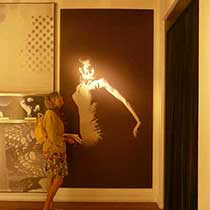 My main character Holly will be buying organic oranges from the lovely people at the Farm and importing them to Dorset where she will be using them to make Seville Orange marmalade. She will also be buying in neroli fragrances and soaps (fun research!) and orange wine (even more fun research). There are over 40,000 bitter orange trees in Seville and right now many of them are out in flower. The scent is heavenly.
My main character Holly will be buying organic oranges from the lovely people at the Farm and importing them to Dorset where she will be using them to make Seville Orange marmalade. She will also be buying in neroli fragrances and soaps (fun research!) and orange wine (even more fun research). There are over 40,000 bitter orange trees in Seville and right now many of them are out in flower. The scent is heavenly.
I hope I’ll be able to get some of that heavenly scent into my book when I come to write it. Working title: The Bitter Oranges of Seville.
Head down then…
The Books I Read this Winter (so far…)
I have clearly been far too busy reading and writing to keep up with this blog… (!) So with all this talk of Christmas going on, it seems only fair to share some of the latest reading goodies devoured here during the past few months.
I have clearly been far too busy reading and writing to keep up with this blog… (!) So with all this talk of Christmas going on, it seems only fair to share some of the latest reading goodies devoured here during the past few months.
Starlight on Palace Pier by Tracy Corbett
Tracy’s latest novel is set in Brighton, close to my old stomping ground and this vibrant city certainly comes to life in ‘Starlight’.
After an injury de-rails her dream of becoming a professional dancer, Becca Roberts heads home to Brighton in search of a fresh start and finds herself the position of dance teacher at the run-down and crumbling Starlight Playhouse. On the plus side, her cousin Jodie has recently obtained a managerial post so they can work together, on the minus side (apart from the condition of the place and the sad lack of clients) the playhouse is owned by the mother of her old flame Tom. He won’t be around because he is a London lawyer and high flier… Or will he? It seems that Becca underestimated the challenges that she will have to face at the Starlight Playhouse.
Add in some slapstick and a thought-provoking subject or two, some irrepressible characters and the fact that the course of true love will never run smooth and there you have it. This is another hugely enjoyable read from Tracy Corbett. In Tracy’s books you can guarantee a healthy dose of humour and escapism. The characters are warm and funny, the dialogue sparkles and you know that romance is never far away. This novel is heart-warming and inspiring – a perfect antidote to a rainy day.
When I Find You by Emma Curtis
An unusual premis for this one, which was rather far-fetched at times – but equally refreshing and original.
Laura Macguire works in advertising and suffers from ‘face-blindness’ (prosopagnosia). She has strategies for coping with this condition at work and in her private life, but it also leads to difficult situations – none worse than when she leaves the office Christmas party with the wrong man, spends the night with him and in the morning after he has left has no idea of his identity.
So begins a complex domestic noir which explores the issues of sexual consent and human identity. Although I said: “Really?” to the novel/author on more than one occasion, it never failed to be totally gripping. Laura’s quest to find out who tricked and therefore raped her holds the story together, but a sub-plot cleverly interweaves with this until the two stories merge. I confess that I guessed both twists but I still think they were cleverly done and it didn’t spoil my enjoyment of this excellent novel.
Temptation to be Happy by Lorenzo Marone
I loved this. The narrator is 72 year-old Cesare Annunziata who considers himself a sociopath and who lives alone in an apartment block in Naples. His adult children Sveva (fierce and unhappily married) and his son Dante (gay and runs an art gallery) live nearby and he has several neighbours with whom he interacts, including The Cat Lady who lives opposite and a young couple nearby. He also has a ‘lady friend’ Rossana, who is a prostitute. The story centres around these (often hilarious) interactions and Cesare’s regrets and observations on his life to date.
Added to this mix of wit, philosophy and wistfulness is another darker story. Cesare discovers that his neighbour Emma is being physically abused by her violent husband. Cesare must break all the rules of a lifetime of not interfering or getting involved with other peoples’ lives in order to help her. But will this be enough? And what about his children and grandson? Can he break down the barriers to which he has always adhered and become close to them at last?
Lorenzo Marone shows us in this novel that it is never to late to heal our relationships with our nearest and dearest and that we should do all we can to be happy. Highly recommended.
He Said/She Said by Erin Kelly
Definitely my kind of book, this is a slow building psychological thriller with some excellent twists and turns. Reading a few reviews, I’m surprised that so many people don’t enjoy the alternating point of view – I really like this narrative device and find it gives me much more of an overall feel of the world being written about, as well as adding intrigue and variety.
On to the book. The text is divided up into parts that correlate to the stages of a total eclipse of the sun. I suppose this acts as a metaphor and the information given was vaguely interesting, but for me it served only to develop the character of Kit. In the end it explains a lot. In 1999, Kit and girlfriend Laura attend an eclipse festival in Cornwall where Laura witnesses a rape. She goes on to befriend the victim, Beth. After testifying at Beth’s trial, Laura and Kit think that it is all over. However, Beth won’t leave them alone. She finds out where they live and stays with them for a while, thoroughly insinuating herself into their lives and making them question whether she was a victim at all. To escape from Beth and the rapist who also seems to be pursuing them, Kit and Laura go off grid, even changing their names in an effort to escape the past.
But of course, you never can (at least in fiction). And as always there is more to the past than we were led to believe. The twist – when it eventually comes – is thoroughly convincing, although also rather depressing. I really enjoyed this book and couldn’t put it down – the slow-burning tension is palpable. It’s clever – but not nice.
Without a Word by Kate McQuaile
The story begins well and at a fast pace. Orla and Lillian are chatting on Skype, the doorbell goes, Lillian goes to answer it… and never comes back. It’s a great set up for what is to come, is original and presents the mystery that dominates the story. What happened to Lillian – and is she alive or dead?
Fast forward 10 years and Ned the original detective is re-opening the investigation following a spate of poison pen letters. There is a lot of information about his personal life given – presumably to set up a sub-plot of his relationship with his ex-wife and kids – but this felt a bit overdone to me. Ned just wasn’t interesting enough to warrant so much space. However, the main mystery continues to hold the interest although the characters do seem to behave rather strangely at times.
I really enjoyed McQualie’s writing style which was fluent, readable and nicely conversational. And the tension remained at a good simmer. But unfortunately, I did guess the twists – mainly because there were so few alternatives on offer and other characters’ actions gave too many clues away. Nevertheless, I would still recommend this book and will be reading more by this talented author.
The Rest of Me by Katie Marsh
This is my first Katie Marsh read and I found it totally immersing. She is very good at writing about emotions and family life, and what the novel lacks in plot and twists it certainly makes up for in emotional content.
The main narrator is Alex – mother of Jenna and Izzy and wife of Sam. The story opens with Alex donating a kidney to Sam but this incredible act turns out to have consequences she never dreamed of. Instead of bringing them closer together, the family seem to be drifting further apart. Alex’s recovery is slow and painful and she finds that she can no longer be the controlled and organised ‘Supermum’ that she has always been up to this point. Moreover, the current situation is bringing back painful ghosts from the past that she has never fully acknowledged. It is difficult to witness this family unravelling. Problems pile on top of one another and it seems to be harder than ever for them to reach out to each other and tell the truth about how they feel.
The family relationships and characters are very well drawn in this book and the issues feel recognisable and authentic. Izzy’s voice is convincing – her passion for football, her love for her family, her desperation when things go wrong – all these are handled with great sensitivity. The novel is well-written and – eventually – uplifting. Put simply, it just feels so real…
Fatal Inheritance by Rachel Rhys
Ah. This is definitely my kind of story. I was drawn in by recommendations and by that fab cover – so decadent, so alluring… The main character is Eve, married to dull Clifford, trapped in a loveless marriage post-war living a pretty much joyless life where everything (including love) is still rationed. Enter a mysterious letter… Eve has an inheritance and she must go to the South of France to discover the nature of it and the reasons behind it.
This mystery holds the story together well, particularly because it avoids the predictable and the obvious. But the main joy of the book for me was the character of Eve and how she responds when she is thrown into an entirely different life on the French Riviera; a life of pleasure-seeking, sunshine and glamour which is a million miles away from her own experience in England. There is a sense of her becoming her own person at last as she expands her horizons and learns some important lessons about the present and the past – both of which impact on her future.
The setting is well-drawn and seductive. Eve is a character with whom it is easy to empathise and the other characters that populate the novel are nothing less than fascinating. Rachel Rhys’s writing style is fluent and engaging and the book is compelling. I loved it. Highly recommended.
The Books I Read this Summer…
What books did you enjoy reading over this lovely summer? Here is my list:
The Almost Wife by Jade Beer
I was lucky enough to have a preview of this heart-warming story back in the spring and I really enjoyed it. It’s all about the weddings of three brides to be – Jessie, Emily and Dolly – and also Helen, the owner of the bridal boutique from whom they are all getting the dresses of their dreams. So far, so romantic… But the title gives you a clue of the emotional content of this novel and the fact that the book holds a few surprises. One young woman does make it up the aisle – but learns an important lesson along the way – one doesn’t make it at all and one becomes an ‘almost-wife’ – you’ll have to read the book to find out why…
I’ve heard that the latest bookselling trend is towards uplifting novels with humour and heart and if so, this novel fits the bill. It is written with great fluency, warmth and good pace; the characters are well drawn and their voices are convincing. This story has plenty of fizz and sparkle – it will draw you in and keep you hooked. It will appeal to those who love fashion and glamour and romance, but it is thought-provoking too. Behind every wedding-dress is a personal story. And as the shout-line says: Sometimes, love just isn’t enough.
The Cliff House by Amanda Jennings
This story – most of which takes place in 1986 – is crammed with suspense and drama. It concerns two families who couldn’t be more different. On the one hand, we have a Cornish, working-class family struggling to make ends meet – the mother Angie, Granfer and Angie’s two teenagers Tamsyn and Jago. Their father Rob, a volunteer for the RNLA, tragically dies at sea while performing a rescue. This loss has affected the family deeply. Jago feels crushingly aware that he has not fulfilled his promise to look after his mother and sister, Angie is desperately lonely as she struggles to cope and Tamsyn has become obsessed with the Cliff House – the place she used to visit in secret with her father.
The other family are the Davenports from Holland Park, for whom the Cliff House is a holiday retreat. Tamsyn likes to spy on them. They are wealthy, stylish and appear to have it all. But naturally they are not as perfect as they seem. Max is a parent who shuts himself up in his study to write rather than deal with his family’s issues, his wife Eleanor is deeply troubled and alcohol dependent and their daughter Edie is rebellious, bored, disillusioned and vulnerable. Tamsyn befriends Edie, her mother works at the Cliff House as a cleaner and pretty soon the two families are enmeshed in a compelling drama. The story of 1986 is framed by an initially obscure present-day timeline which ultimately reveals what happened next.
I loved the descriptions of the Cornish coastline – the author’s passion for this landscape shines through. The relationships are subtly developed, the characters well-drawn and every voice (the story is told from the viewpoints of Tamsyn, Edie, Jago and Angie) is individual and convincing. Best of all is the unrelenting drama of the storyline – the pace is fast, the tension palpable. The Cliff House is a gripping read. Highly recommended.
Darling Blue by Tracy Rees
When you start reading a Tracy Rees novel you know you are going to be wrapped in warmth and come out smiling the other side! It is like the best kind of comforting hug – delicious to all the senses… So it is with Darling Blue.
The story takes place in the glorious 1920s – one of my favourite periods – and the Camberwell family are fortunate enough to live in a ritzy house in Richmond. There are no money worries. What’s more they all love one another – so what could possibly go wrong..?
At Blue Camberwell’s twenty-first birthday party the troubles begin when her father Kenneth rashly offers her hand in marriage to whoever can capture his daughter’s imagination in a letter. Blue is outraged. What century is her father living in? She is a thoroughly modern young woman with ambitions to be a writer – she has neither the time nor the inclination for romance. Or does she?
Meanwhile, we discover that another member of the family is deeply troubled by a tragedy that has occurred. What could it be? Can she recover from the trauma – or will it somehow once more rear its head and rip this perfect family apart?
Enter Delphine, a young woman of a quite different class who is trying to escape her violent husband. The family take her in (of course) but it may not be possible for Delphine to escape her past quite so easily.
I loved this book. Tracy Rees writes with such a natural fluency and this story is full of warm and wonderful characters who will stay in her readers’ hearts. Darling Blue has a charming fairy-tale quality – it is magical and yet it deals with subjects and troubles of the real world. Delightful!
The Man I Think I Know by Mike Gayle
This story is about what you find when you think you have lost everything – and it turns out to be quite a lot. It is also about second chances and friendship. James and Danny are from very different backgrounds but they are both very clever, both have attended one of the most prestigious schools in the UK and both were up for the biggest prize of all – though only one of them can win it… This is the point at which the prologue begins and ends.
We cut to James and then Danny – the book is written in dual viewpoint – at a later point in their lives. One has suffered ABI – acquired brain injury and is very different from the young man he once was, the other has suffered a deep personal tragedy. Against the odds, they become friends and this book is about that friendship.
Mike Gayle is expert at writing about relationships – and he writes about male friendship with his usual skill and sense of authenticity. His writing is full of humour with a conversational and accessible style, but the content is powerful and moving. Writing about a character with ABI could have become mushy but there’s no chance of that. Gayle must have done some good research – because this character is completely convincing and his life and problems are both detailed and insightful.
If you are looking for a book that is realistic and bitter-sweet, uplifting, romantic and poignant, look no further. Highly recommended.
Our house by Louise Candlish
Louise Candlish is one of my favourite authors and I’m delighted to say that ‘Our House’ is another joy. The house in question is special. But who does it actually belong to?
Fi Lawson lives in a desirable suburb of London with her two sons. She and her husband Bram have come to a co-parenting agreement which means that they continue to share the house and also a nearby flat when the other parent is in residence with the boys. This modern arrangement seems to be working out – until Fi comes home one day to find someone else moving into her home. It could be anyone’s worst nightmare. Her own things (and those of her family) have disappeared and the couple moving in are filling the house with their own possessions. What’s going on? Is this for real? Is it a crime? Or is she just going crazy?
All these things and more go through her head and provide the narrative tension that propels the story forward. It’s a wonderful premis. The plot gradually unfolds via a document written by Bram – wherever he may be – presented in parallel with Fi’s own ‘story’ of being a victim of house fraud. I didn’t much like either of the main characters and Fi’s new romance always felt rather staged and unreal, but this didn’t matter as there were so many twists and turns in the story I didn’t have time to worry about it. Well-written and as impossible to put down as any of Louise Candlish’s novels, the story fizzes with psychological drama and intrigue – right up to the final and shocking denouement. Highly recommended.
What Lies Within by Annabelle Thorpe
Annabelle Thorpe’s second novel is set in Marrakech and she captures the colours, scents, flavours and moods of Morocco brilliantly in this story of ex-pats making a new life in what is almost another world.
It’s not just a question of culture shock. Freya, Paul and Hamad are three close friends who met in Cambridge. It matters not that Hamad’s wealthy lifestyle is so different from theirs. Their friendship goes much deeper – or so they all thought.
Hamad comes up with a plan designed to delight his stylish French girlfriend Racine, whilst simultaneously helping Paul and Freya get their marriage back on track. He purchases three neighbouring houses that form a run down but glorious riad owned by an old and important Moroccan family, impervious to the bad feeling this will create in the community. He presents these to Racine. Paul will be the architect for the new project while Freya will write a biography of Hamad’s eccentric grandmother Dame Edith who also lives in the city.
But things do not turn out quite as he expected. Paul and Freya’s marriage – already fragile – seems to be in a worse state than ever, while the spirits of the riad (jinns) are increasingly unhappy about what is going on within. Someone has a secret. Someone is lying. Someone is being betrayed.
The story is fast-paced with a good balance of description and action. The characters are flawed and authentic. Morocco is depicted as it is – a maze of unknown pathways to be negotiated, a feast to delight the senses, a land of kindness, fascination, deception and intrigue. Holiday noir indeed. Highly recommended.
Gentlemen and Players by Joanne Harris
It is not her most recent novel, but Gentlemen and Players is very cleverly structured and is a good example of why Joanne Harris is one of our most successful novelists writing today.
The story is set in and around a traditional boys’ public school where Latin is still taught by a master wearing a dusty black gown whose authority is unchallenged. The master in question is Roy Straitley, who provides one of the two narrative voices in the book. St Oswald’s is his life. His study at home is crammed with framed photographs of ‘his boys’ over the years and he is simply unable to imagine his life at the school ever coming to an end. But he is coming up to retirement age and changes are on their way. With the beginning of a new school year comes an extended Modern Languages Department which threatens to take over Straitley’s domain, a new head and some new teachers – one of whom is determined to destroy St Oswald’s.
This mystery character provides the other viewpoint of the novel. Through a child’s eyes we see a past where St Oswald’s was forbidden and yet highly desirable territory. We see the development of an obsession. We see a youthful tragedy and we hear the story of what happened next – with plenty of surprises along the way. But who will win this battle – which Harris describes and structures like a game of chess? Who will triumph? You will have to read this fascinating novel to find out.
Thursday 31st August 2023
The Forever Garden is finally out in paperback this coming Thursday 31st August. Hurrah! You can buy it in many different supermarkets, in WHS, or order it from your local bookshop. I am happy to say it has 4.5 * on Amazon and I’d like to thank everyone for all their support so far.Thursday July 11th 2024
Literary Lunch at The West Cliff Hotel Bournemouth 12.30 p.m. – £25 – contact the hotel for more details and to buy a ticket: 01202 751000. I will be talking to Darren Northeast and reading from The Forever Garden.Thursday 22nd July 2021
Zoom event with Rutland Libraries 2.30 p.m. More details to follow.Thursday 24th June 2021
Paperback publication day for ‘The Orange Grove’. YAY.Tuesday 15th June 7 p.m.
I will be talking with Laura James about lots of writing topics including the writing of ‘The Orange Grove’ at Sturminster Newton Festival. This is a free event, but you can book your tickets here: https://www.eventbrite.co.uk/e/rosanna-ley-in-conversation-with-laura-e-james-tickets-156538650317Tuesday 22nd June 2021
Zoom event with Kim known as @KimTheBookworm (Twitter tag) to celebrate the paperback publication of ‘The Orange Grove’. More details to follow…Monday 19th April 2021
Lovely article published by Fiona Govan in The Olive Press about the writing of The Orange Grove; see here: https://www.theolivepress.es/spain-news/2021/04/18/orange-blossom-flamenco-and-a-passion-for-ceramics-how-one-british-author-fell-in-love-with-sevilla/Thursday 4th March 2021
At home: I will be celebrating the publication of the hardback version of my new book The Orange Grove set in sunny Seville…Tuesday 17th March 2020
The spring events are kicking off with a visit to Portishead Library in North Somerset . Tickets are free, the event starts at 7 p.m. and I will be chatting about The Lemon Tree Hotel, my new book From Venice with Love and other writerly things… https://www.eventbrite.co.uk/e/author-rosanna-ley-at-portishead-library-tickets-91114819879Wednesday November 27th 2019
I shall be visiting Portishead Library who won a recent competition of ‘best display’ of Rosanna Ley Books in the summer featuring The Lemon Tree Hotel. Congratulations to Portishead and I’m looking forward to meeting you all. Tickets and info here: https://www.eventbrite.com/e/rosanna-ley-visits-portishead-library-tickets-77495052789November 21st 2019
I will be hosting a 3 course Italian Supper at Blandford Forum Literary Festival on Thursday 21st November at Rebekah’s 7.30 – 10.00 p.m. Come long to hear more about my writing process, research, inspiration and lots more – plus delicious Italian food… £25 tickets available from: http://www.blandfordliteraryfestival.com or from the Blandford Tourist Office (Mon – Sat 10am – 3pm).Sunday 3rd November 2019 @ 3.00 pm
Bridport Library, South Street. DT6 3NY. Happy to be taking part in the Bridport Literary Festival in a panel session with Maria Donovan and Gail Aldwin entitled ‘Spirit of Place’ https://bit.ly/2Z39t07June 2019
Local independent bookshops have signed copies of The Lemon Tree Hotel with bookmarks (!) I have visited the Totnes Bookshop and will be at Archway Bookshop, Axminster Tuesday 25th June at 3 p.m. Copies also available at Serendip, Lyme Regis; Winston’s in Sidmouth and Waterstone’s Yeovil from 20th June. For Bridport, watch this space…Saturday 10th August 2019:
Weymouth Library event 11.00 a.m. – more details laterFriday 26th July 2019:
I will be at Harefield Library with Erica James – come along for writing chat, tea & cake! Contact Lara Marshall for more details: lmarshall2@hillingdon.gov.ukSaturday 20th July:
2 p.m. Event at Westbourne Library. More details tbcThursday 20th June 7 p.m.:
Launch of The Lemon Tree Hotel at Waterstones Yeovil, 37A Middle Street, BA20 1LG. If you are within reach of Yeovil, you are very welcome to come along but please RSVP me by email: rosannaley@gmail.com.Saturday 15th June 2019
I will be at Sturminster Newton Literary Festival chatting to Laura James about writerly things in The Bow Room at The Exchange 2 p.m. There are lots of interesting events going on, and most of the daytime events are free. See: https://bit.ly/2JKxstM and https://sturlitfest.com/Thursday 13th June 2019
The Lemon Tree Hotel comes out in paperback!Thursday 9th May 2019
I will be speaking at Bournemouth Literary Lunch. Exciting…July 9-16th 2019
Due to a cancellation there is now a place available on the Writing Holiday taking place in Andalusia July 9-16th 2019 – see events page for more details or contact me if you think this place could be yours…Saturday April 27th 2019
I’ve been doing some writing workshops in West Dorset at the kind invitation of Dorset Writers Network. The next one is on Saturday April 27th 2019 10-1 in Blandford Forum. More details to come or contact Dorset Writers Network for more information http://www.dorsetwritersnetwork.co.ukBreaking news…
Breaking news… My new book The Lemon Tree Hotel set in the glorious Cinque Terre region on the Italian Riviera comes out in hardback in March 2019. Exciting! More details to follow…Wednesday 9th May
Summer Adventure event at Hillingdon Libraries on Wednesday 9th May 7.30 pm – 9 pm. at Winston Churchill Theatre, Pinn Way, HA4 7QL Ruislip with me and Jo Thomas. There will be pink gin, books and plenty of fun as we plan our next holidays….. This is a freee event! Book at your local library, call 01895 558184 or email culturebite@hillingdon.gov.uk
